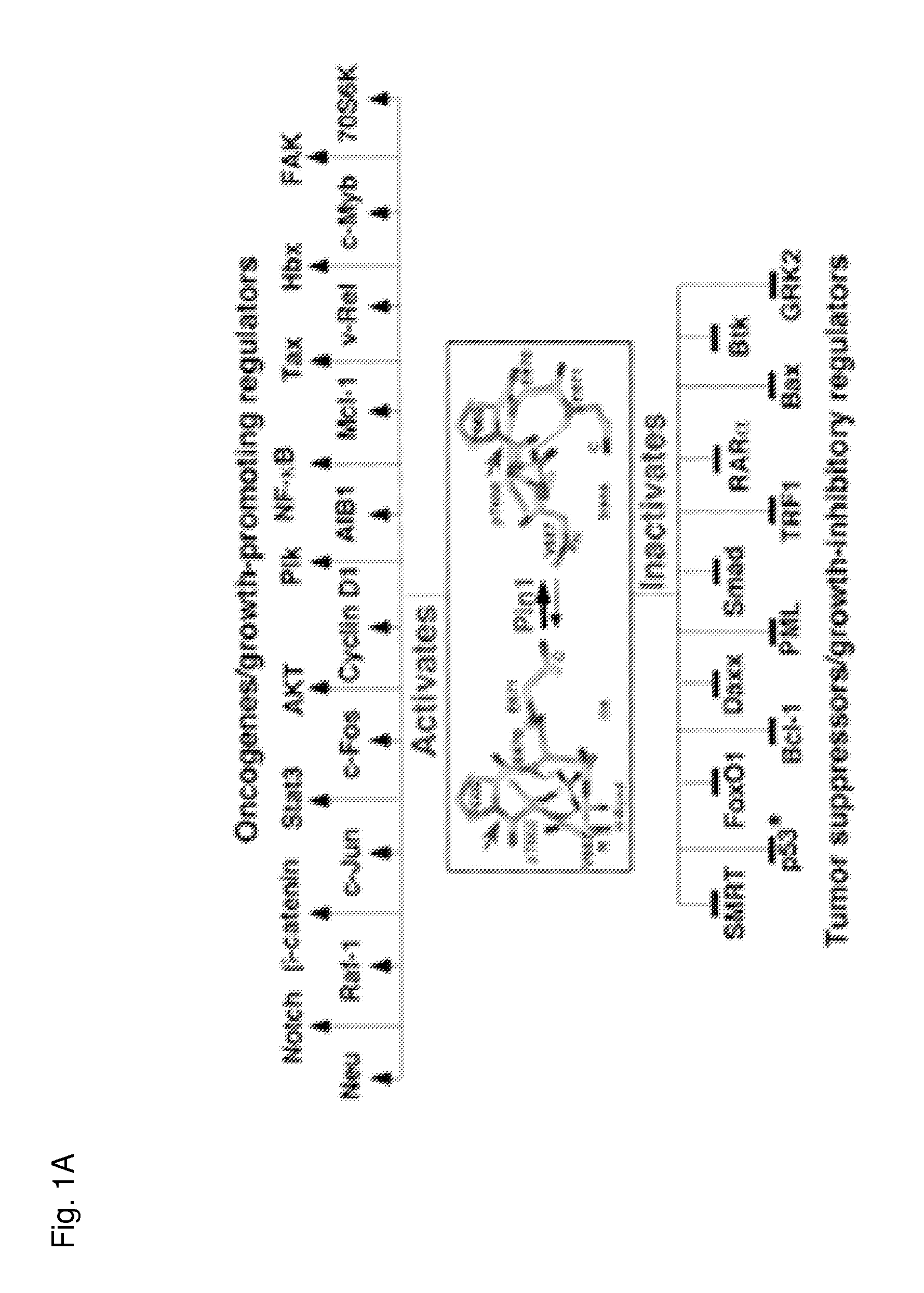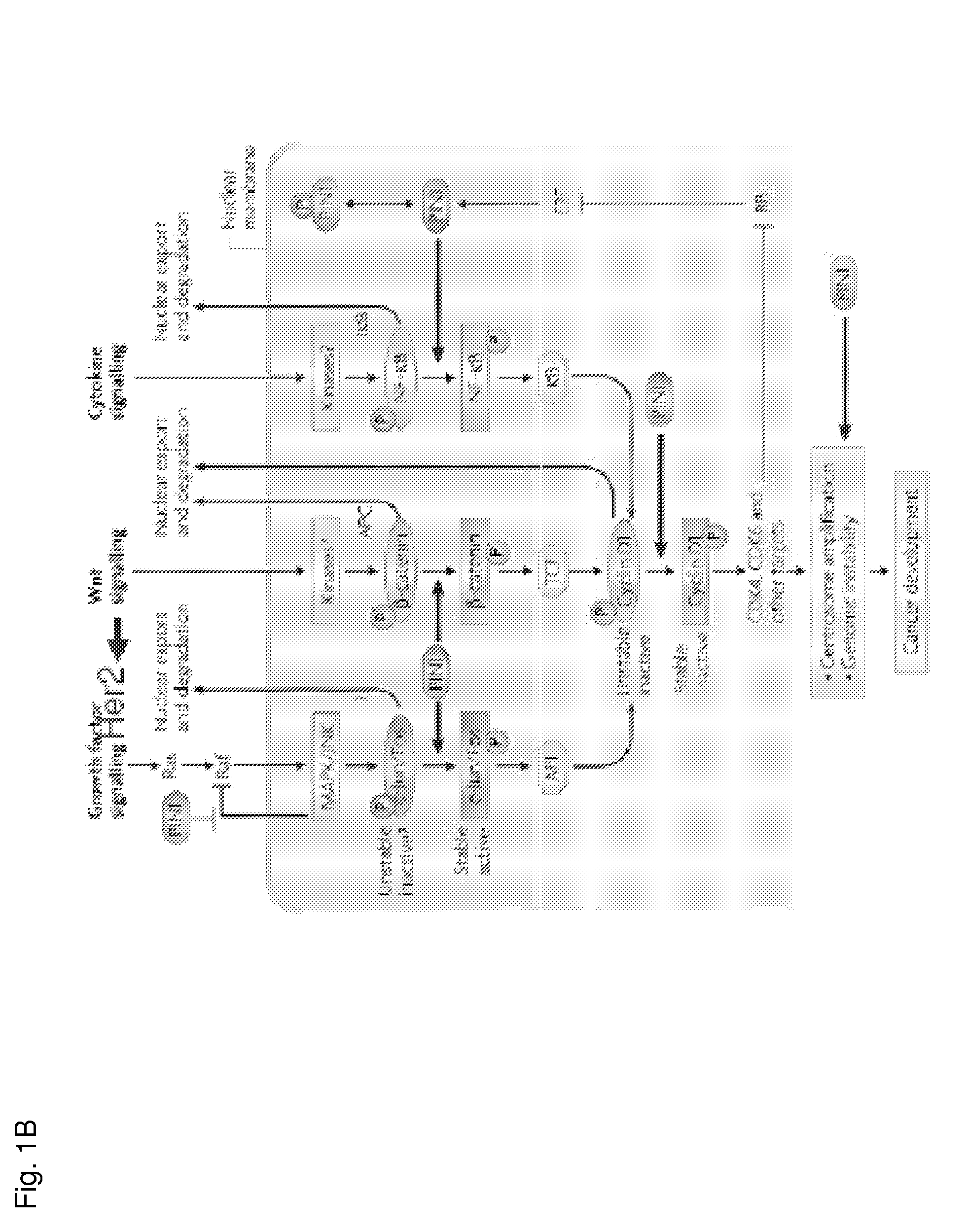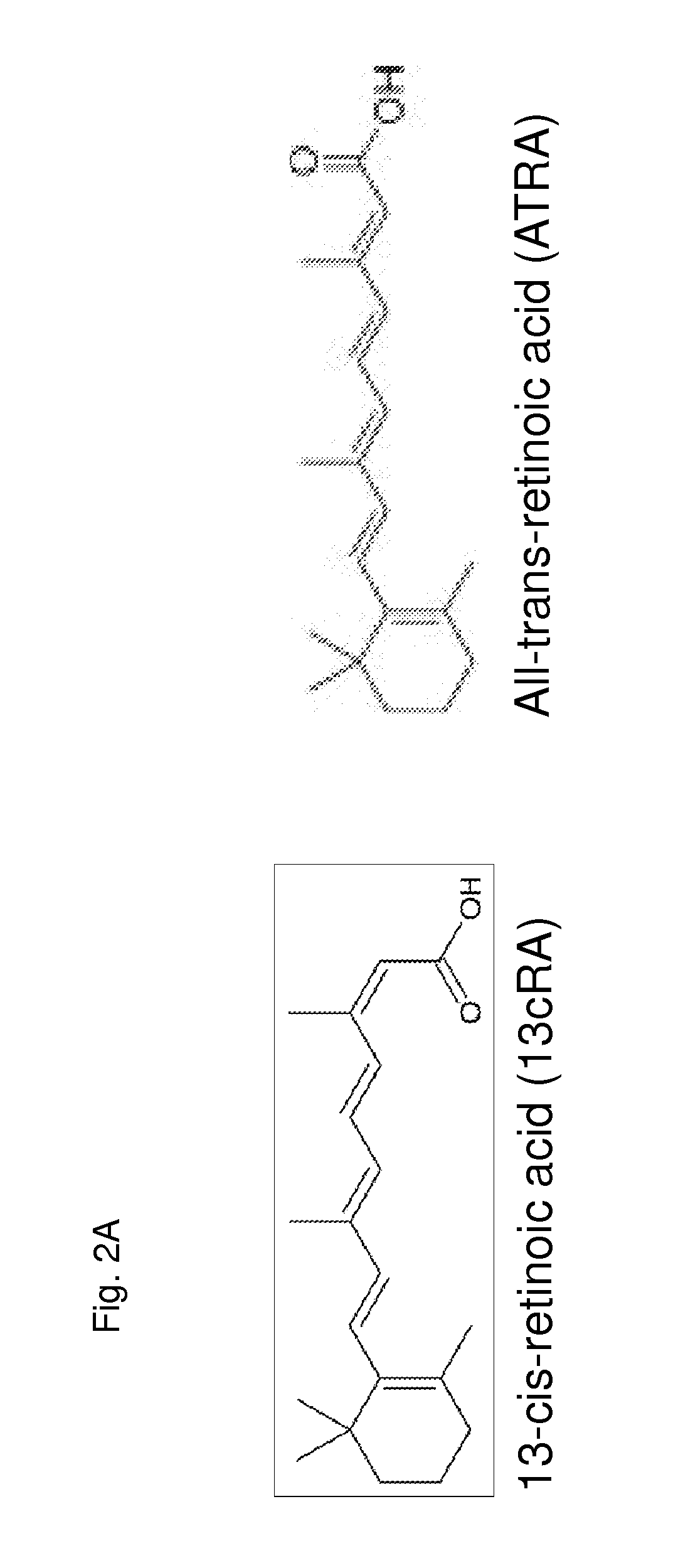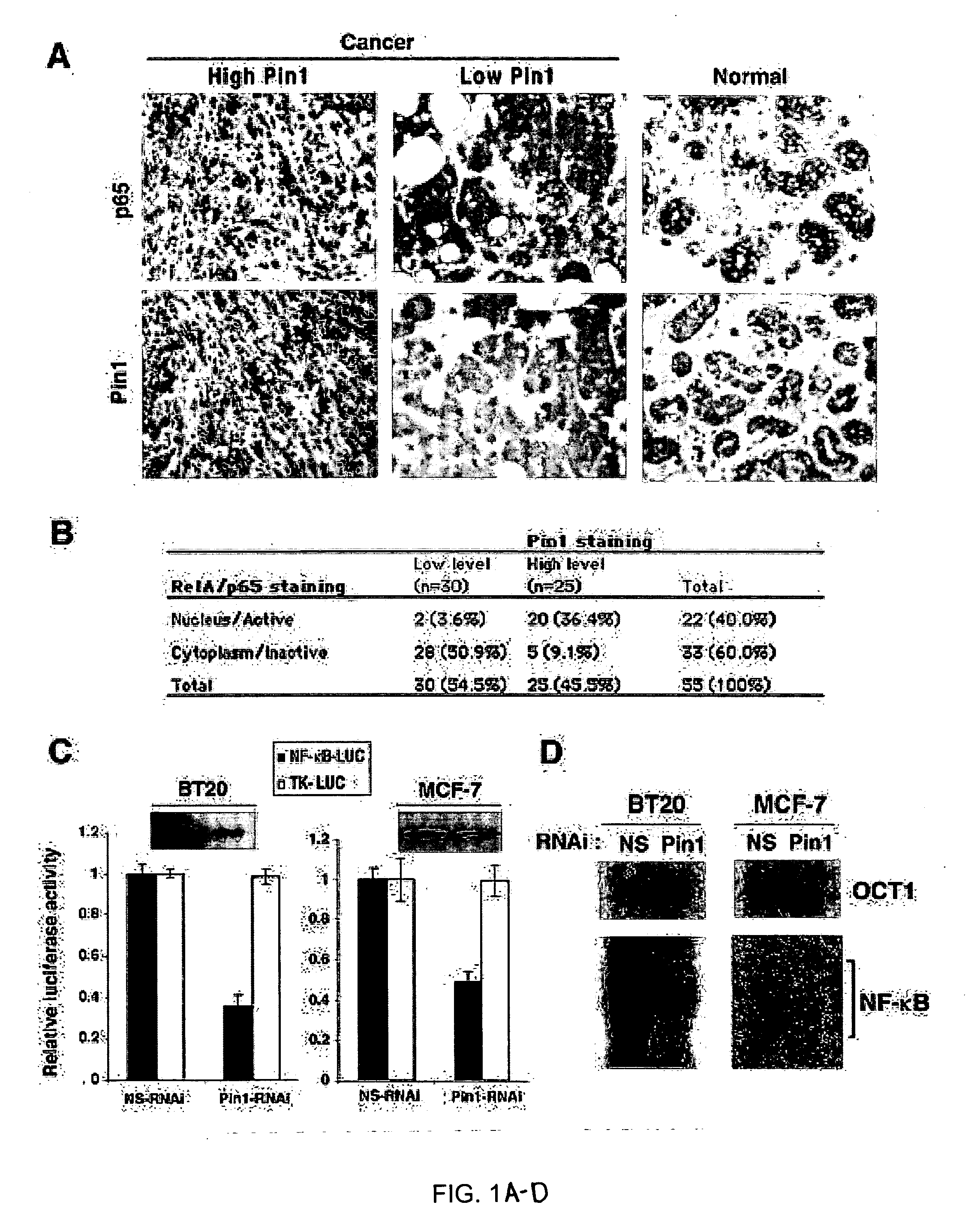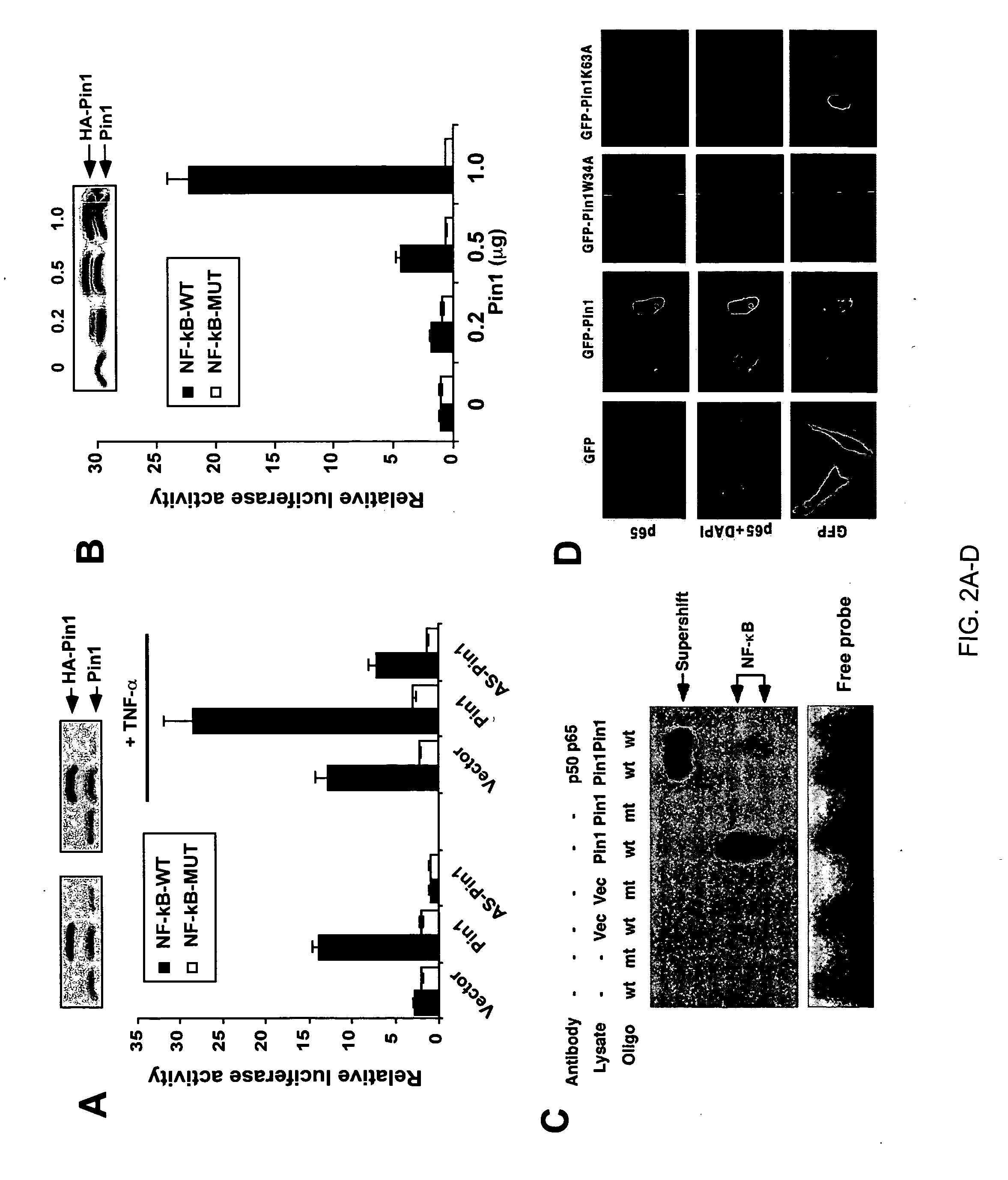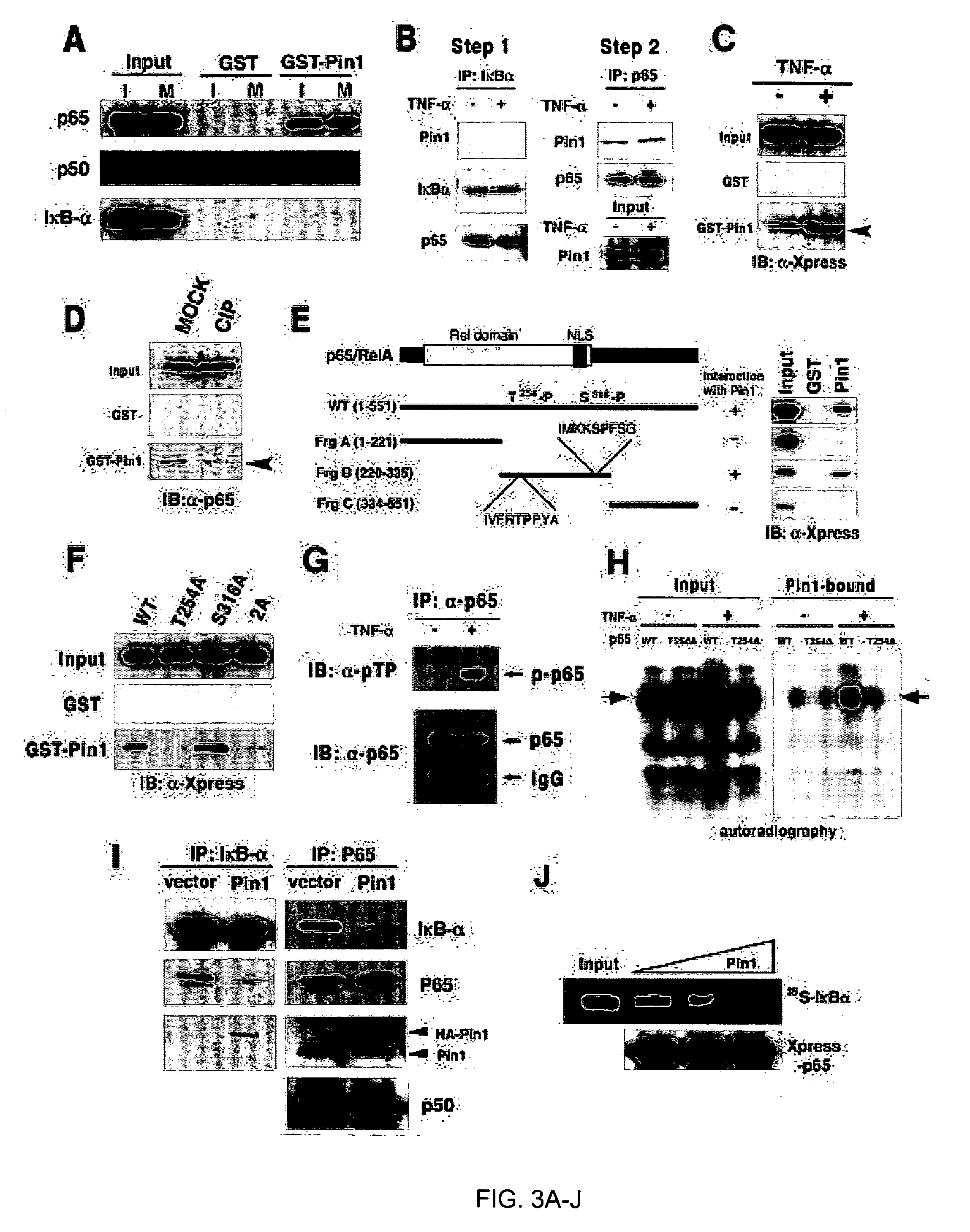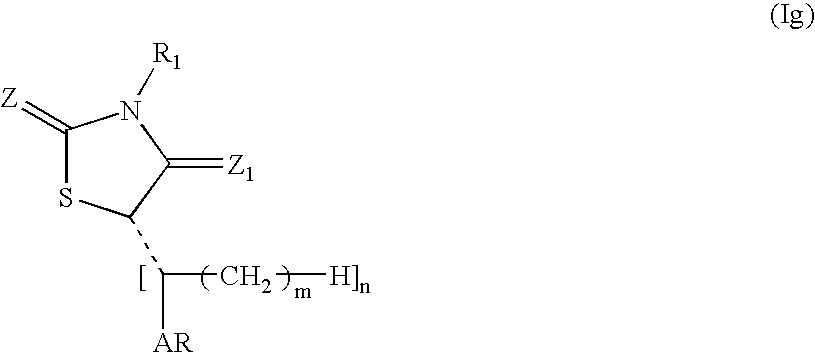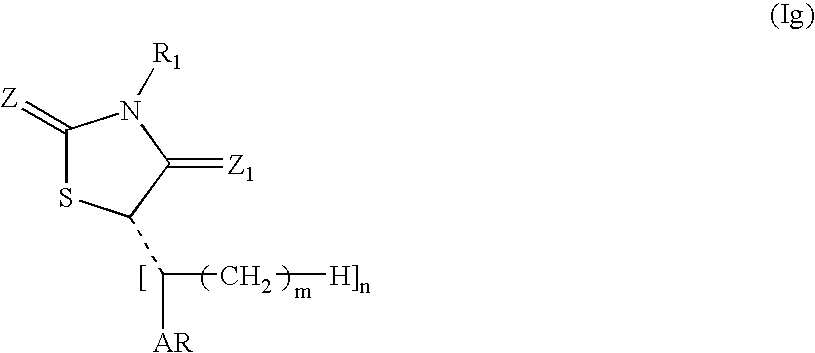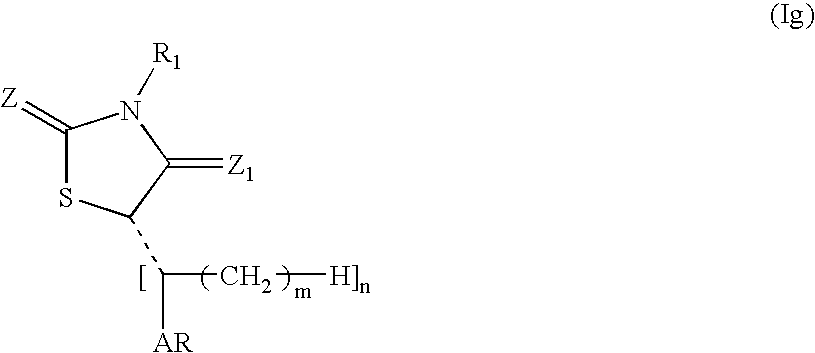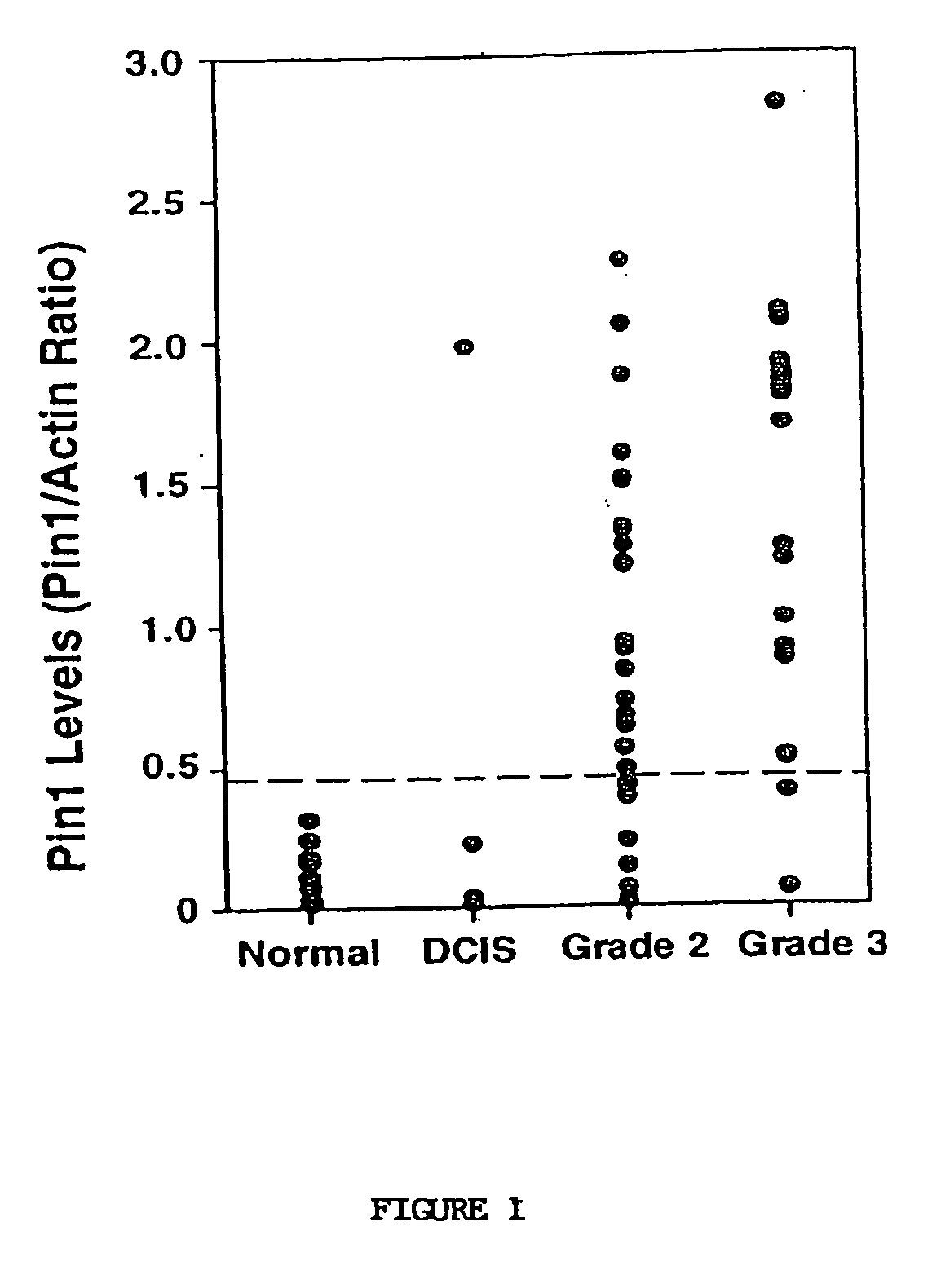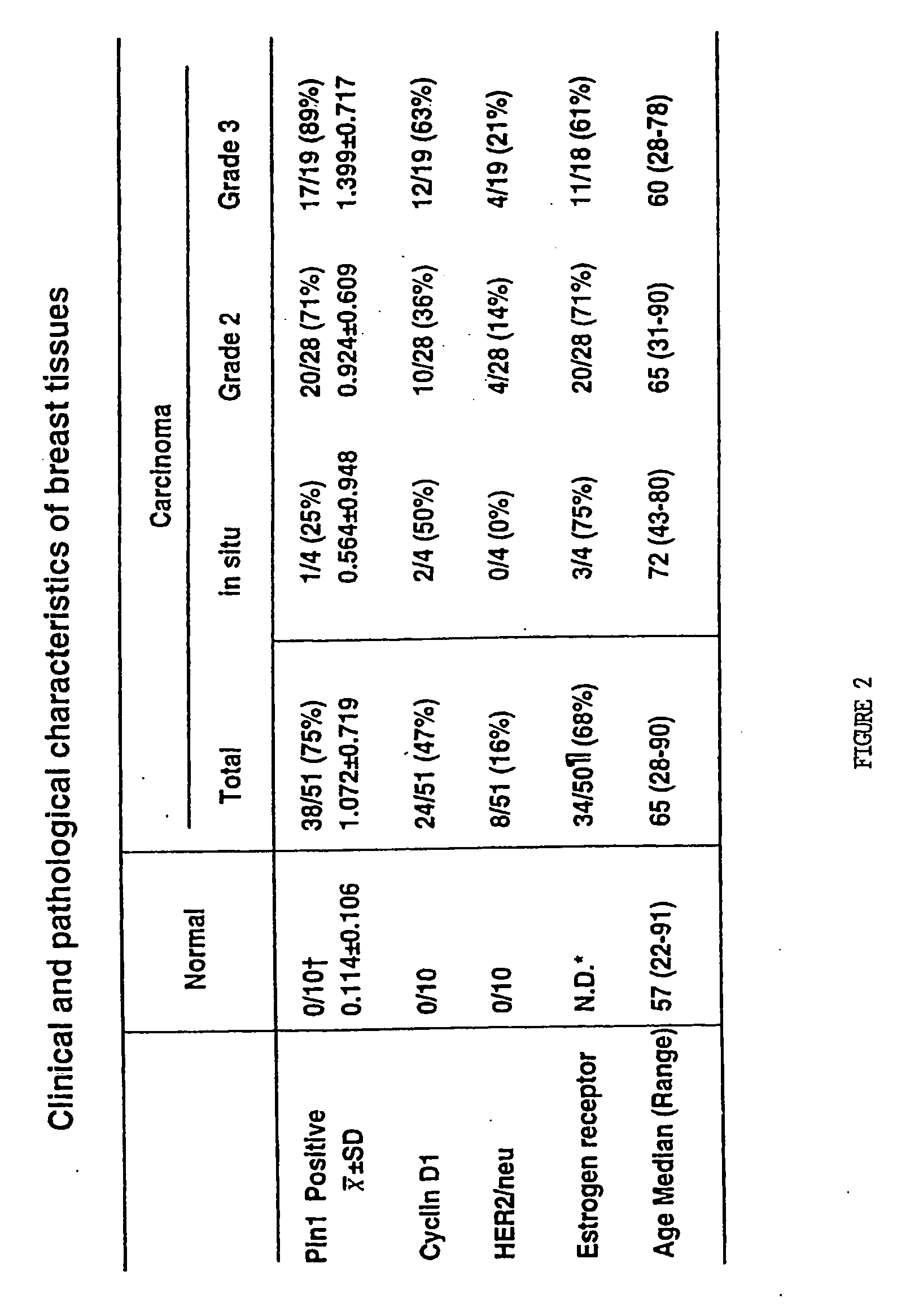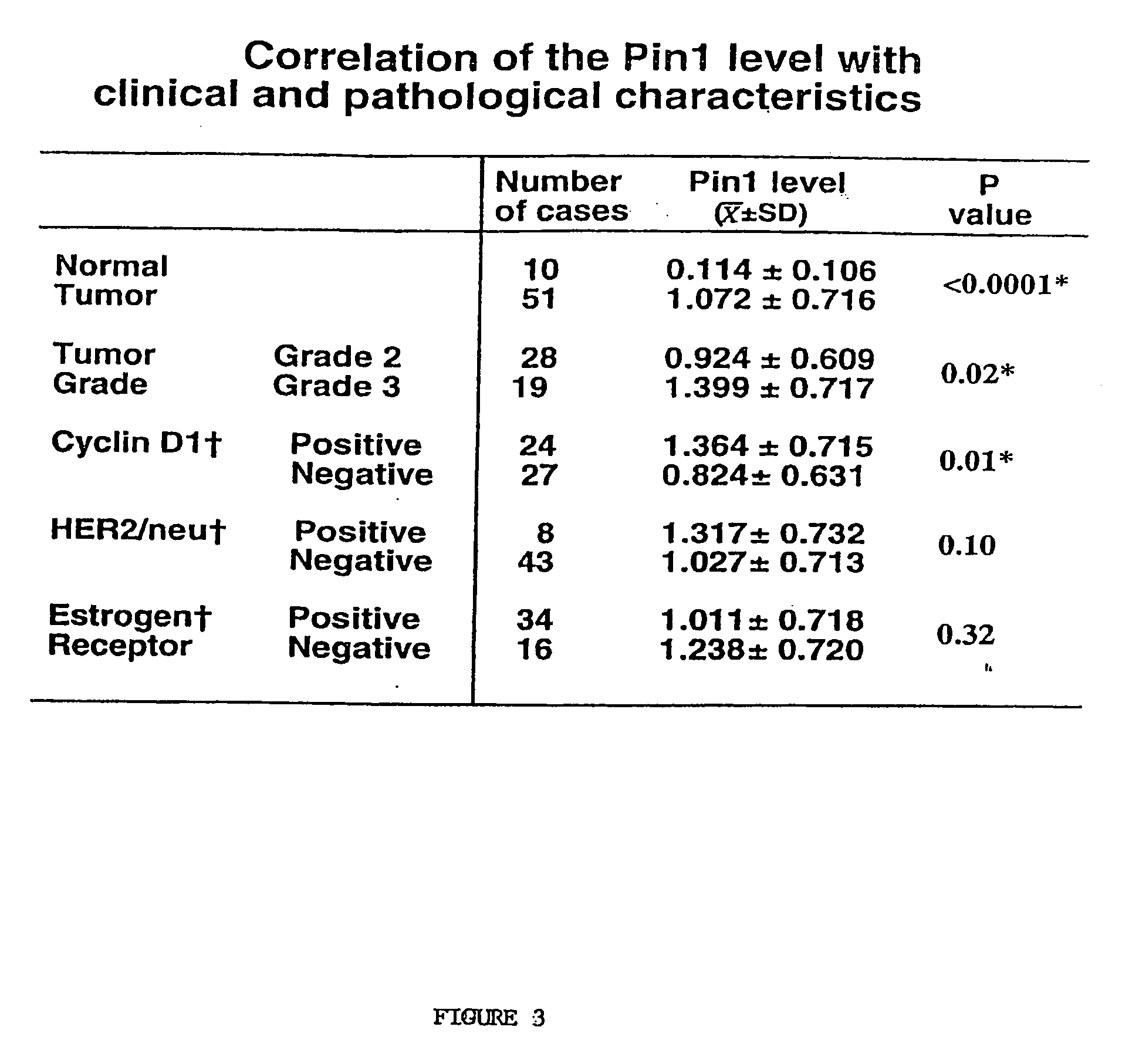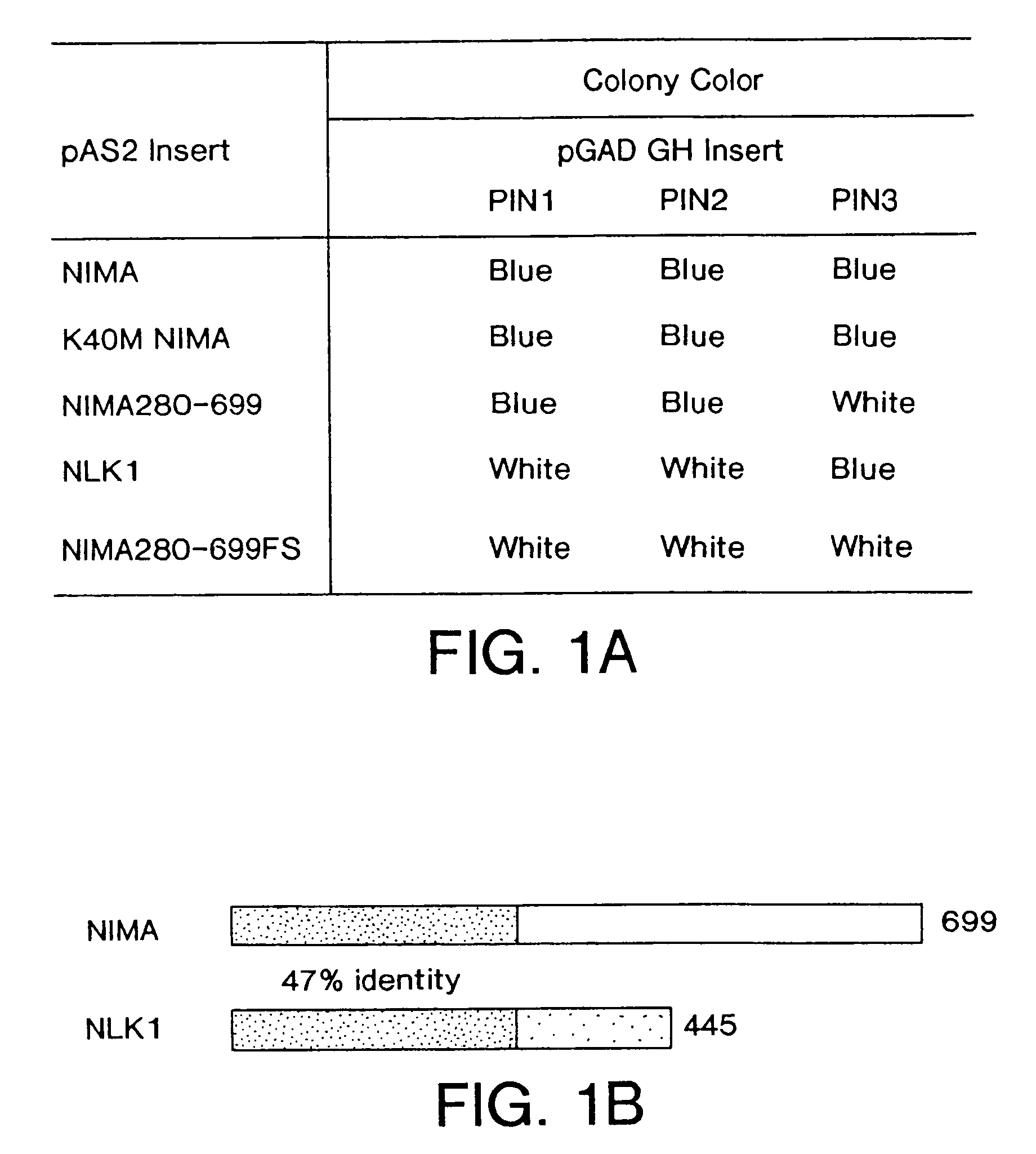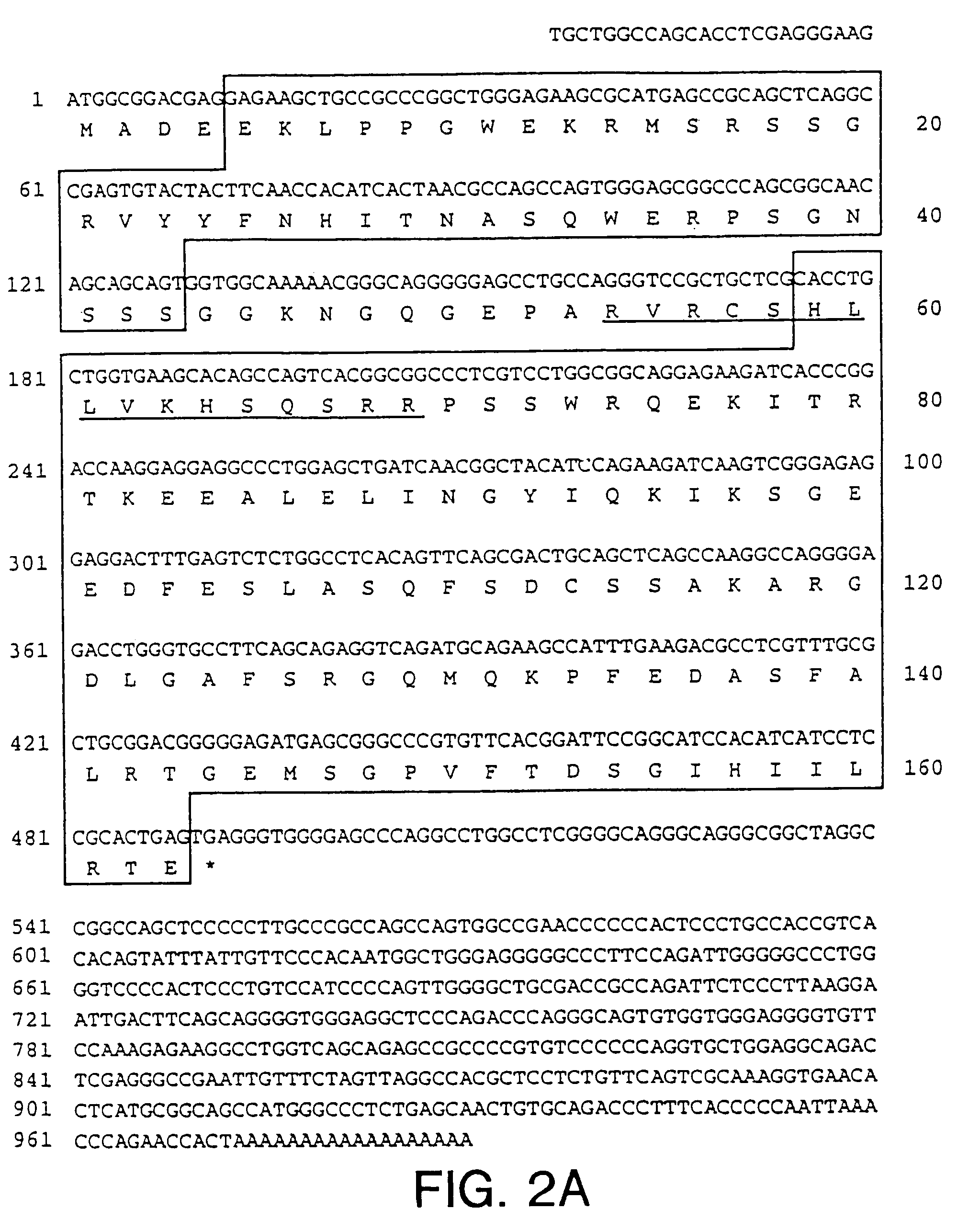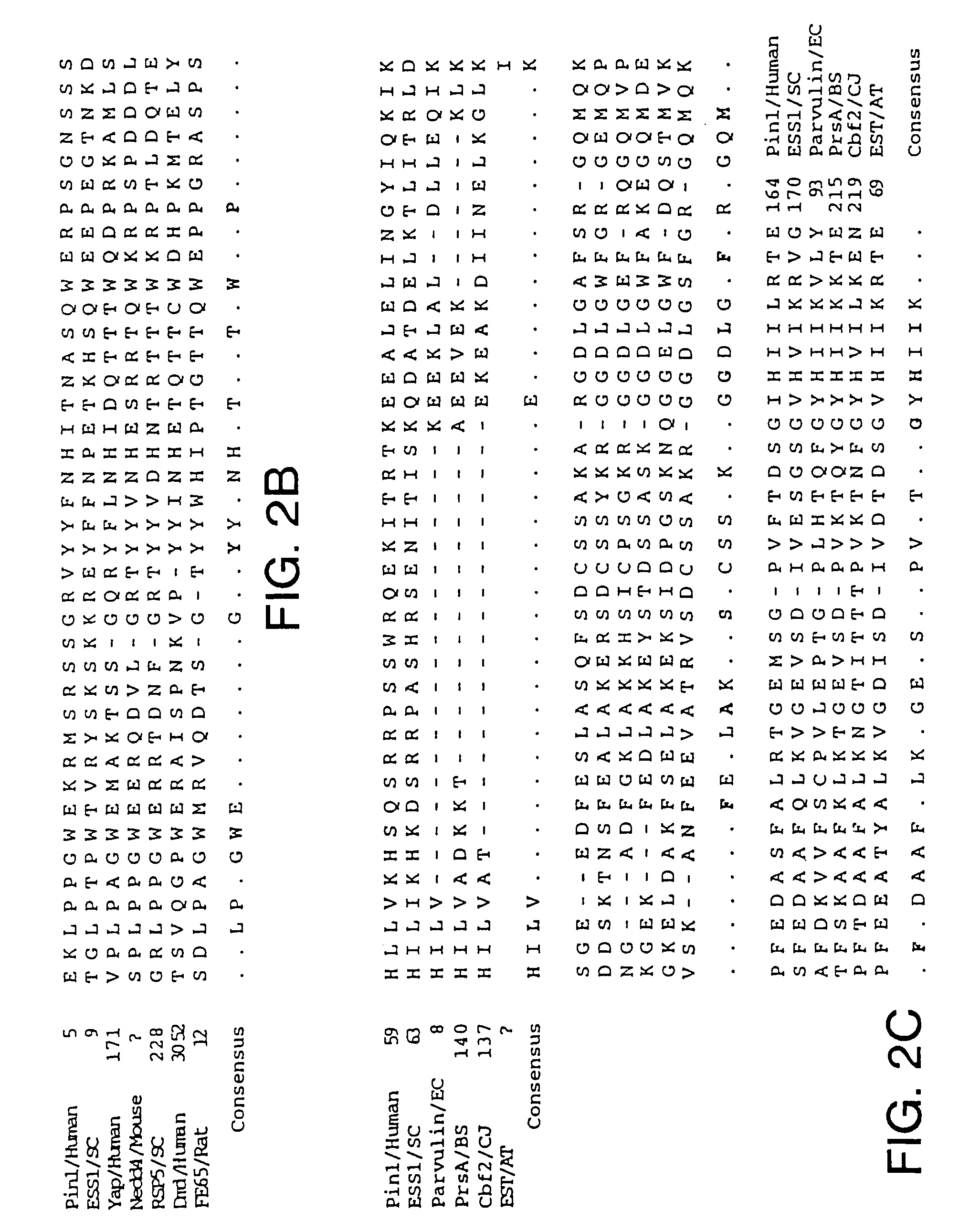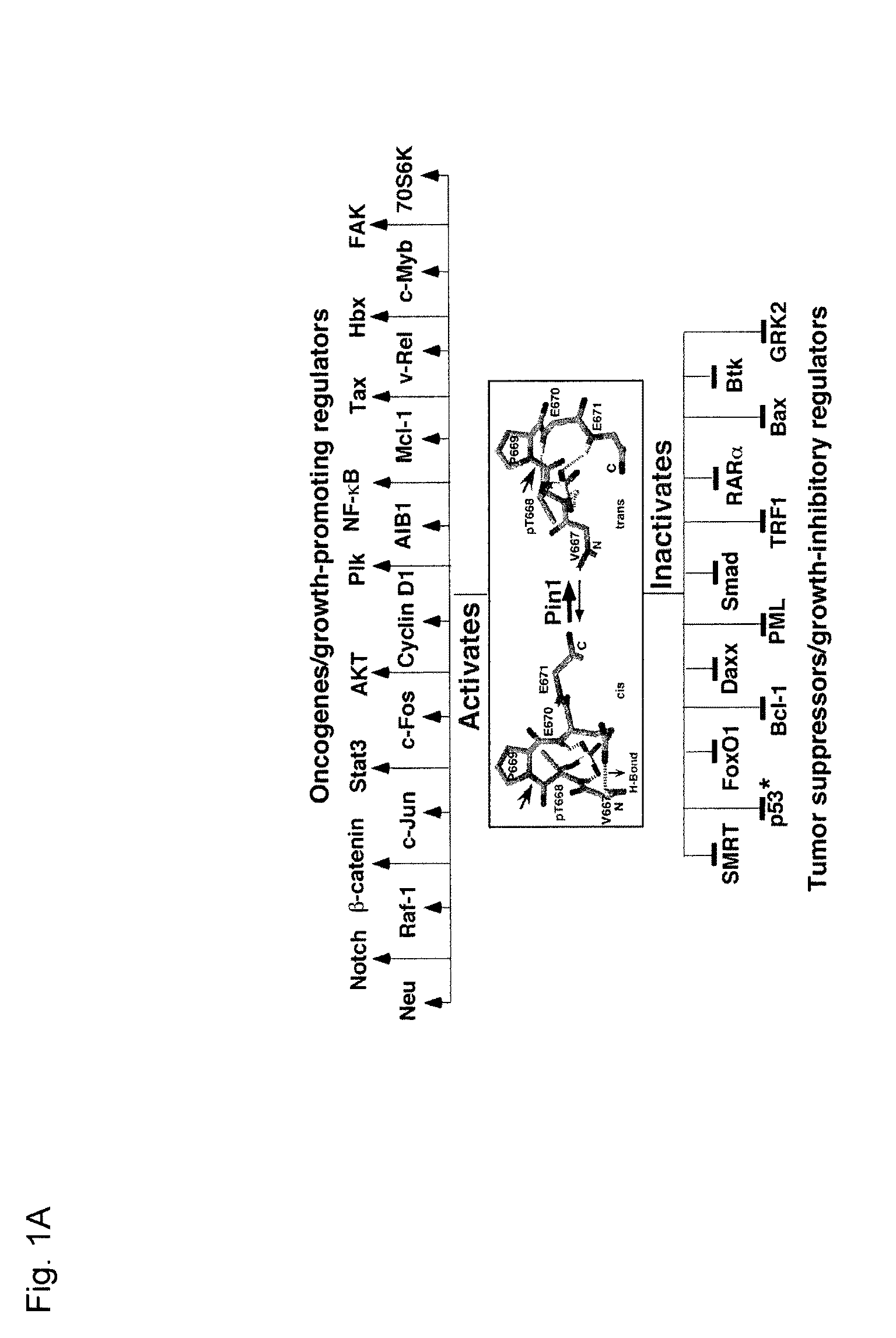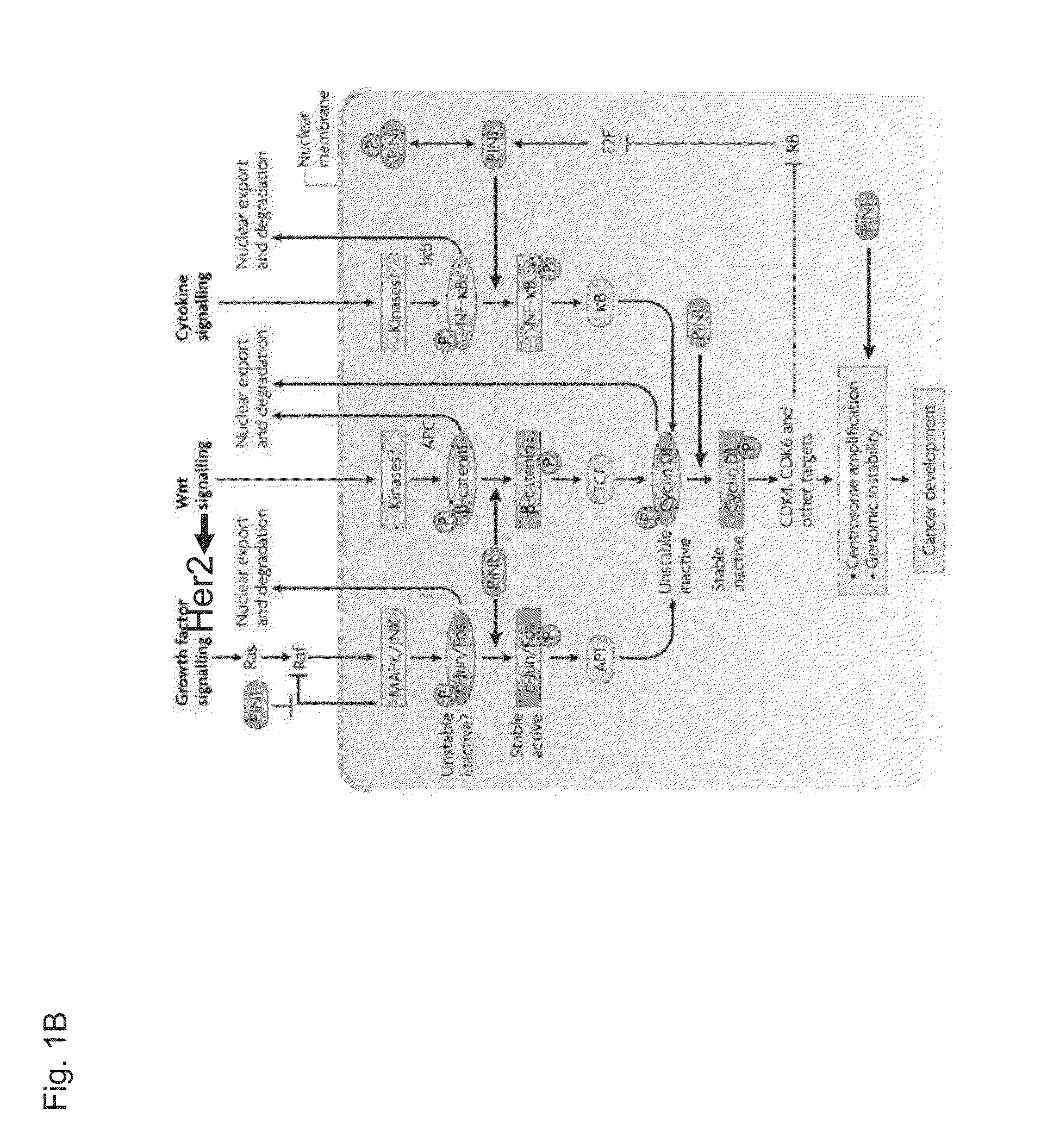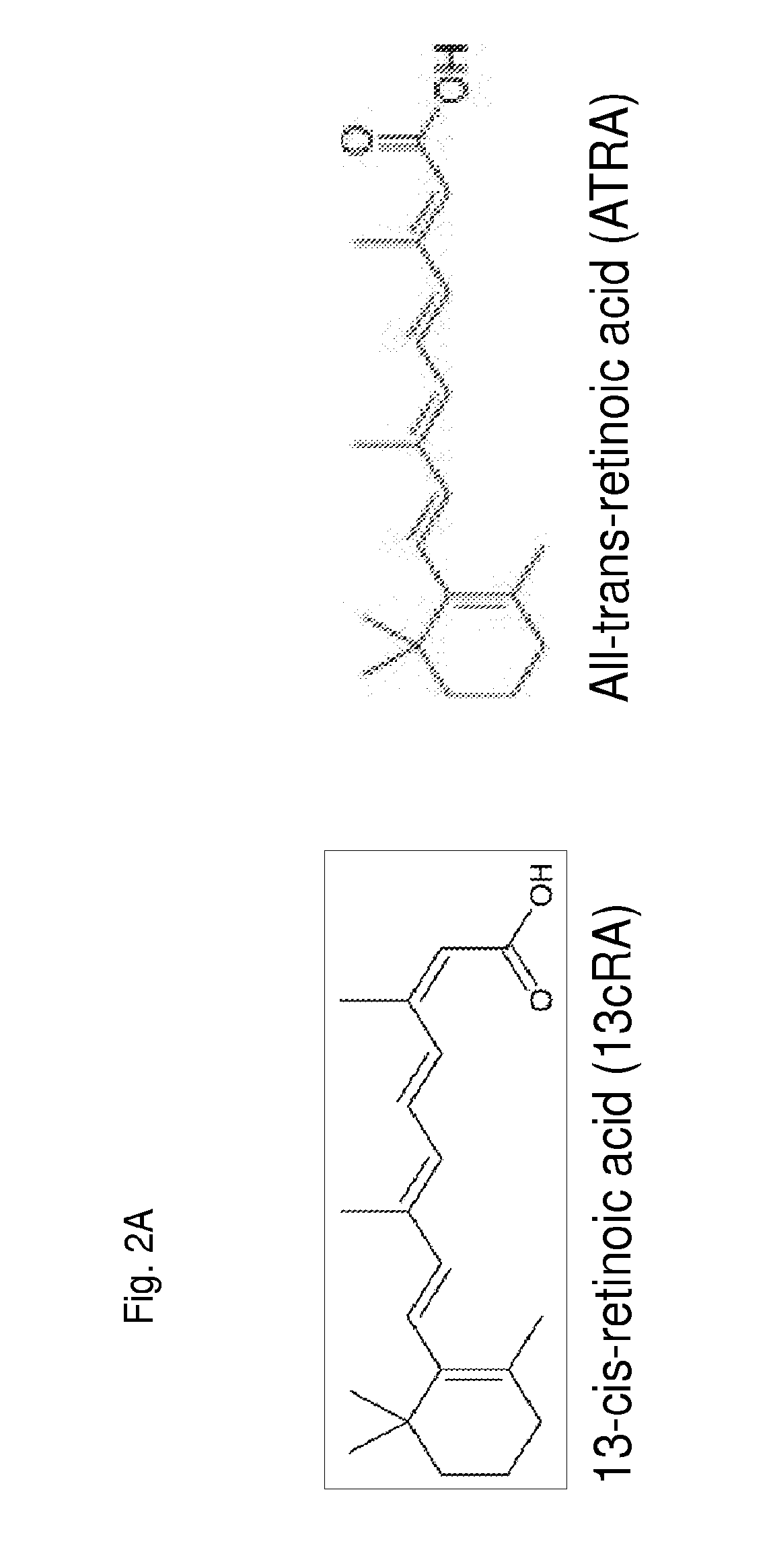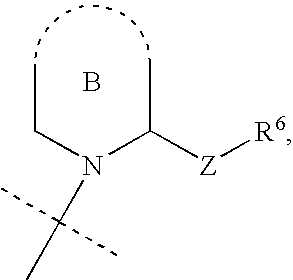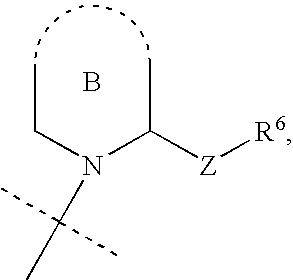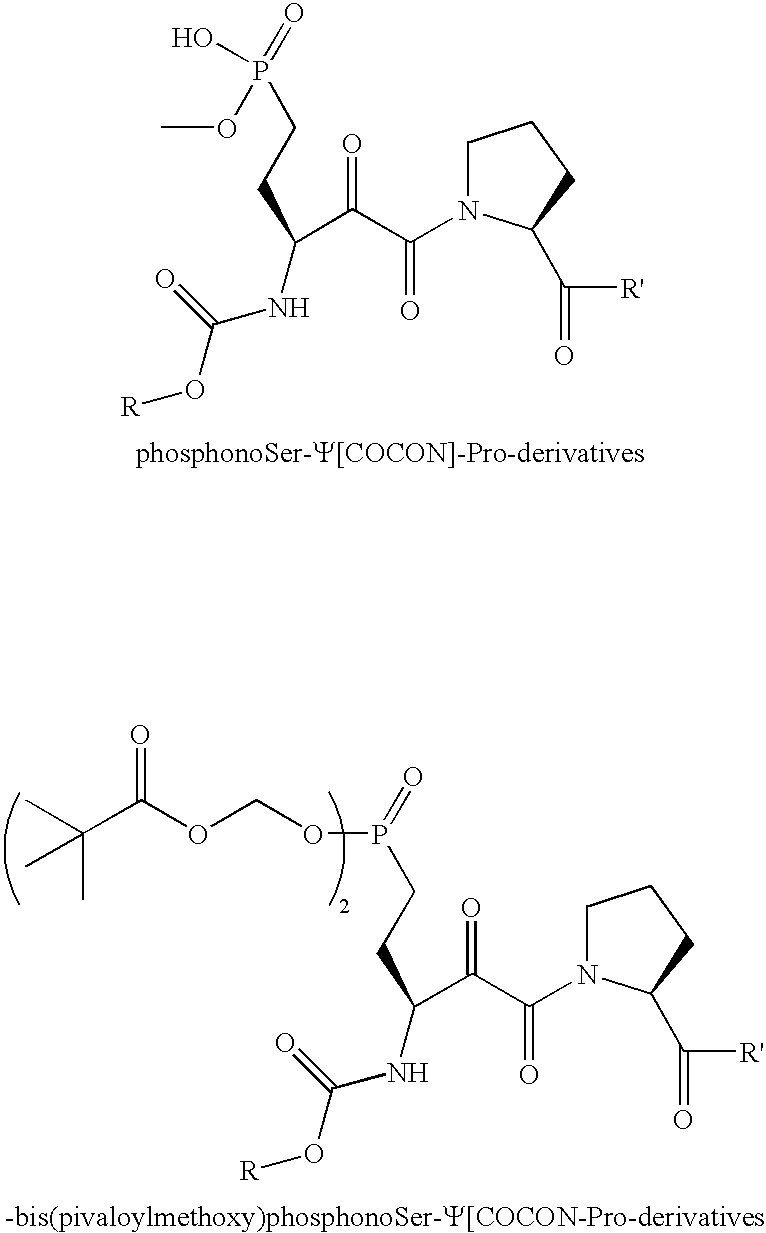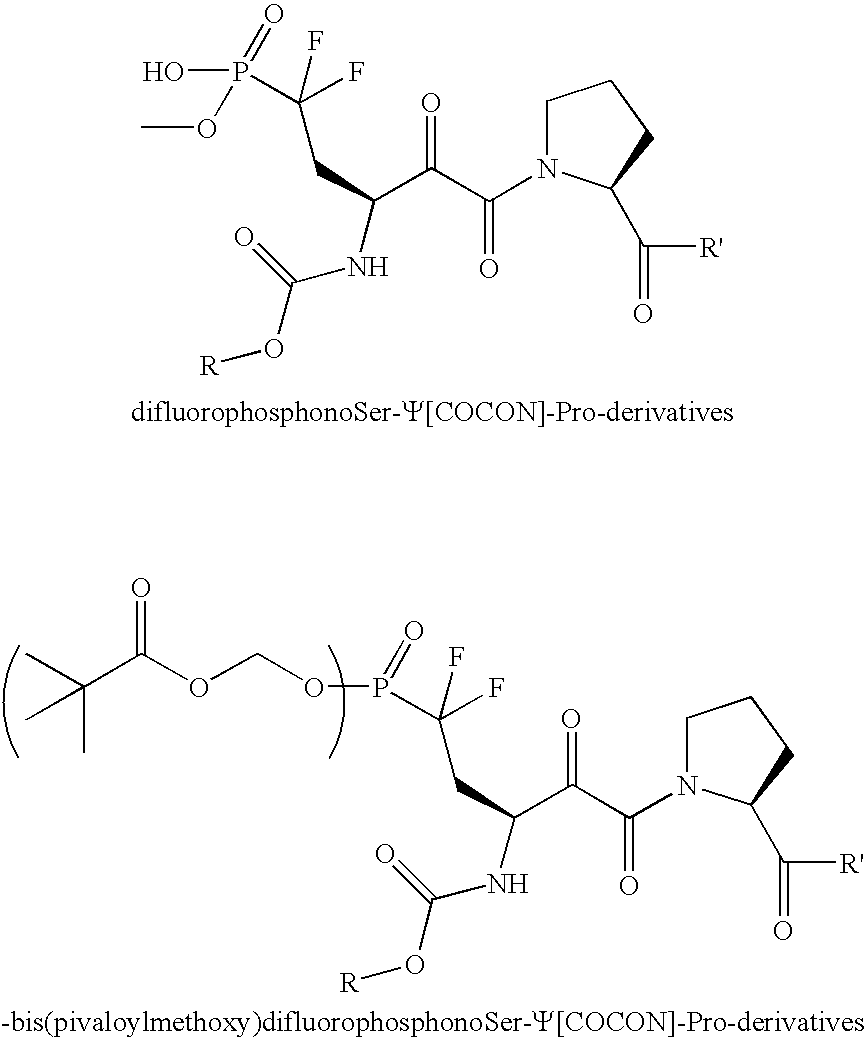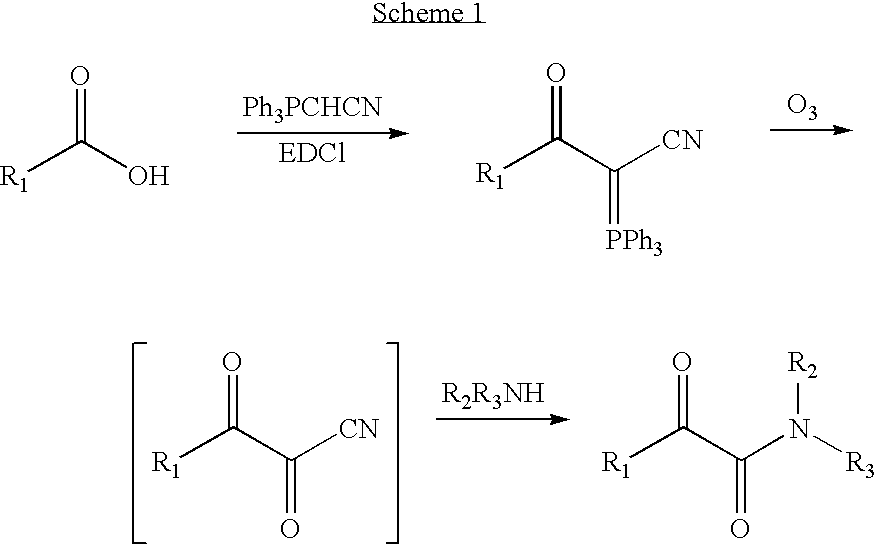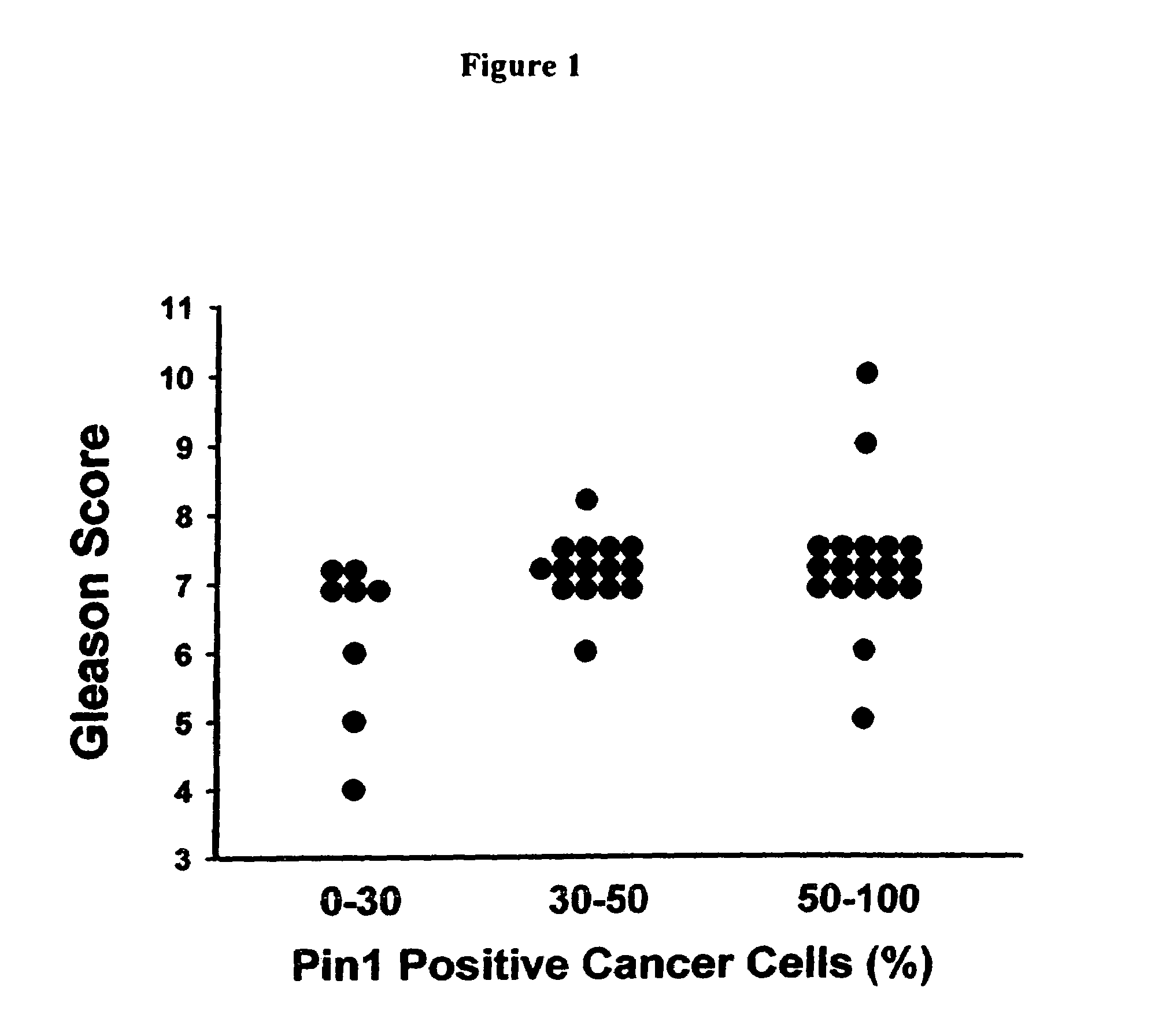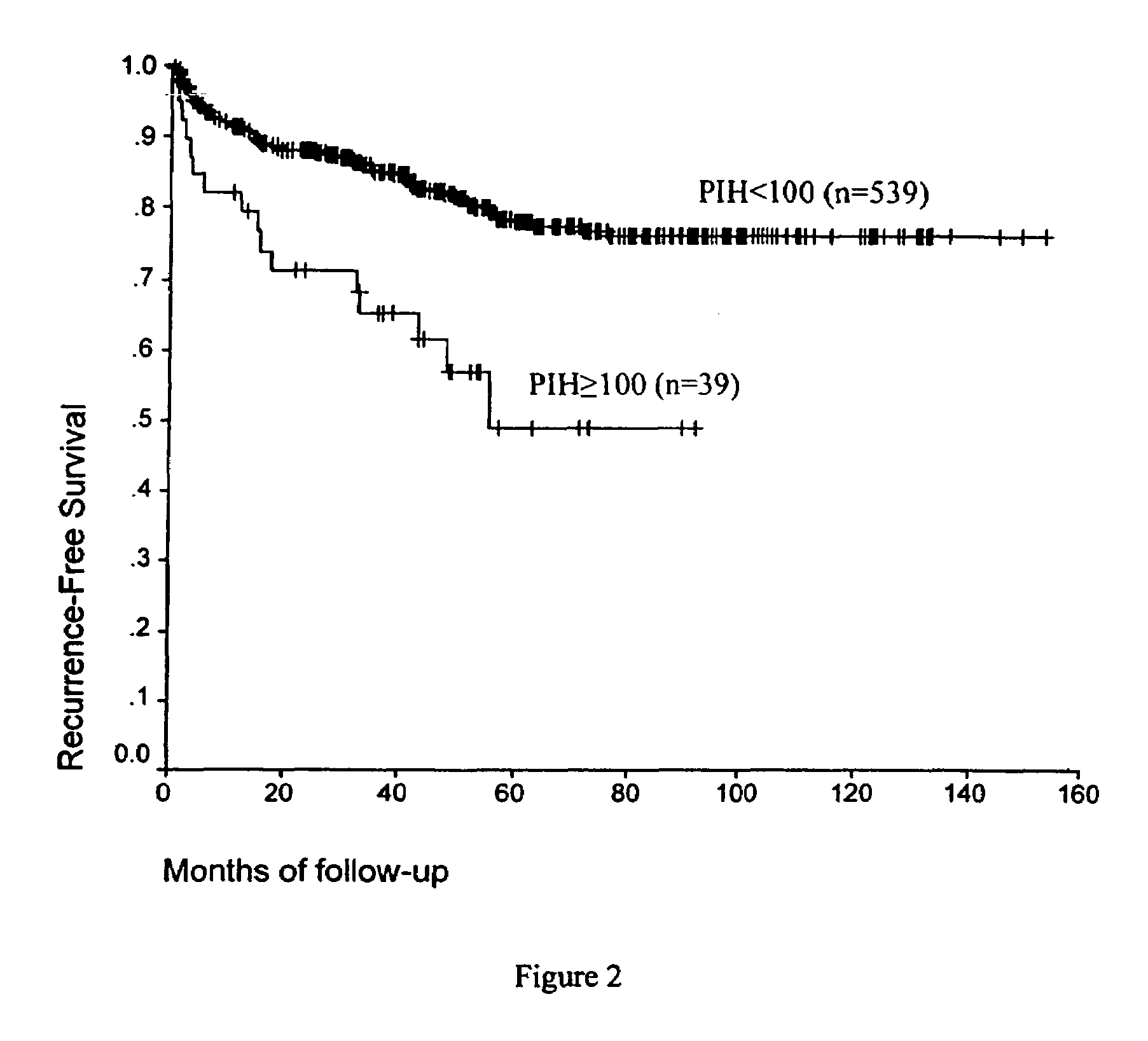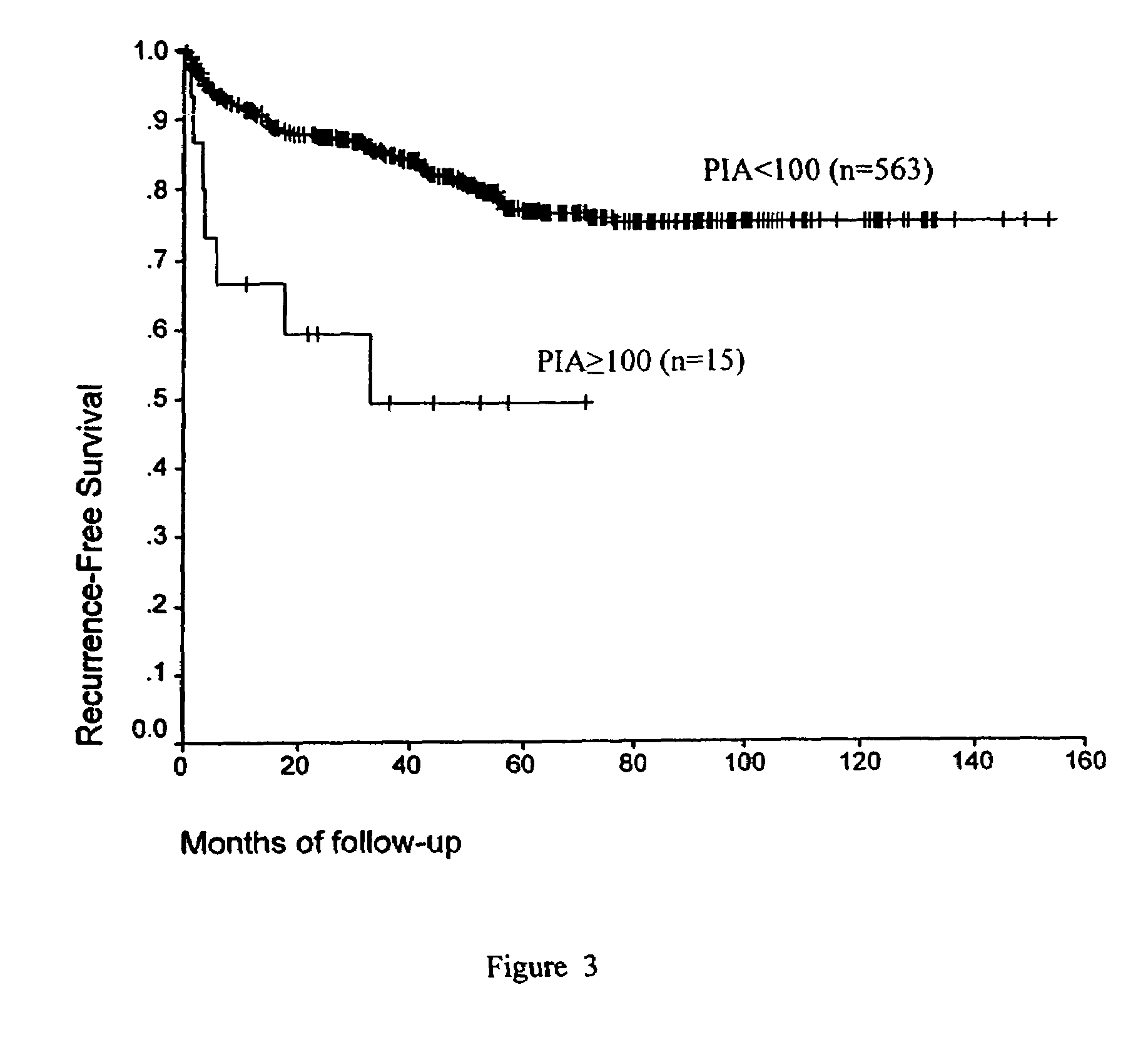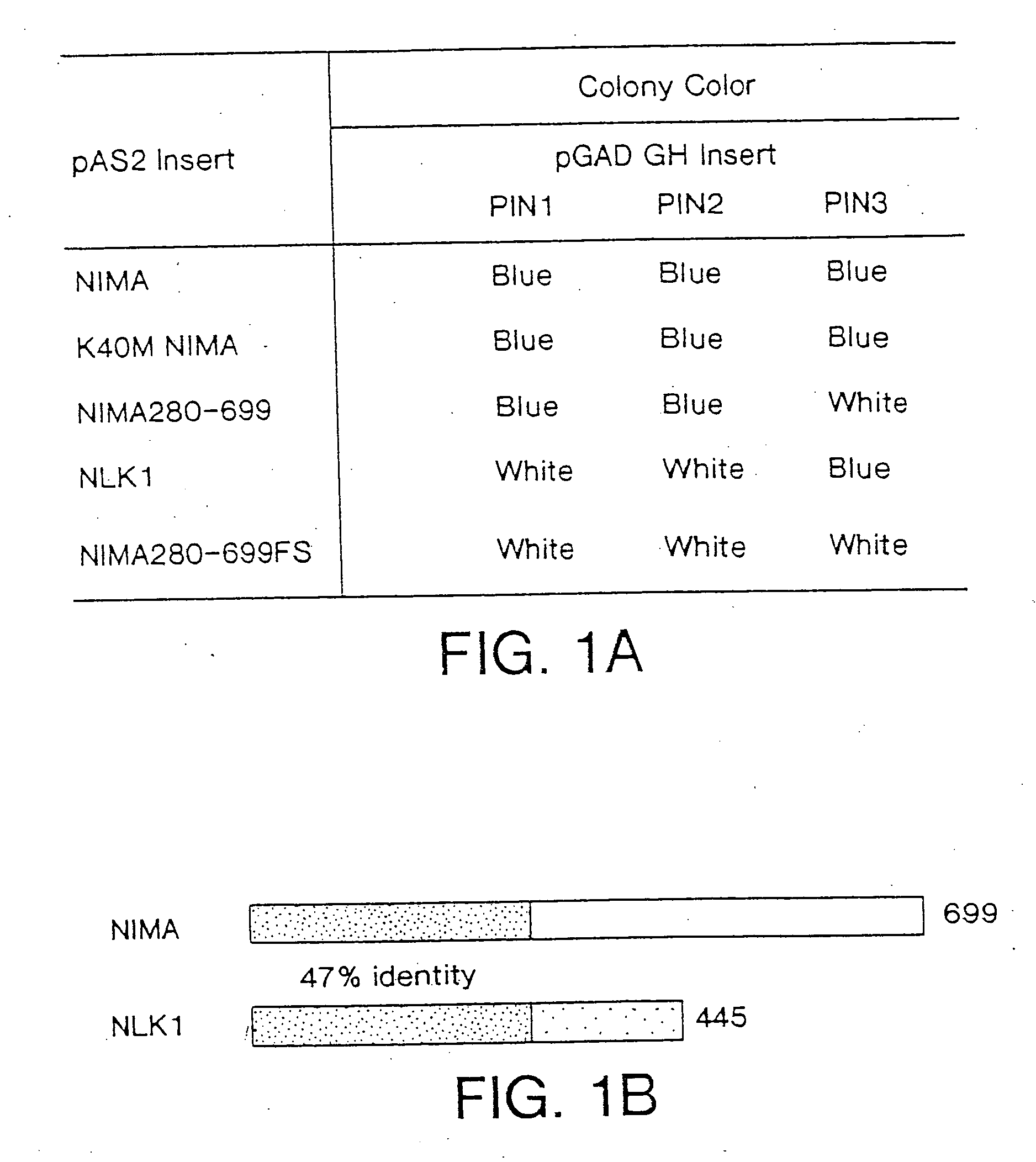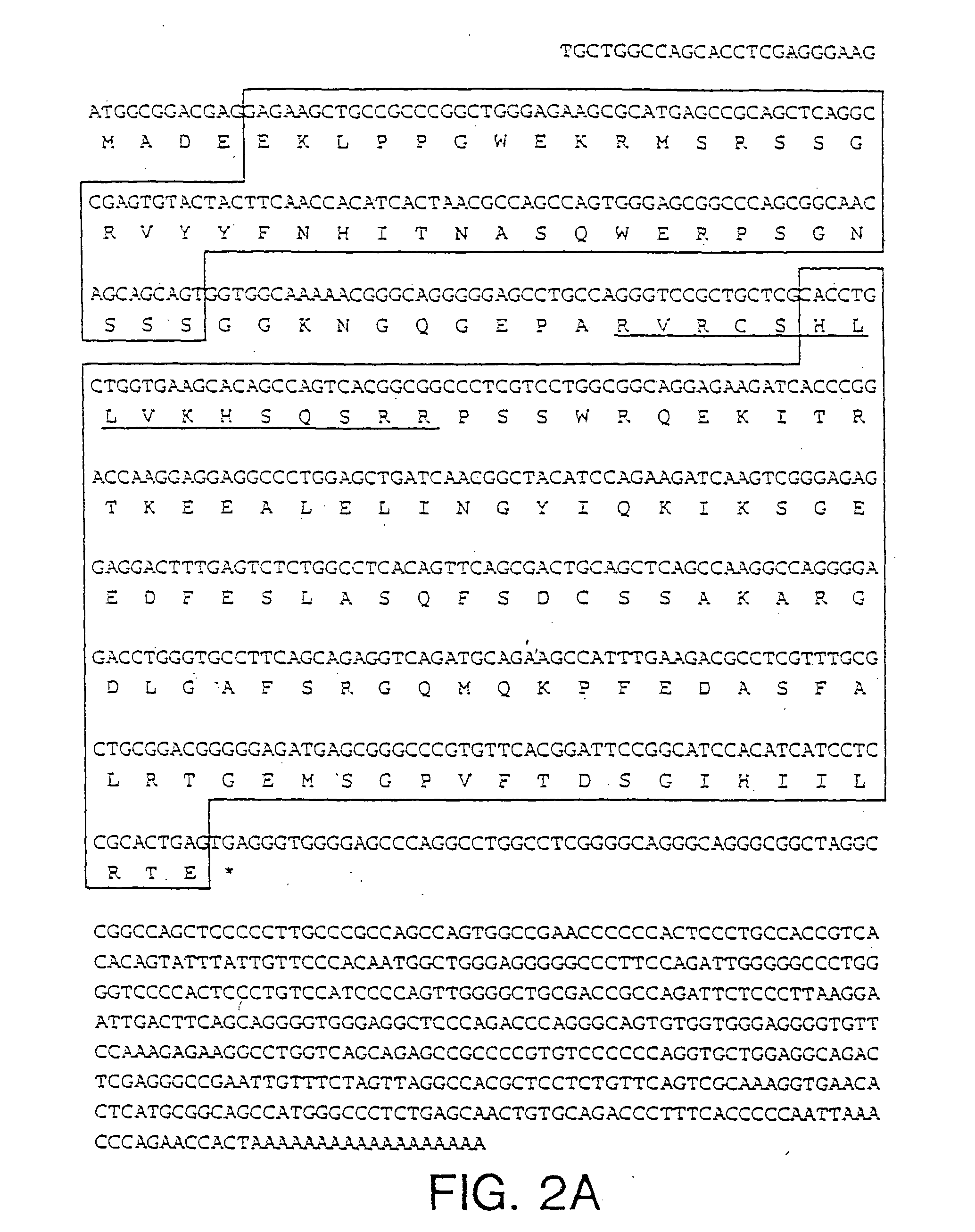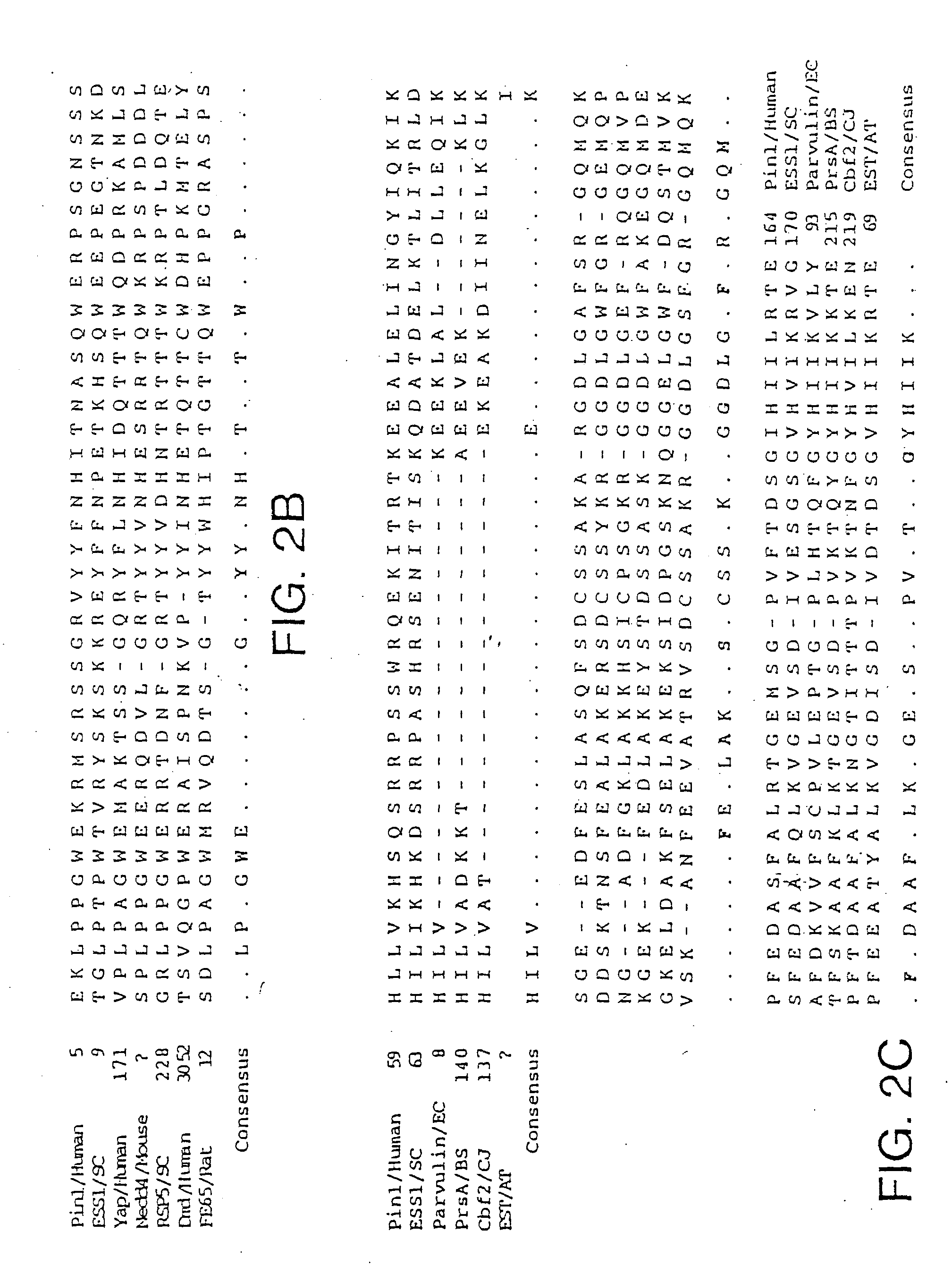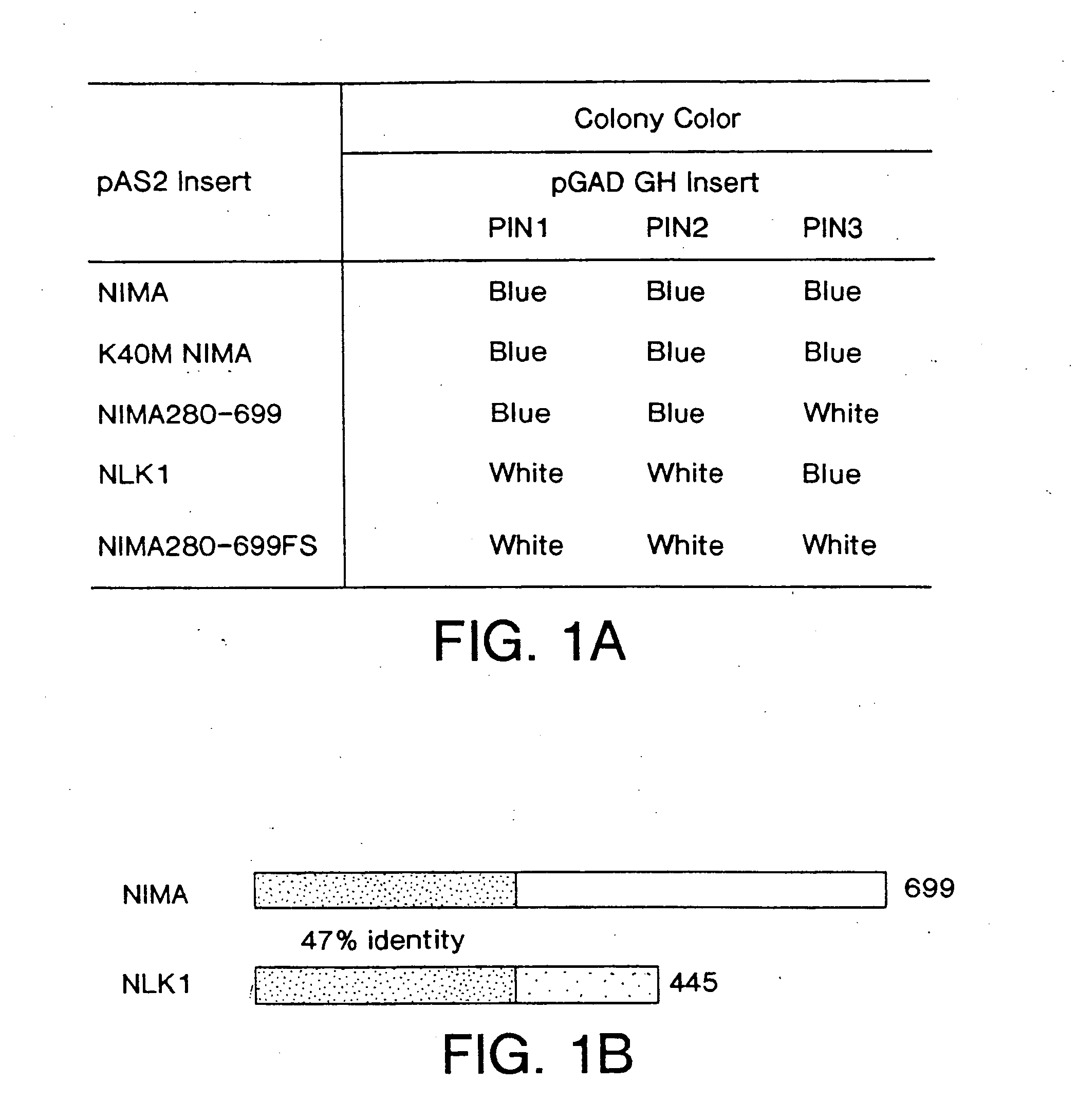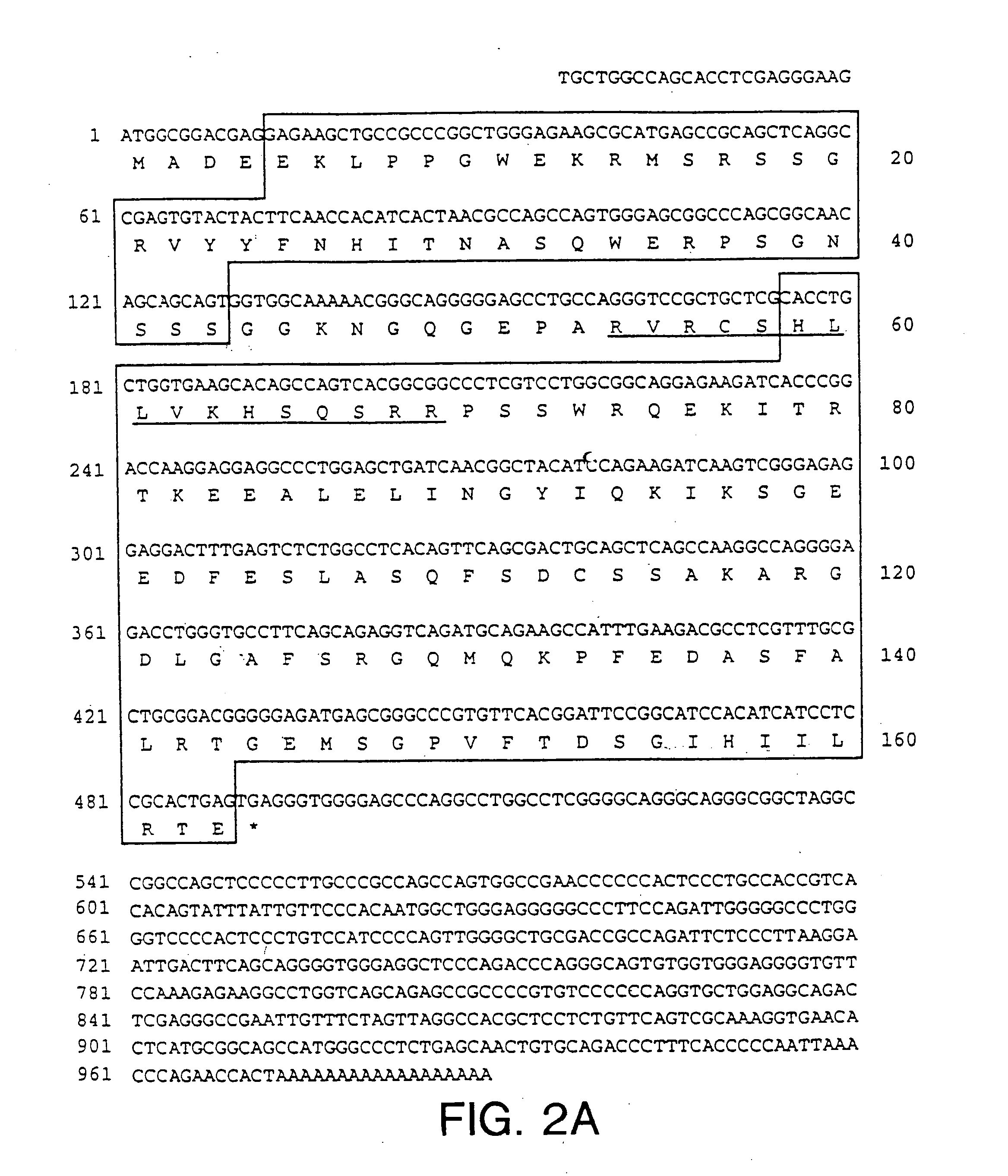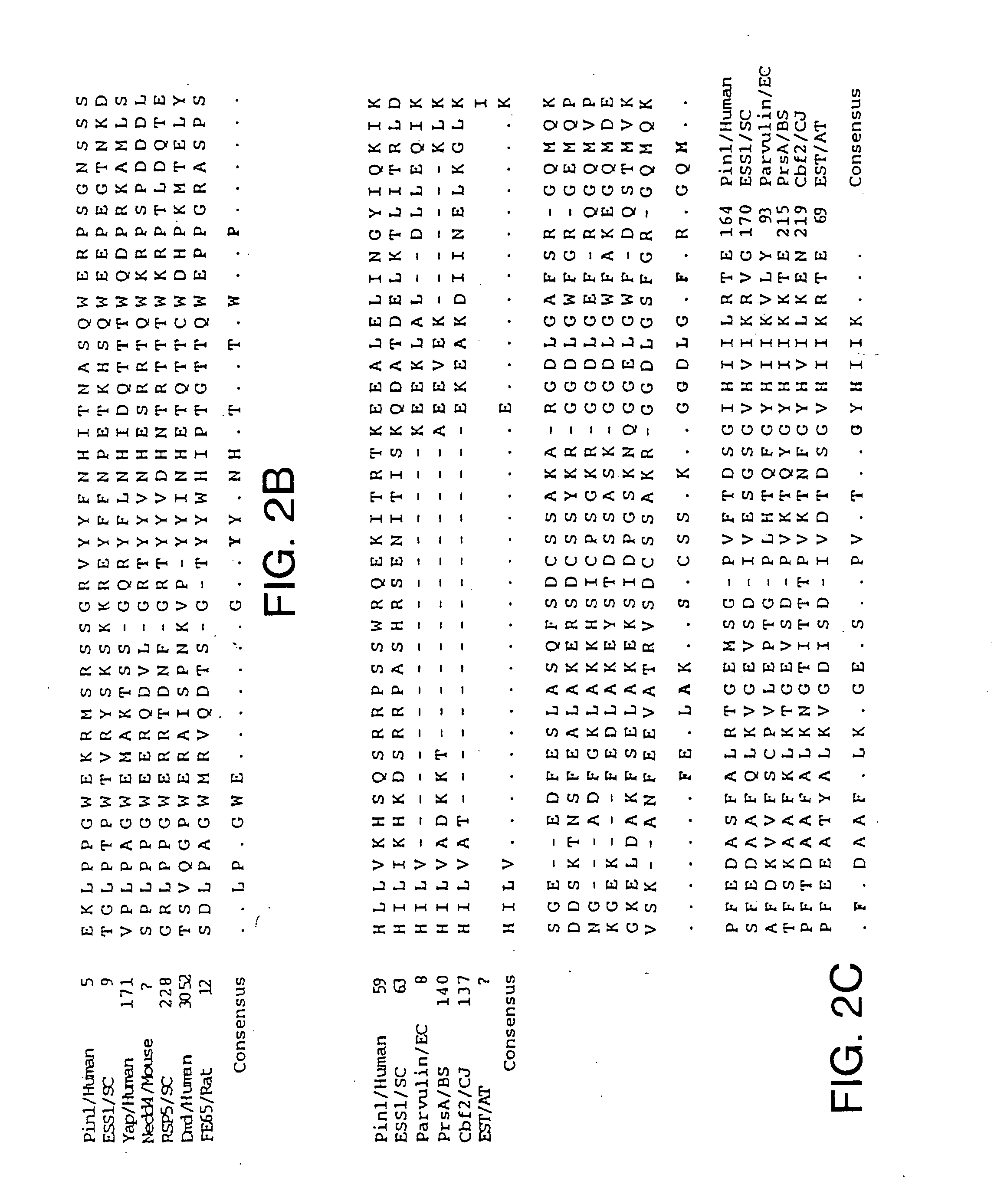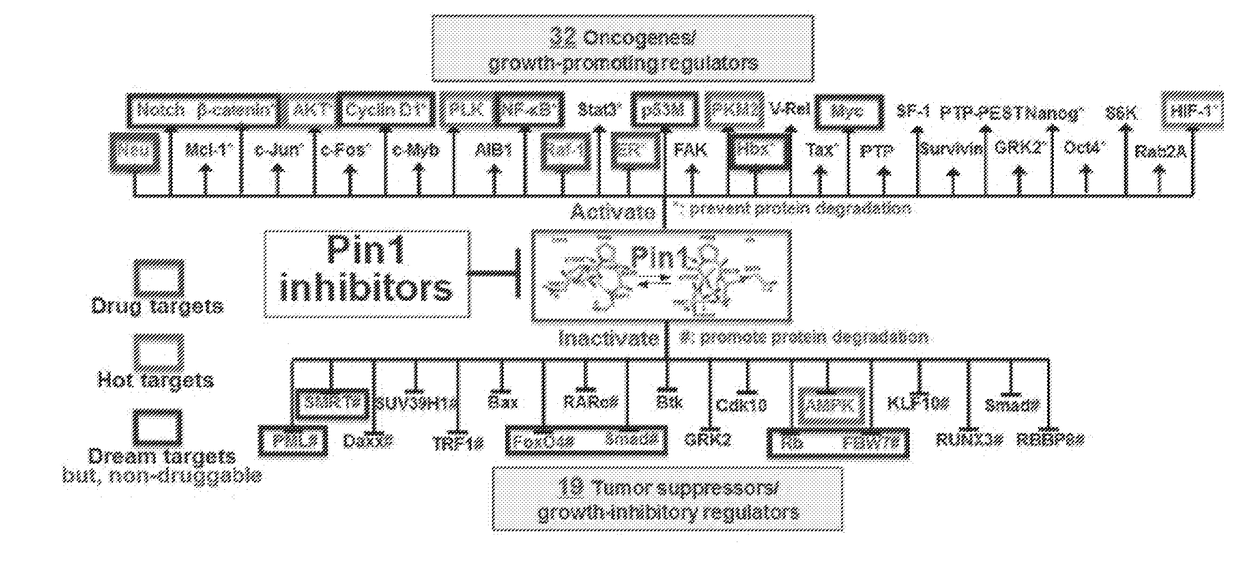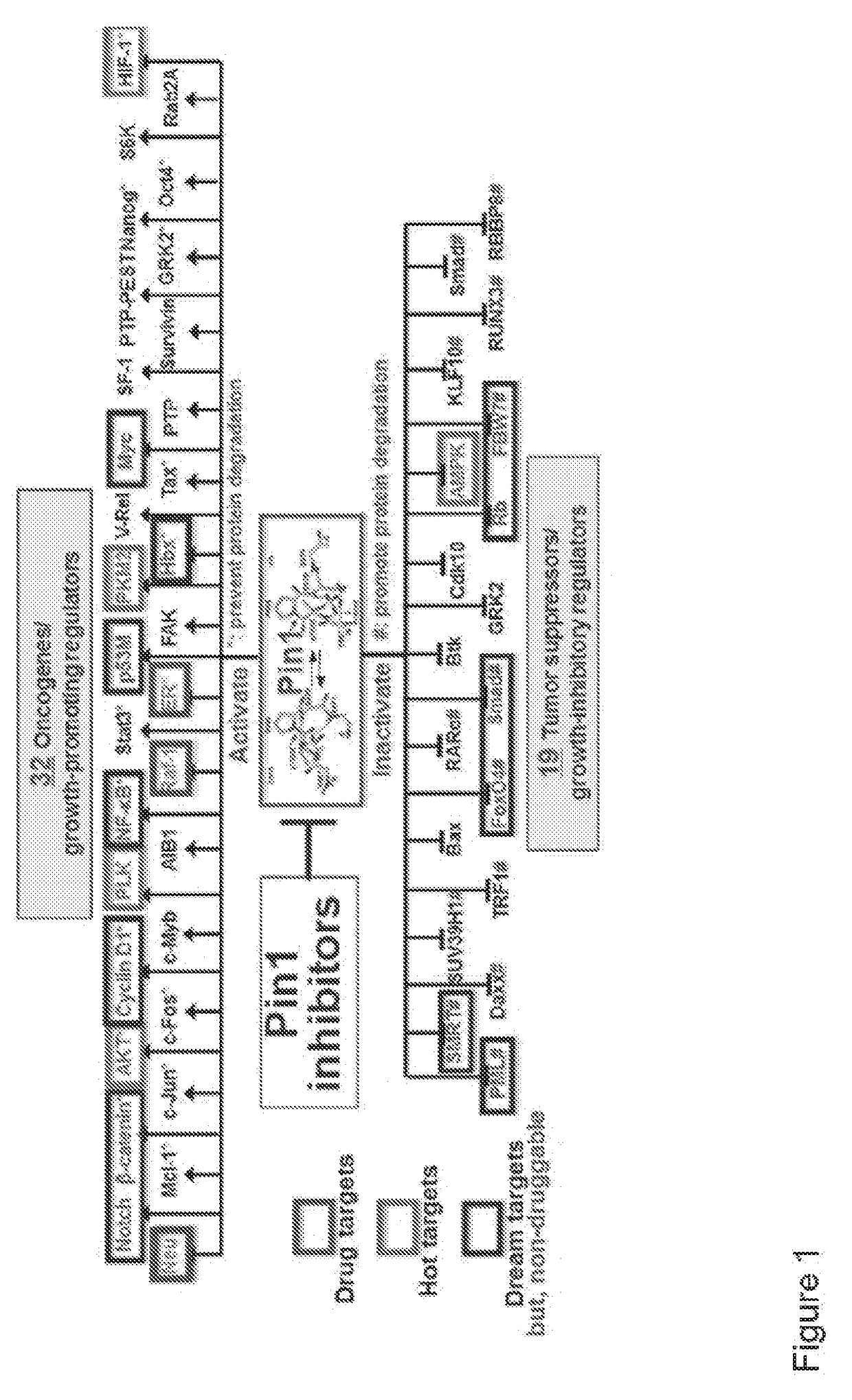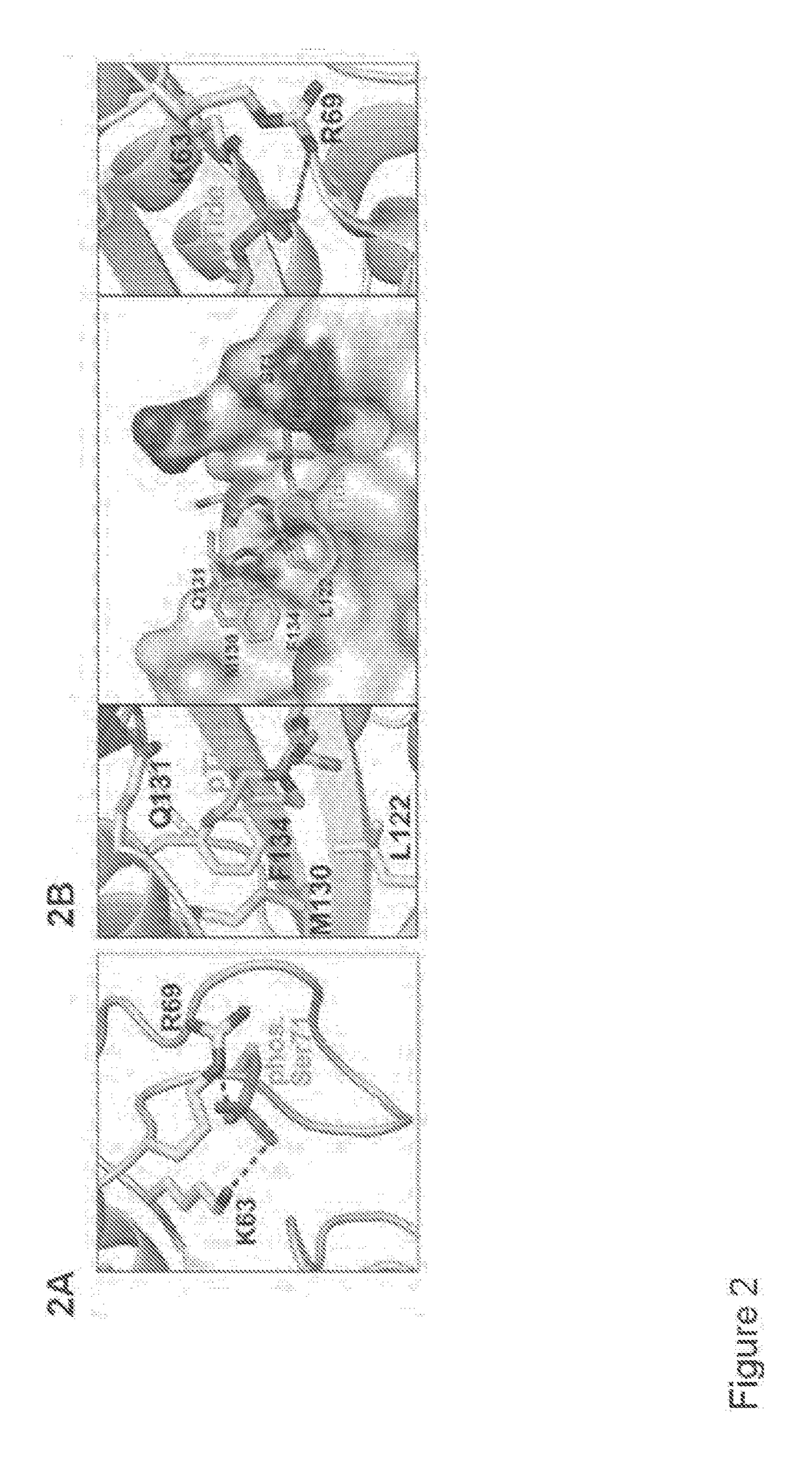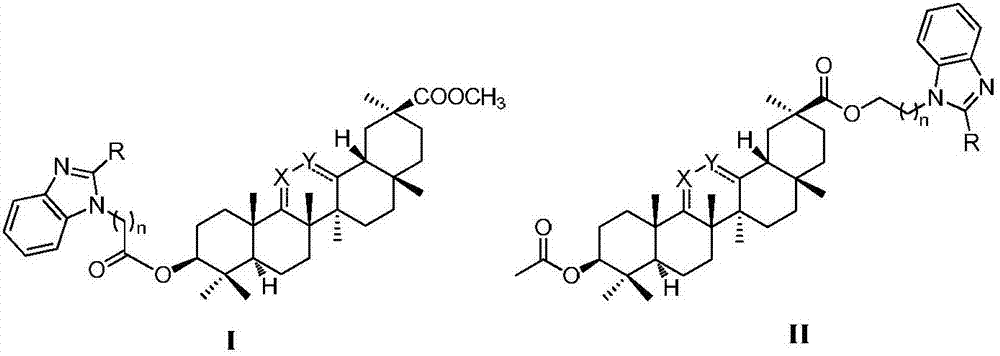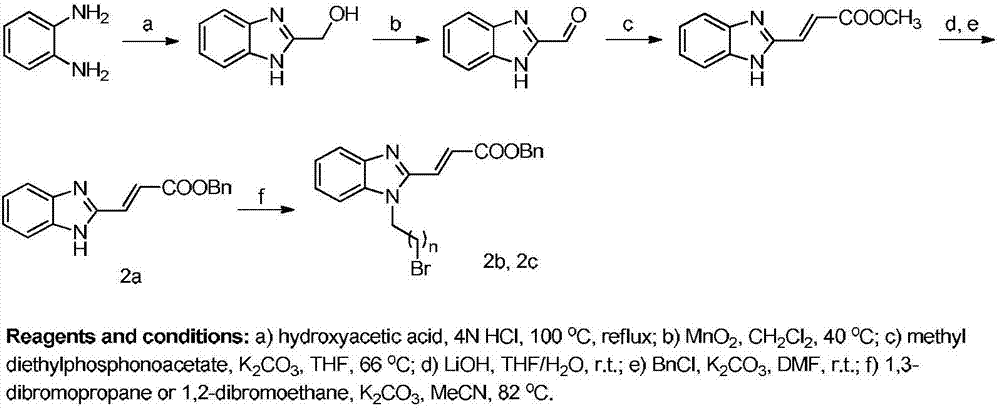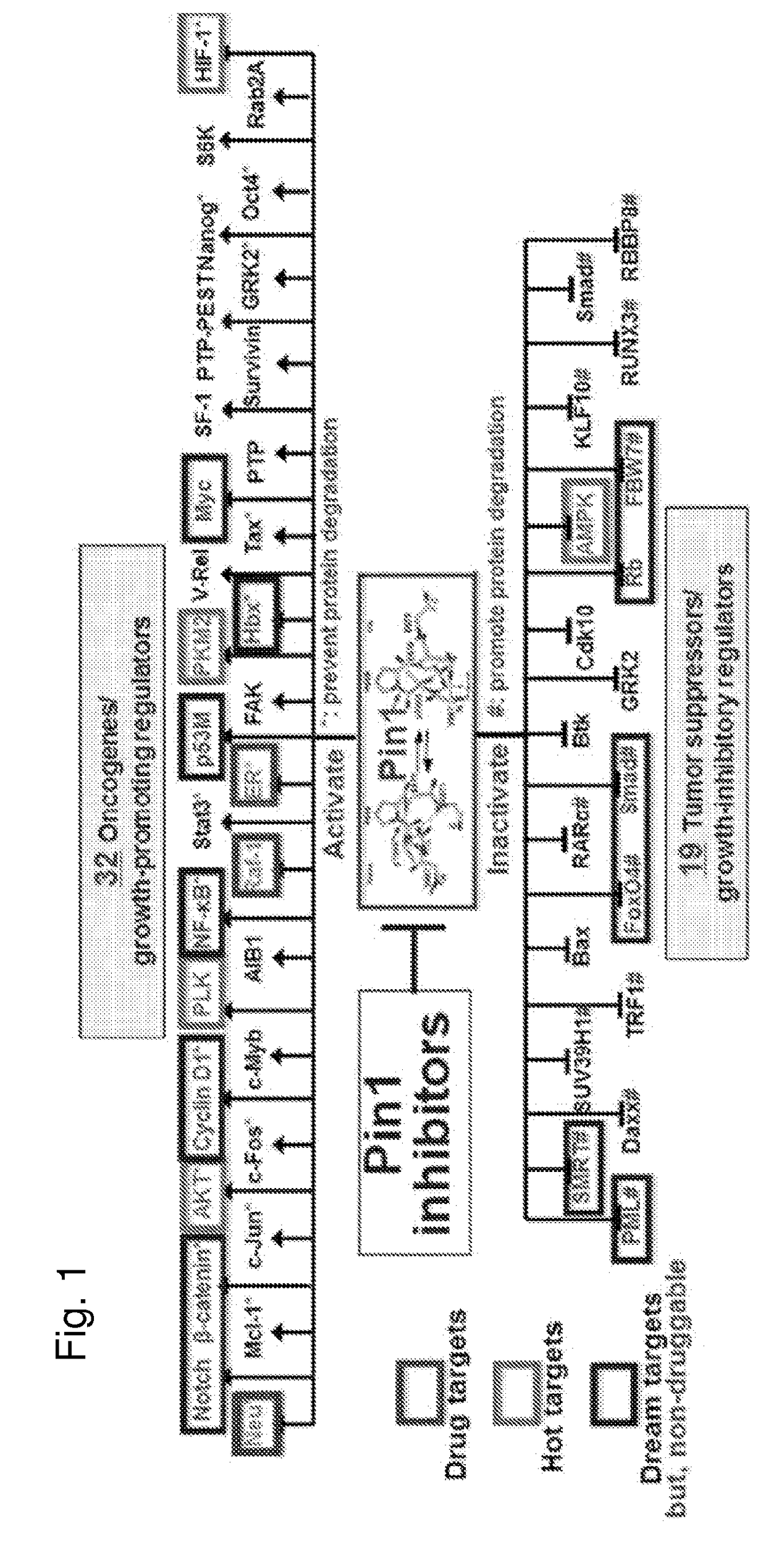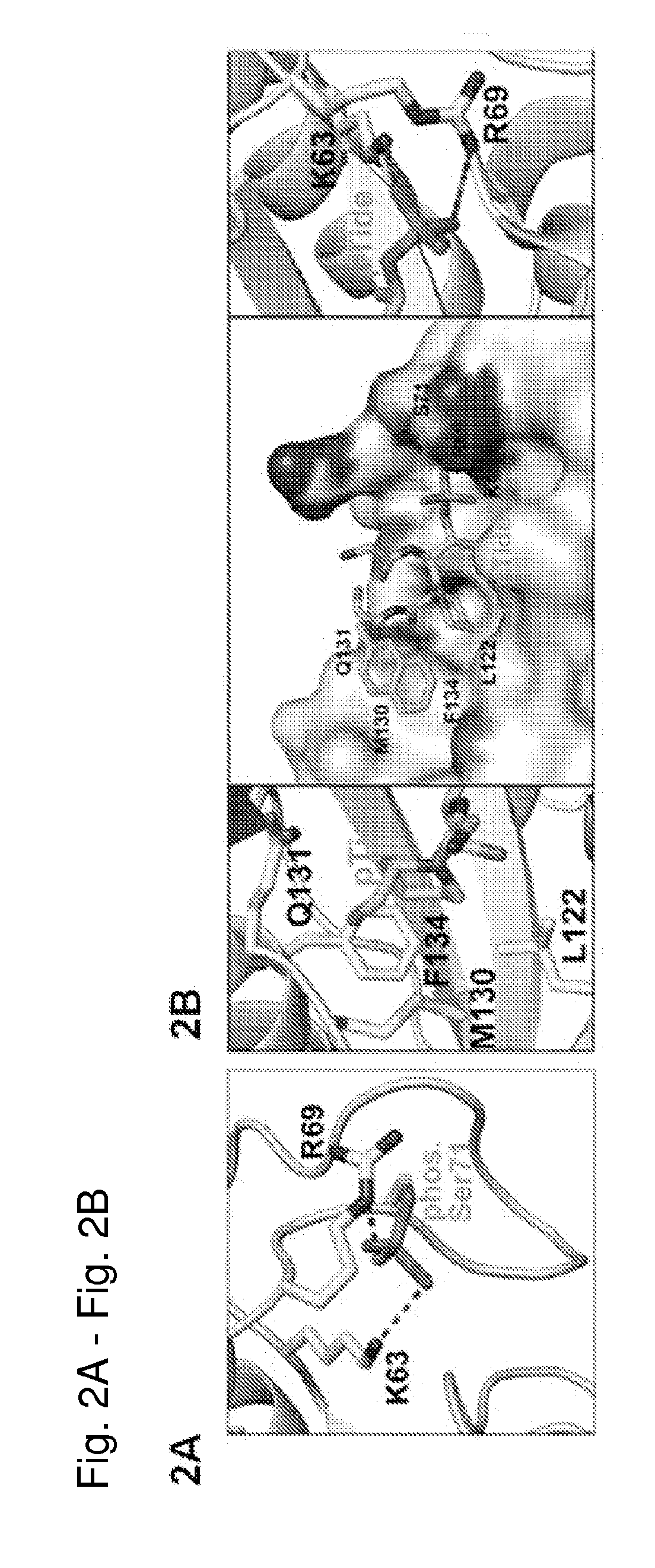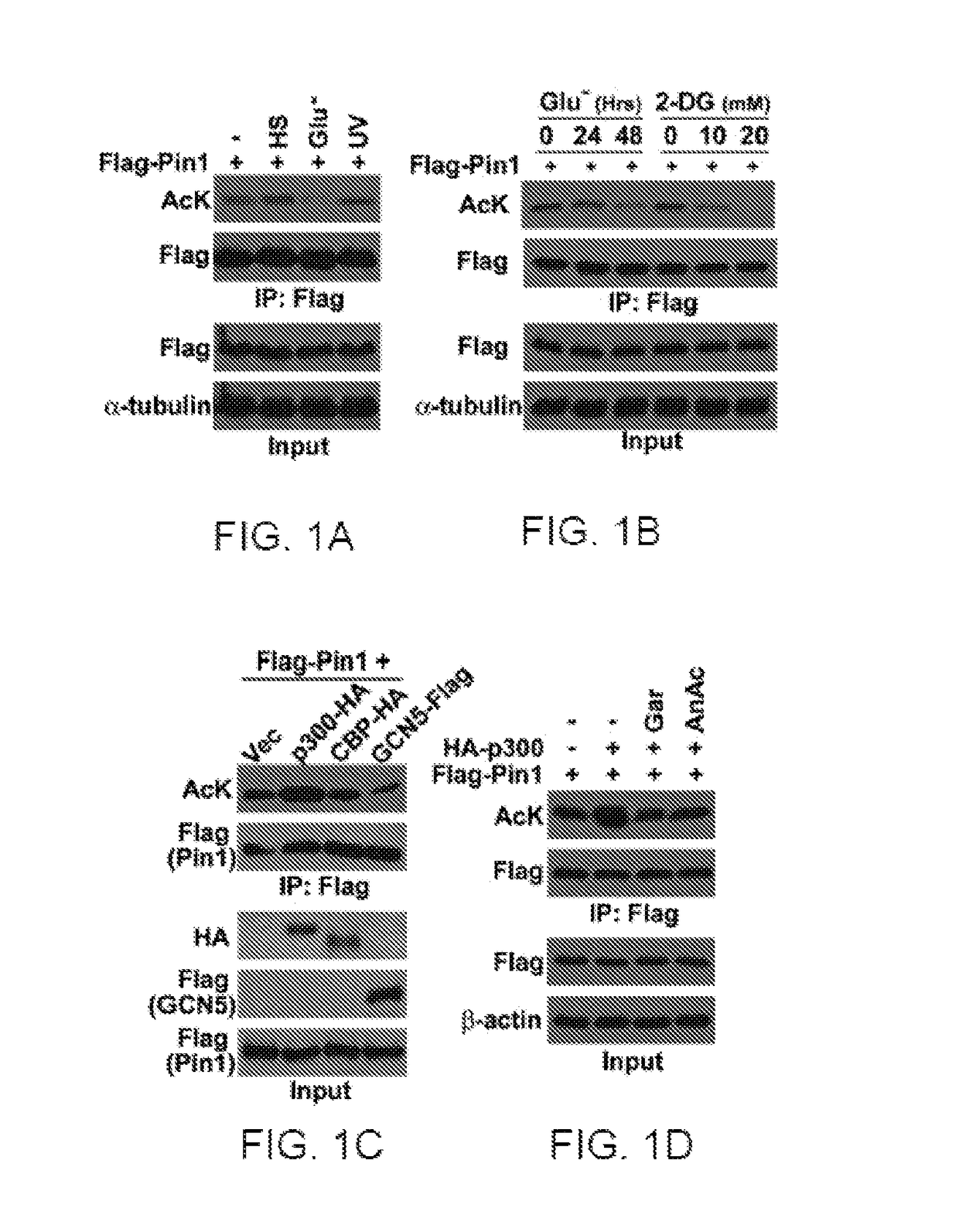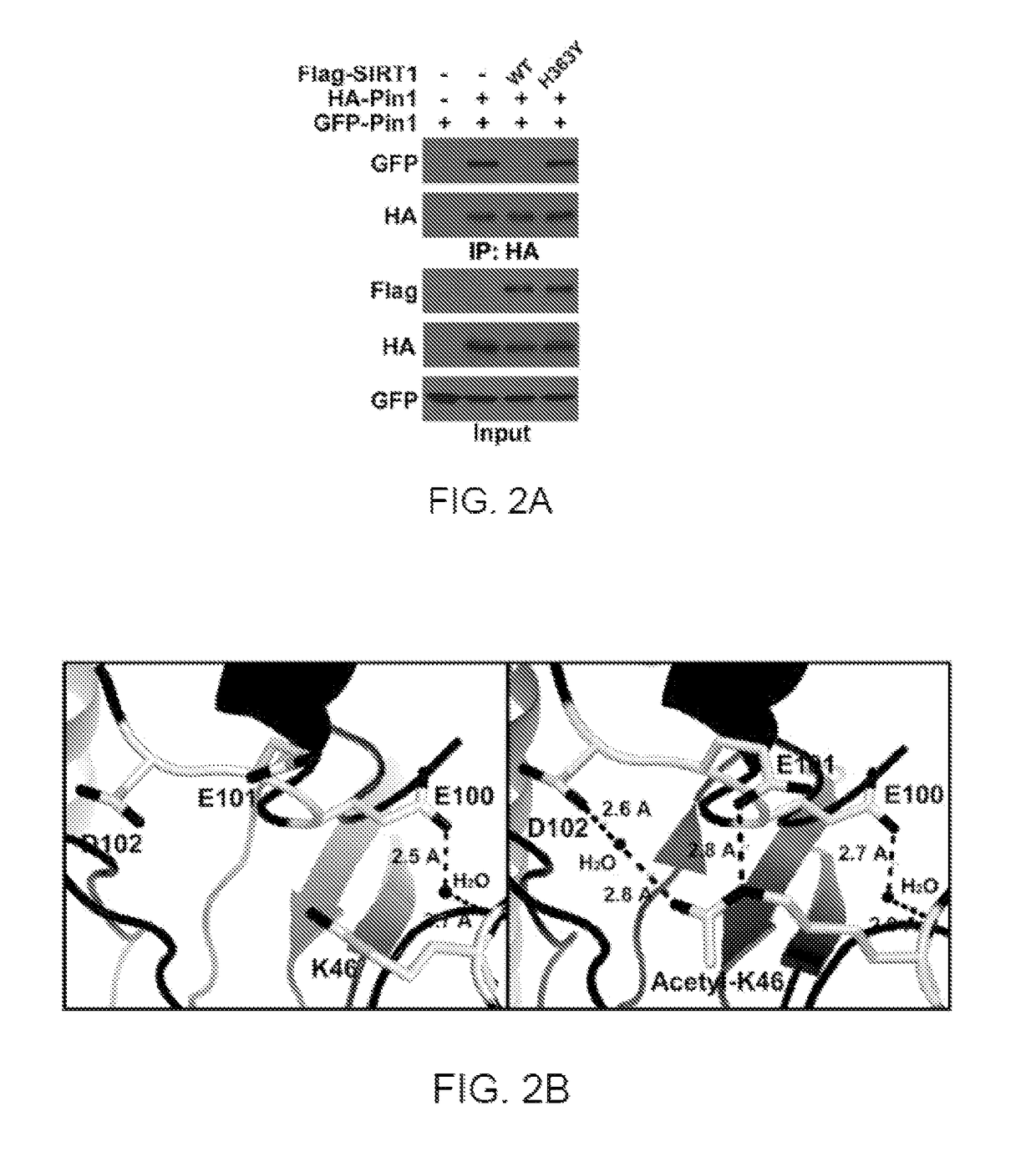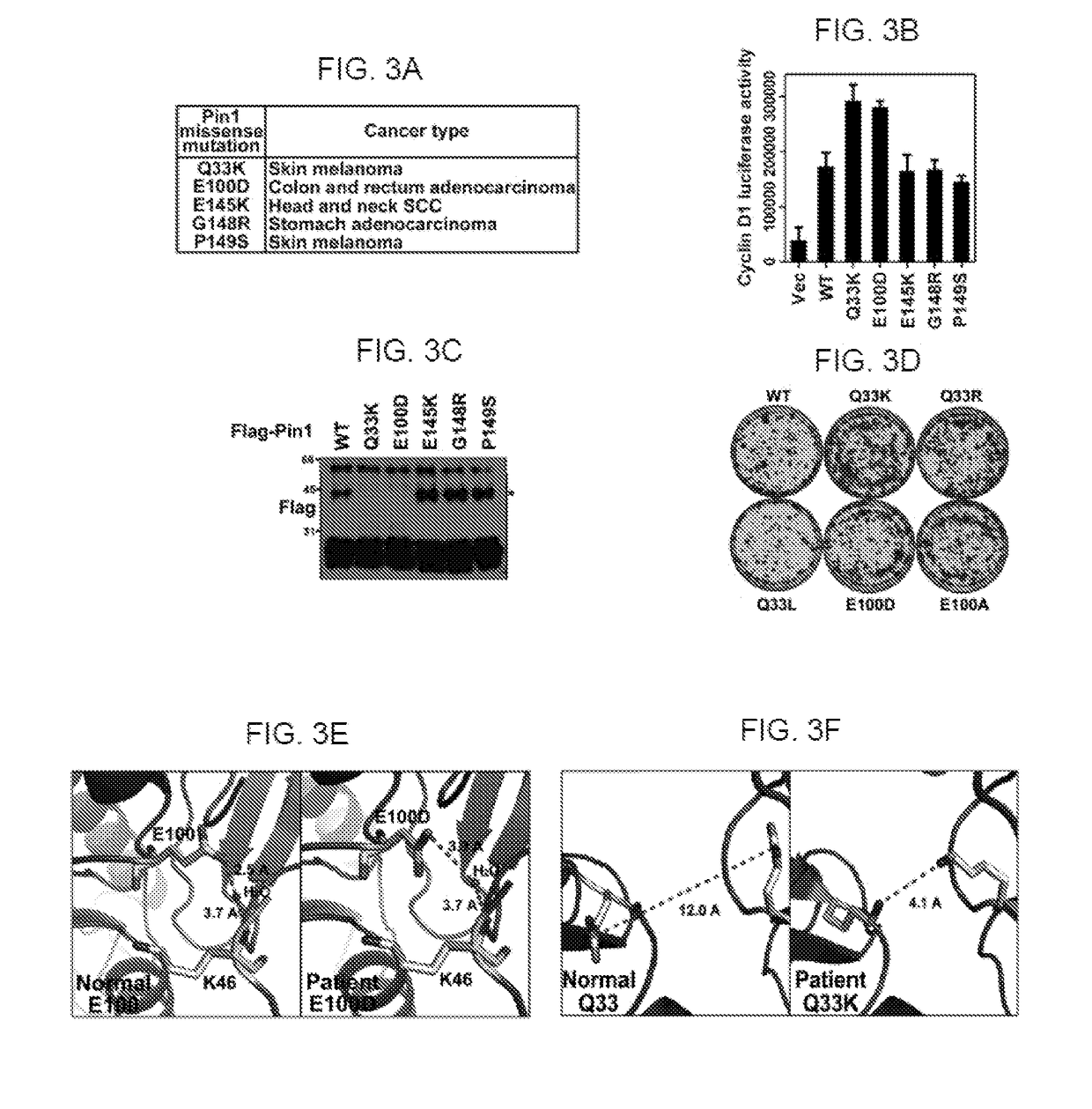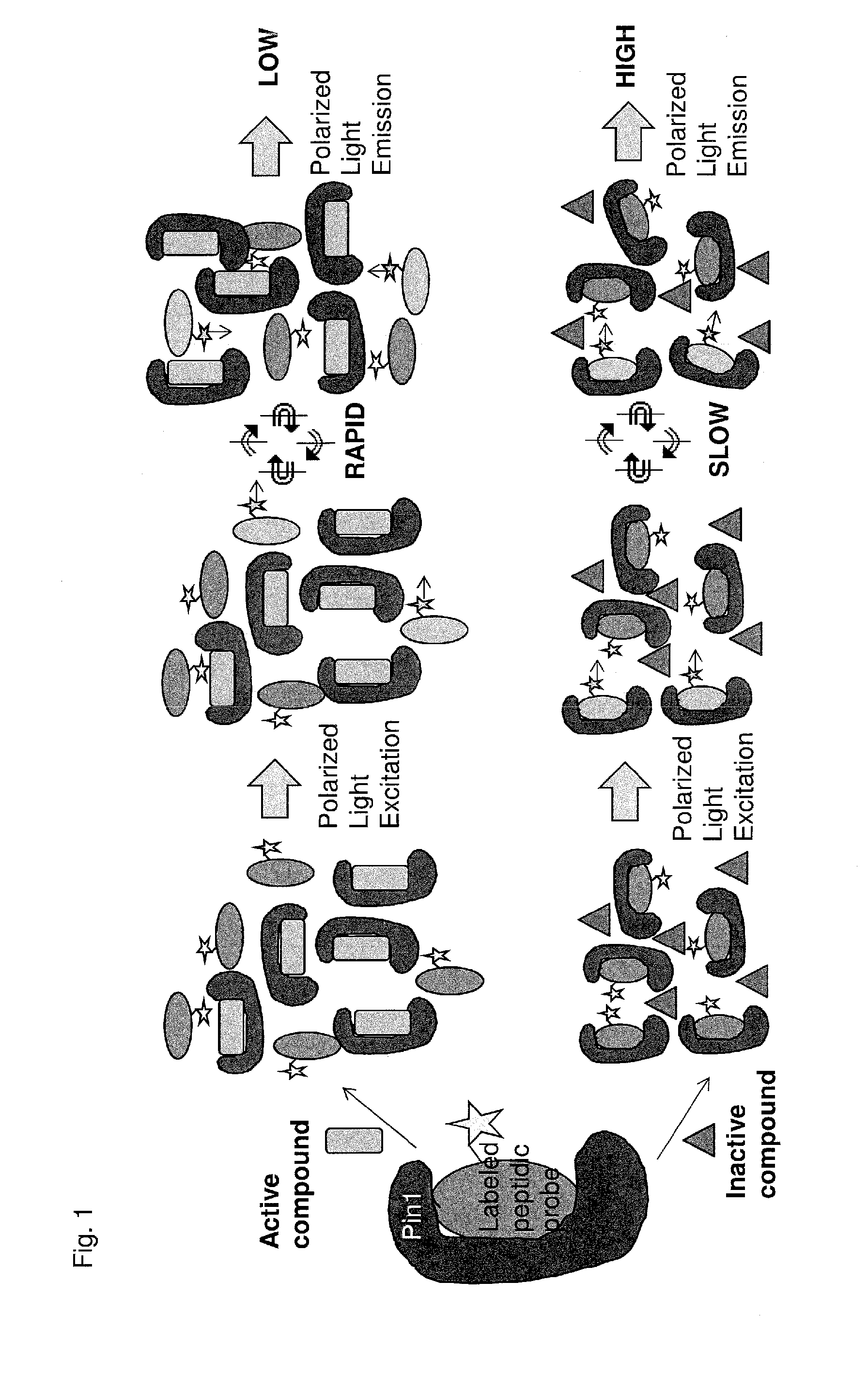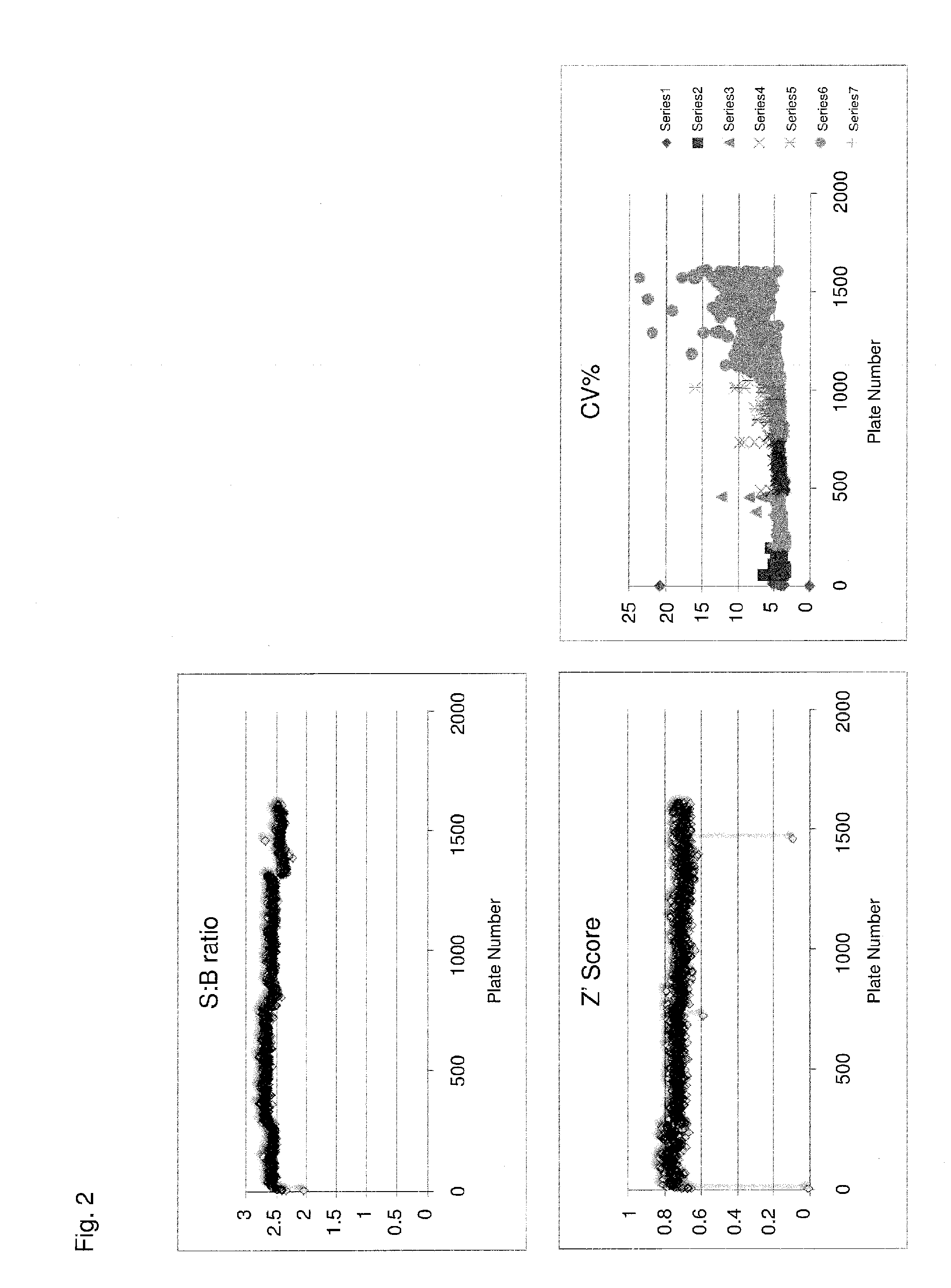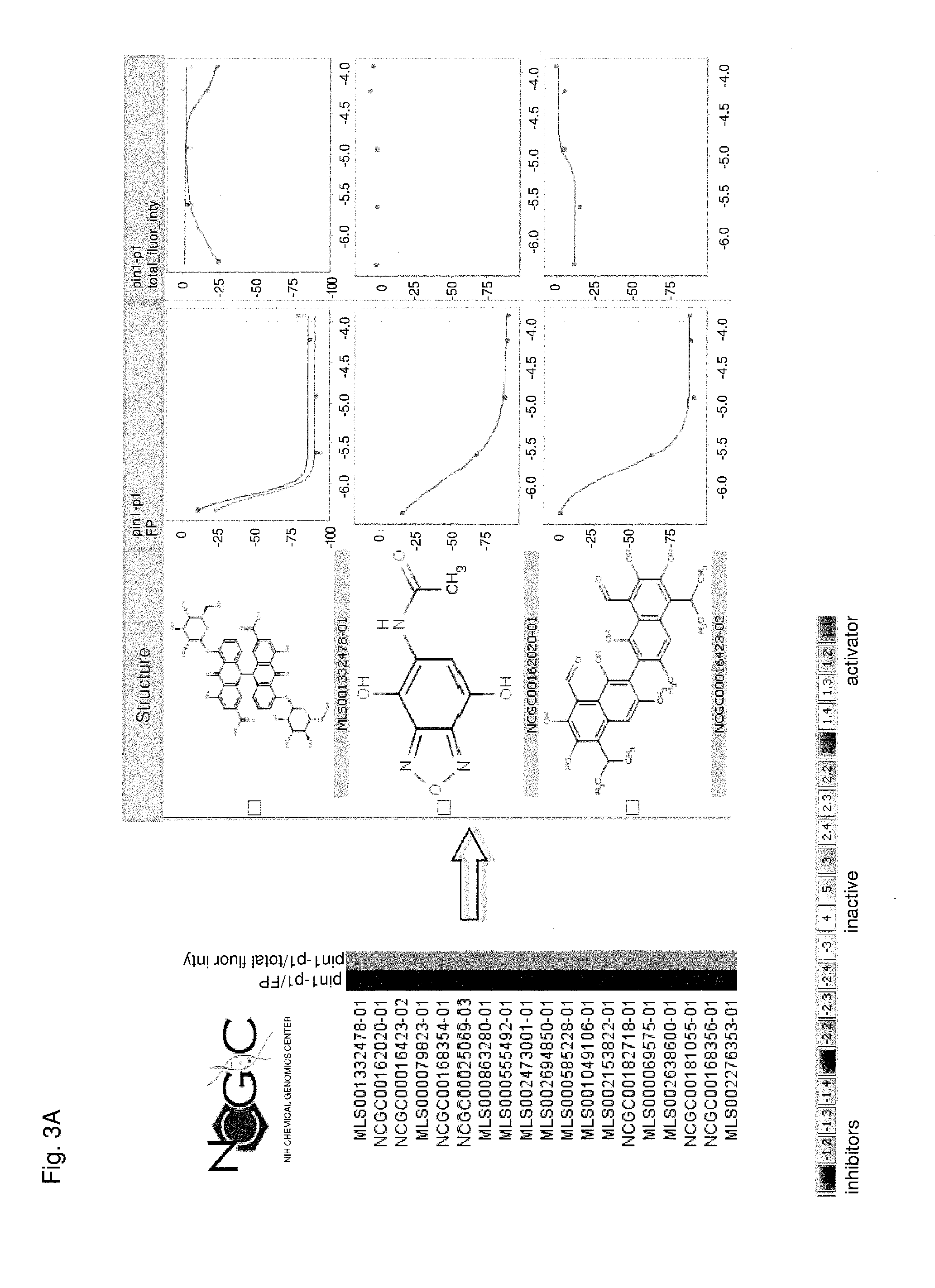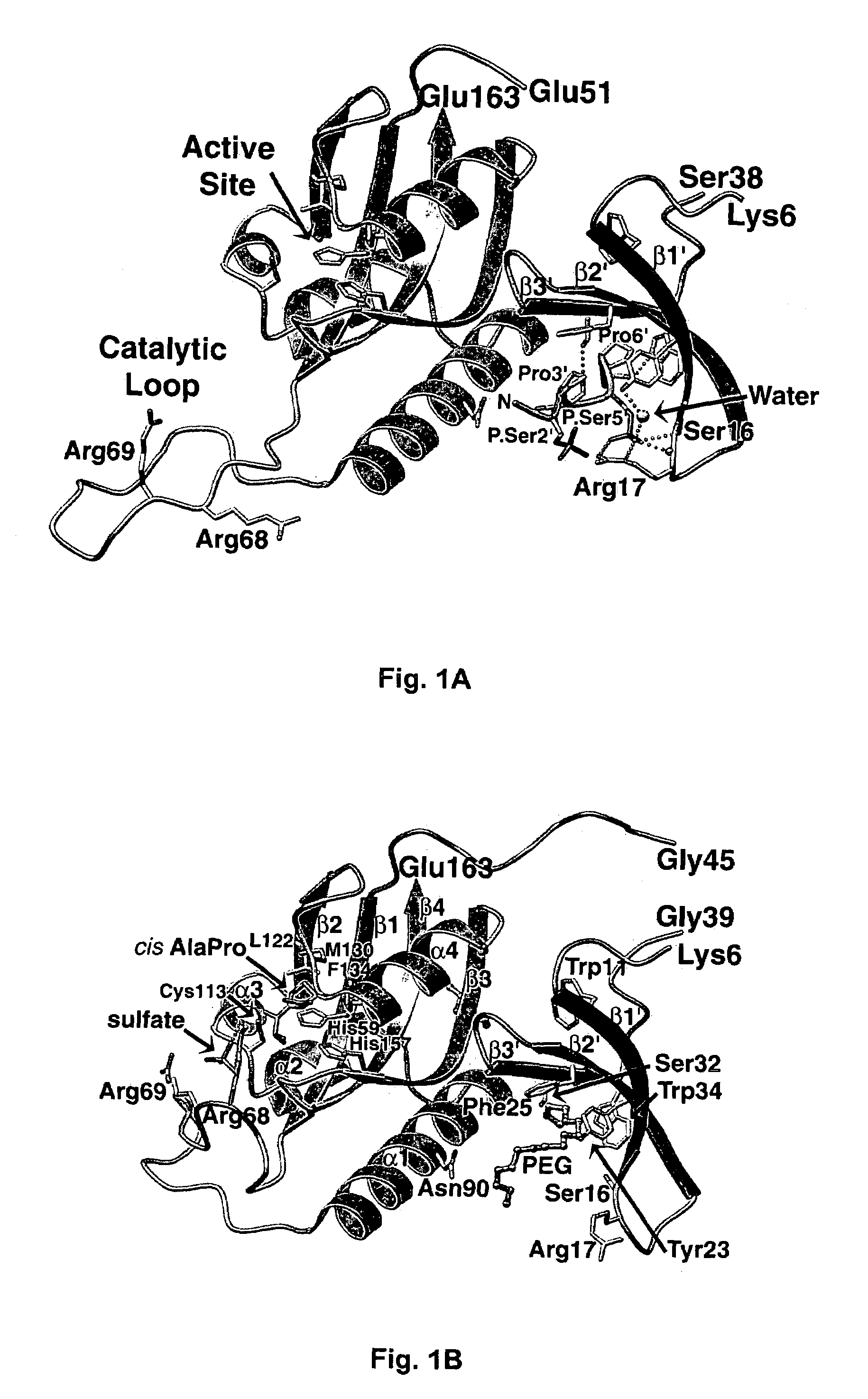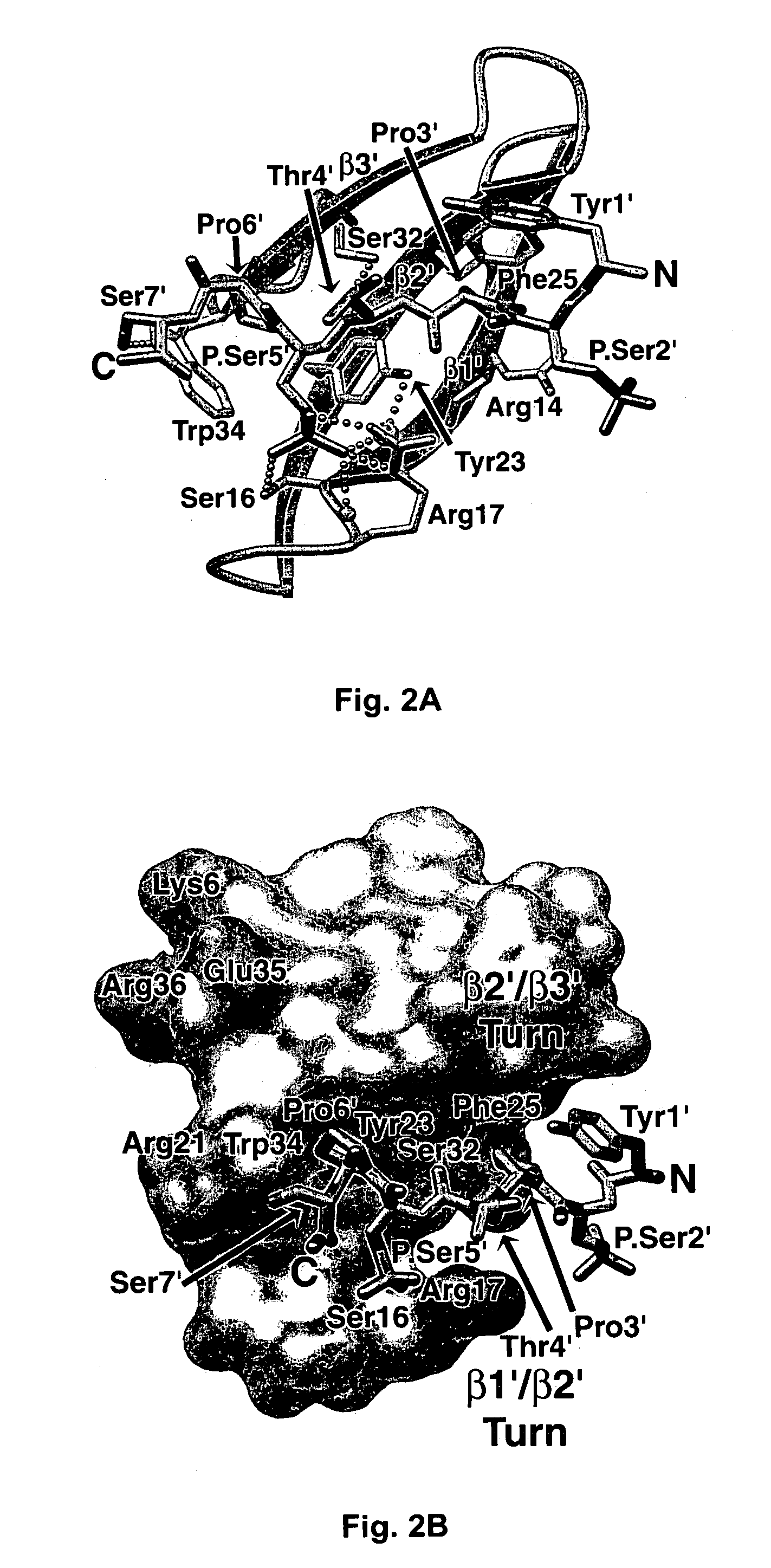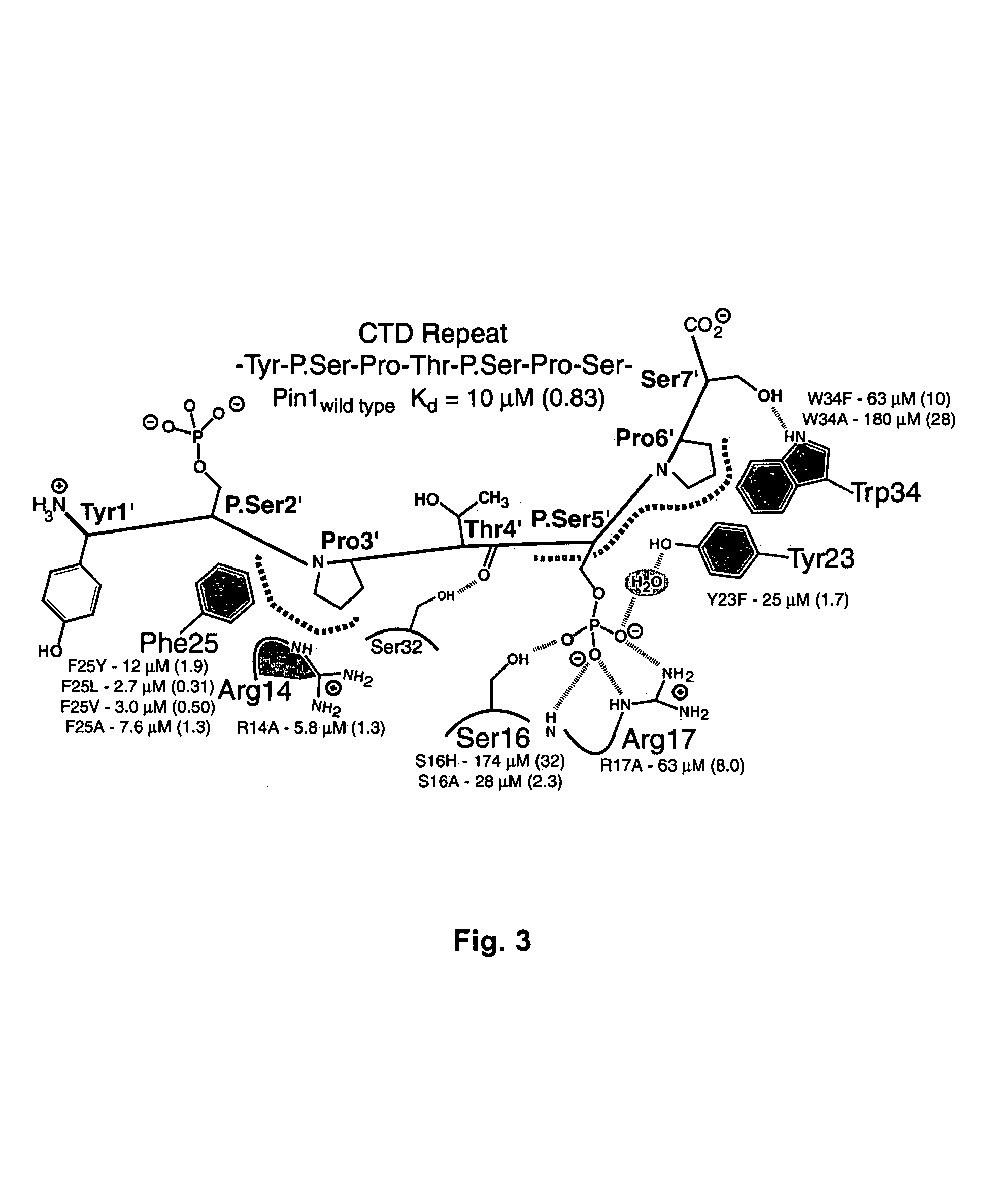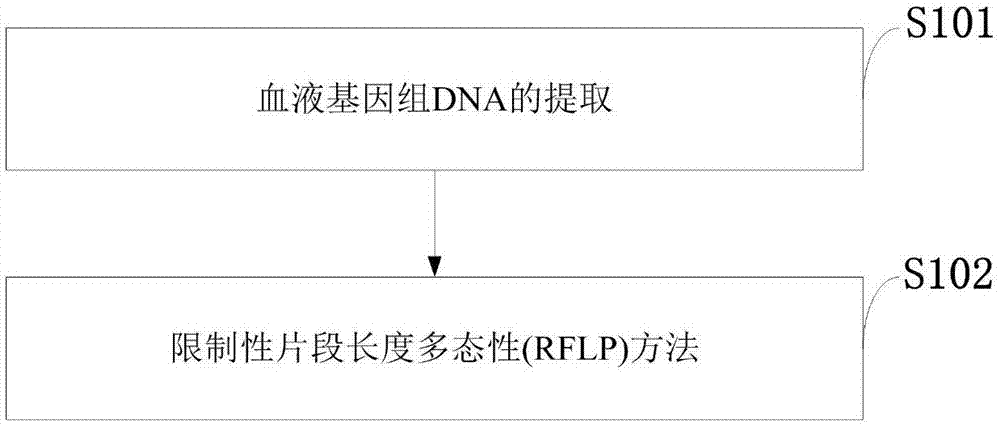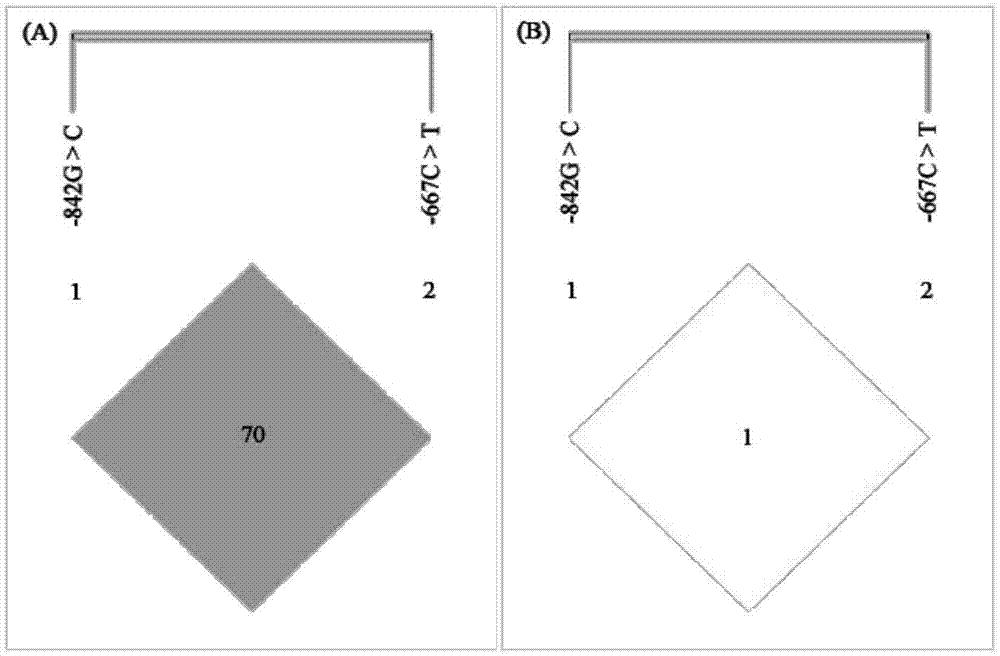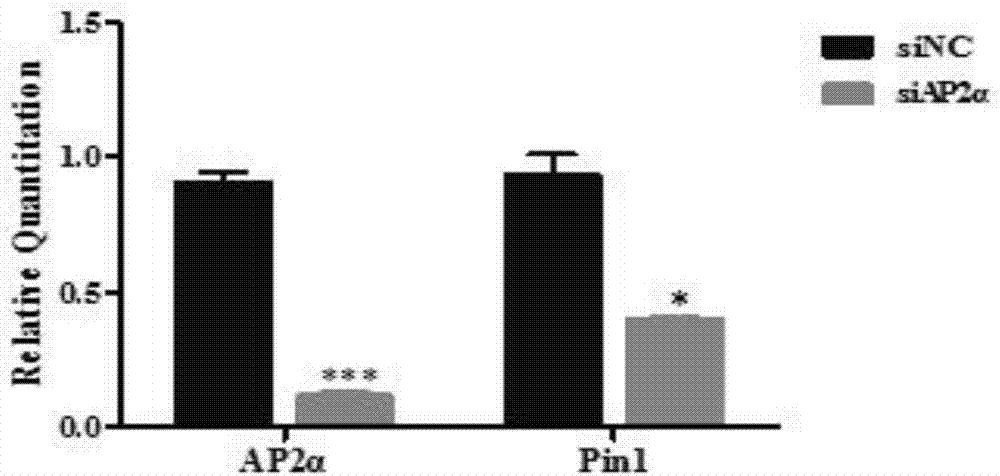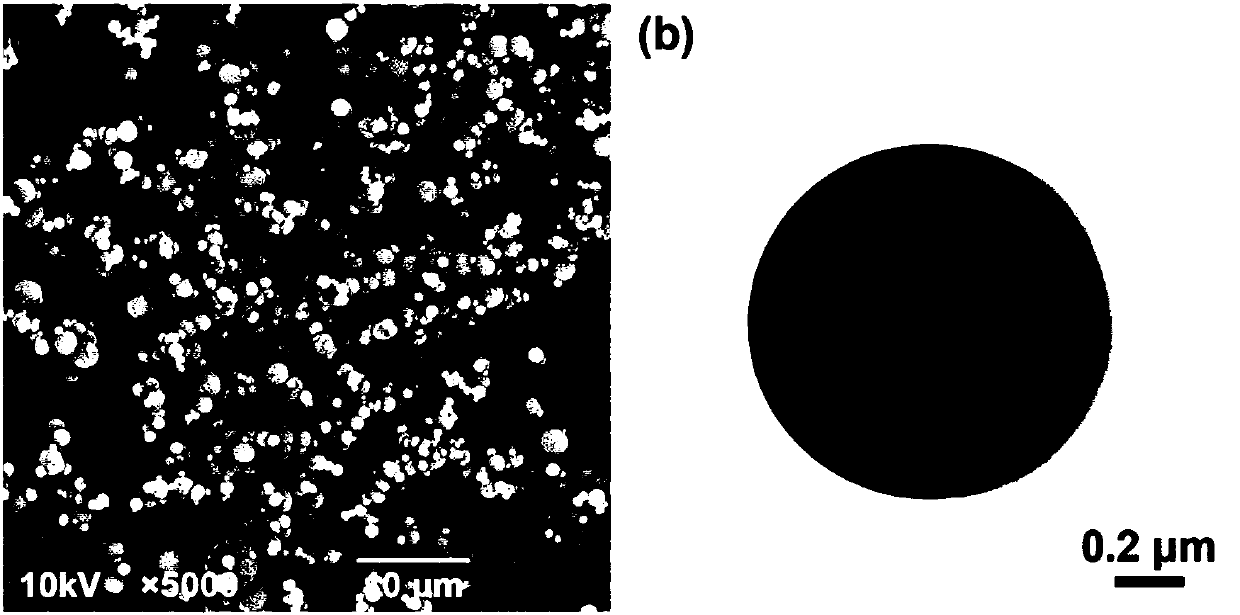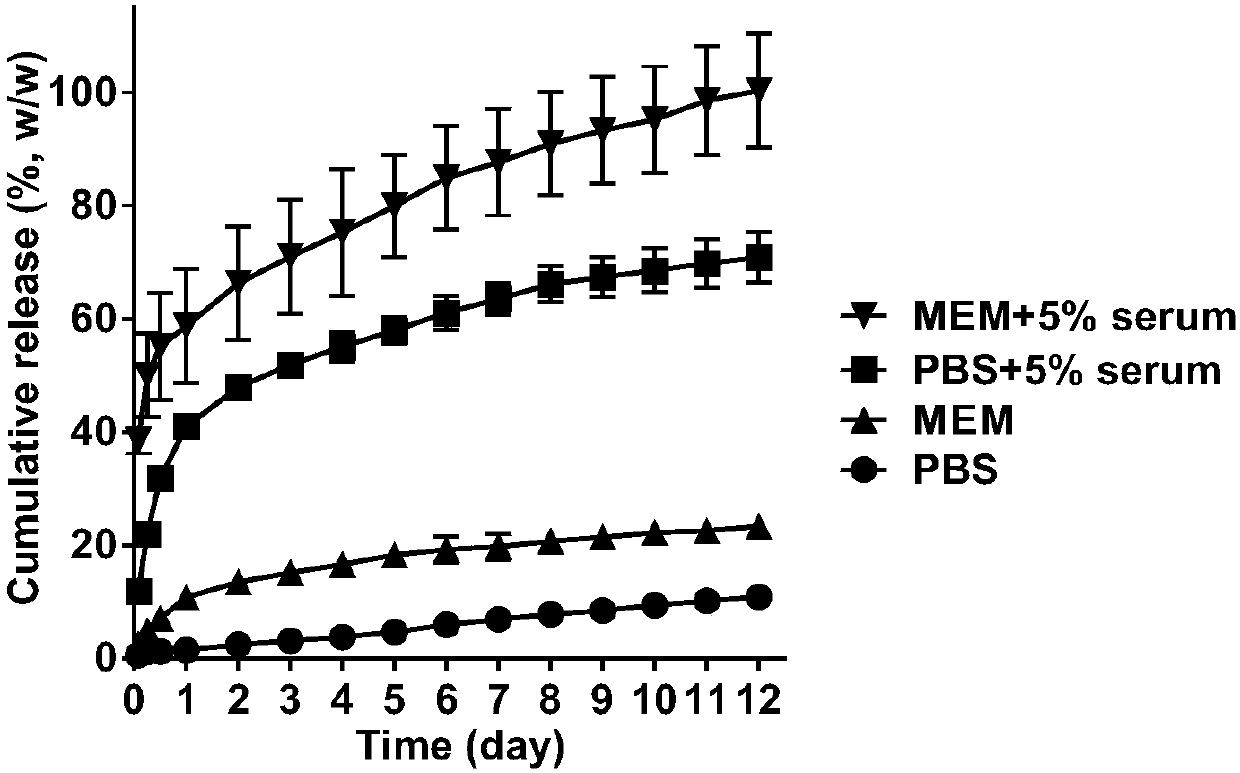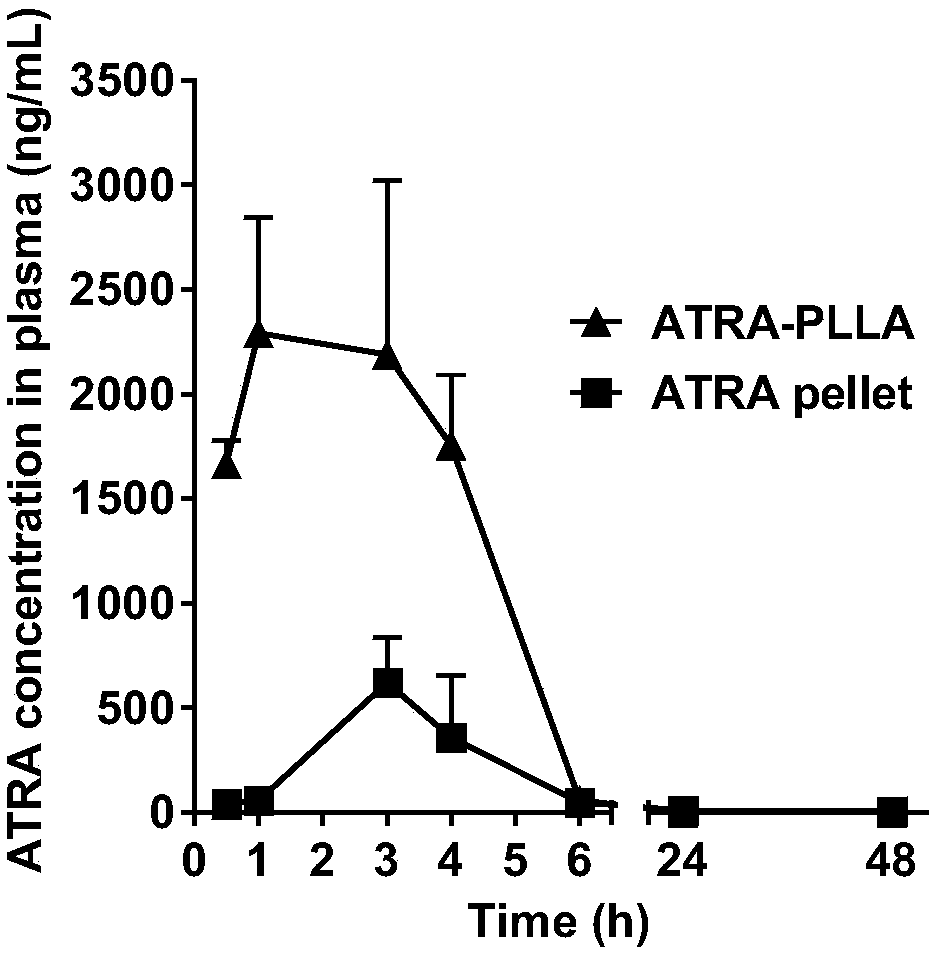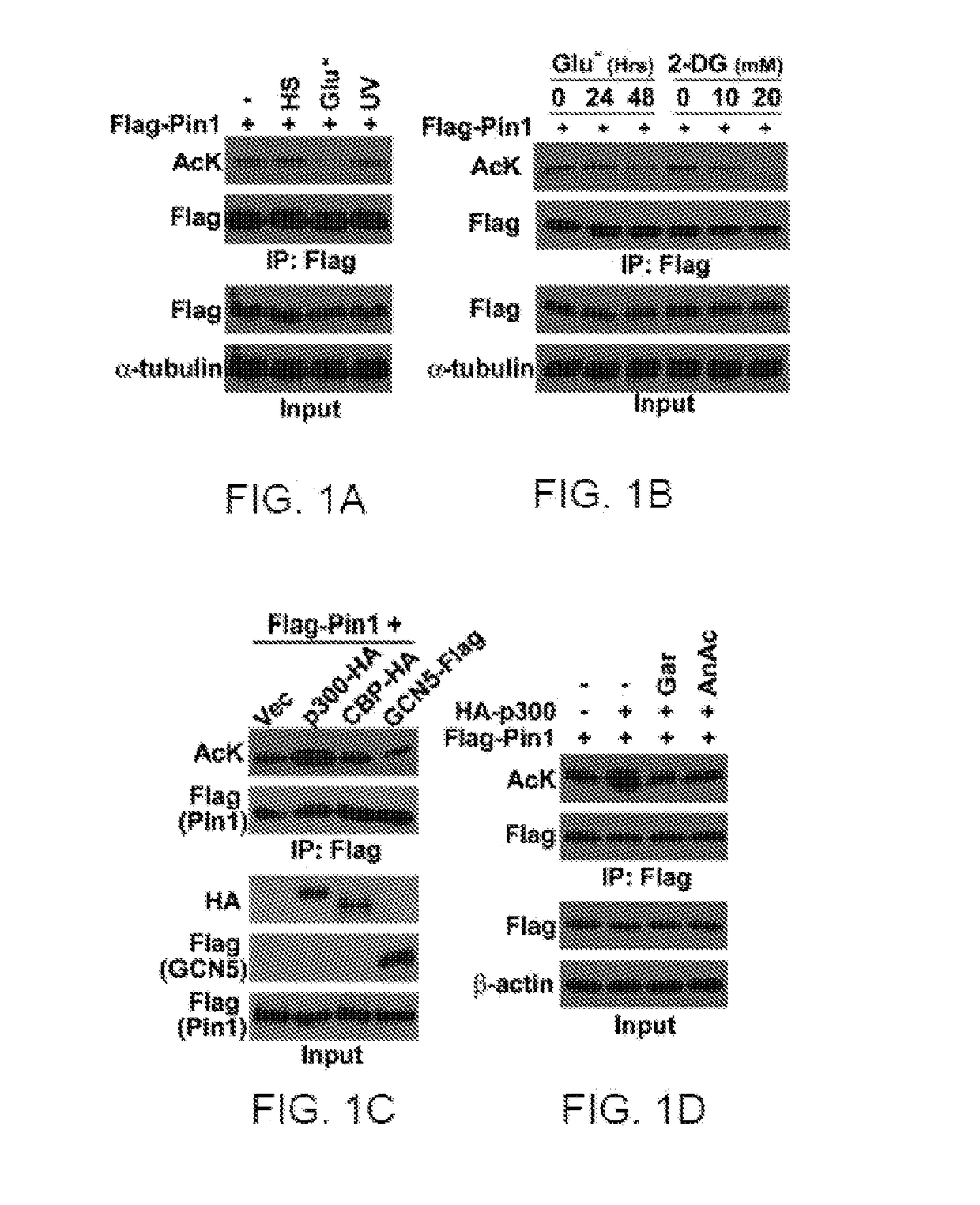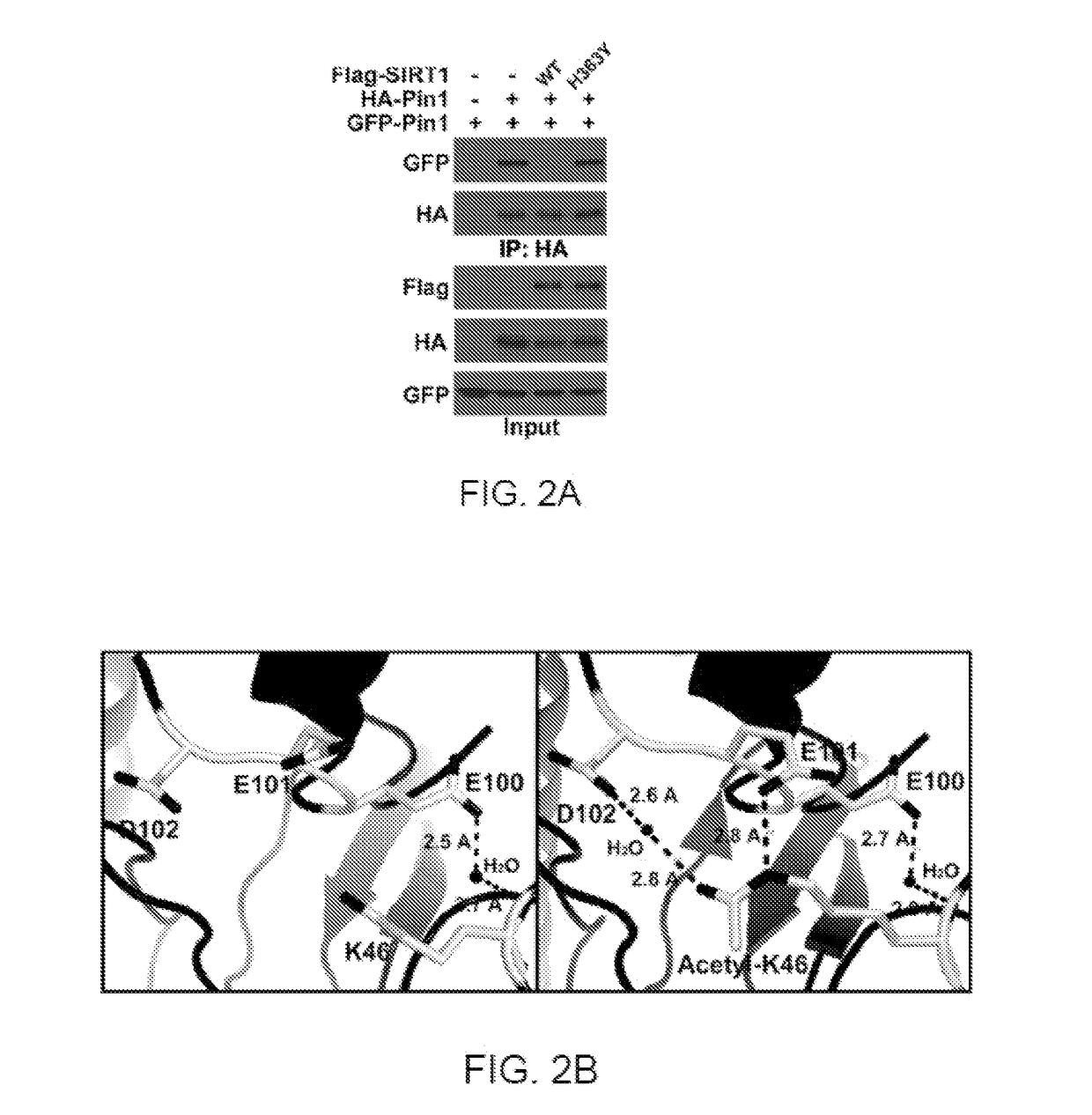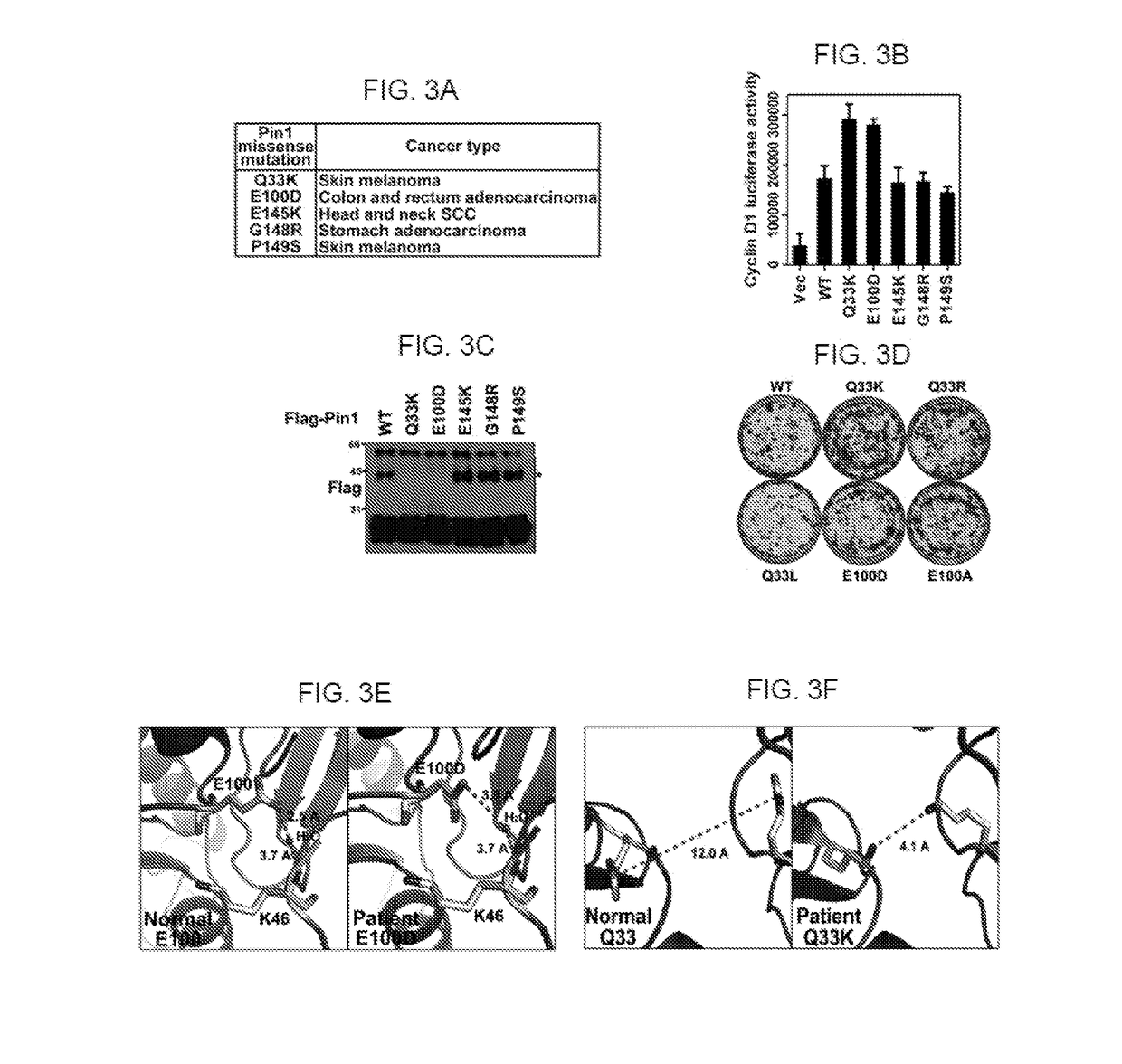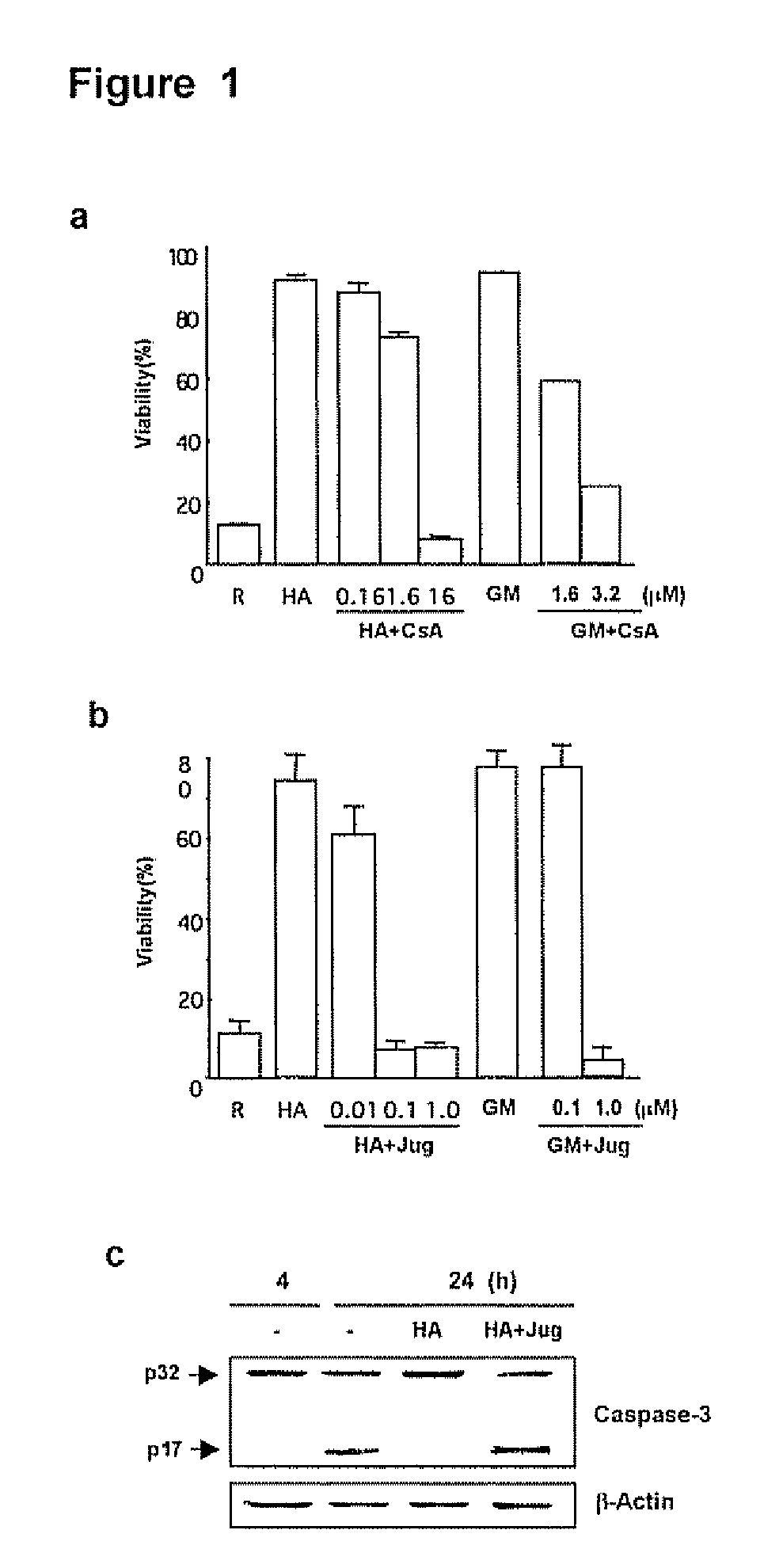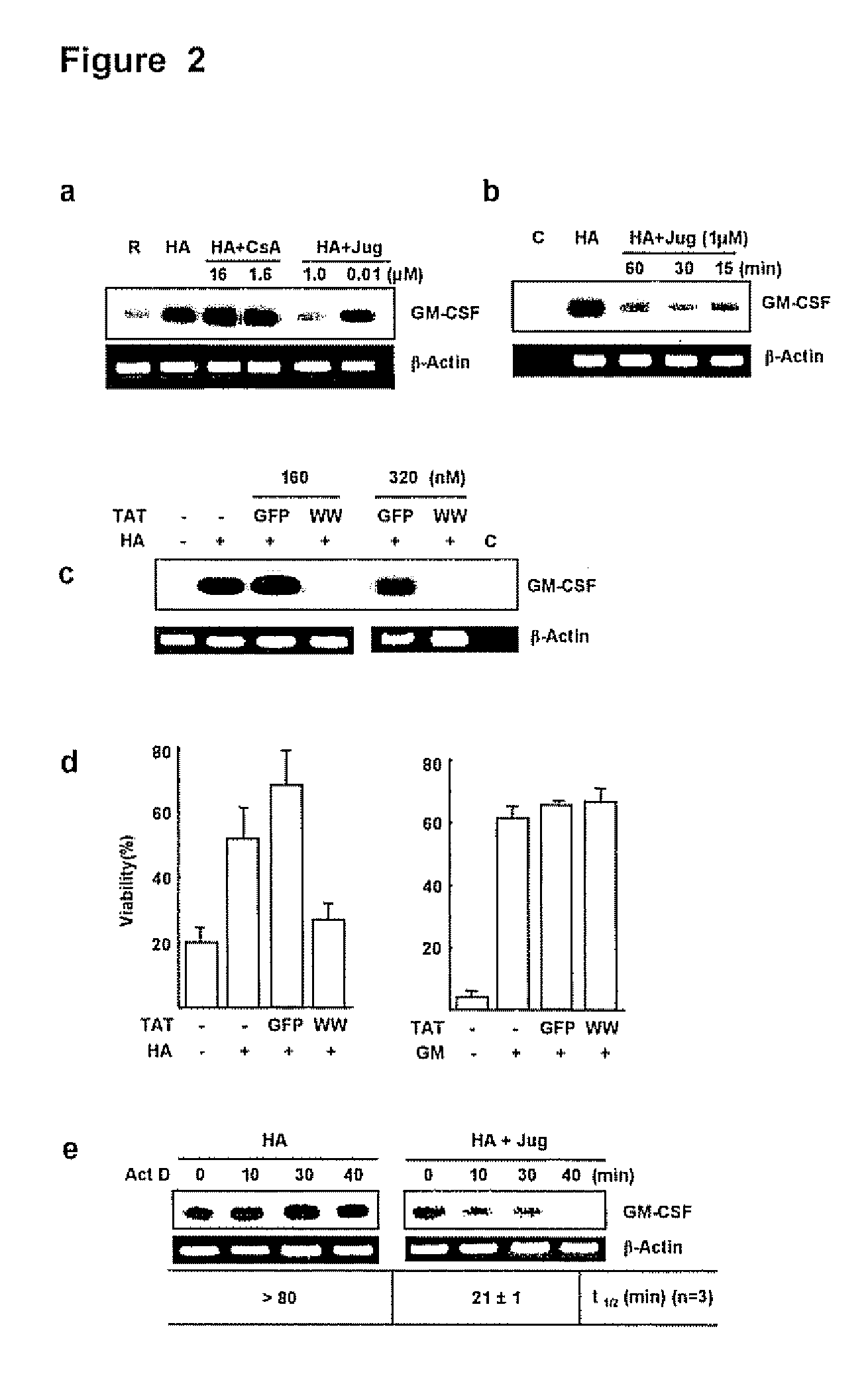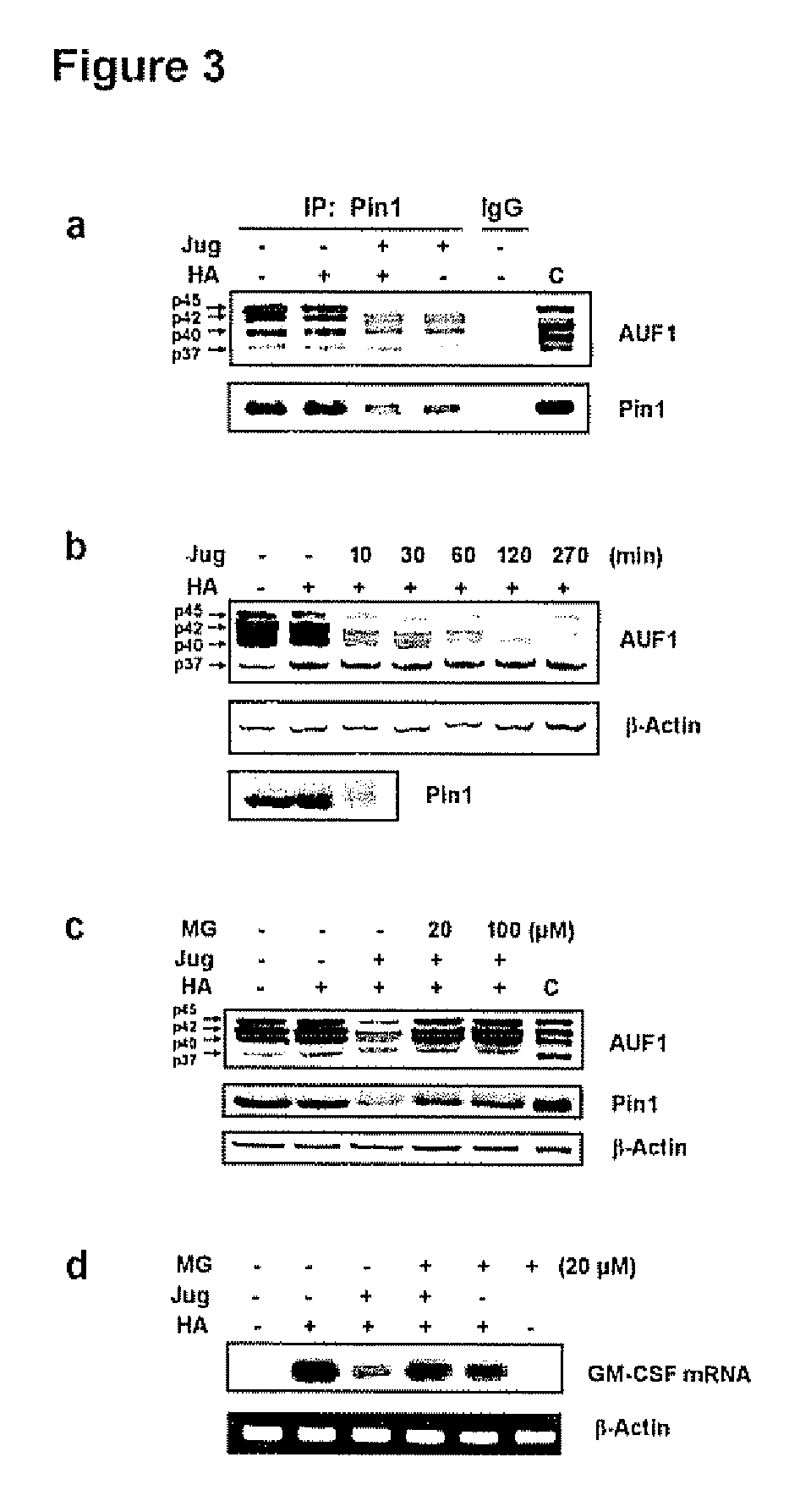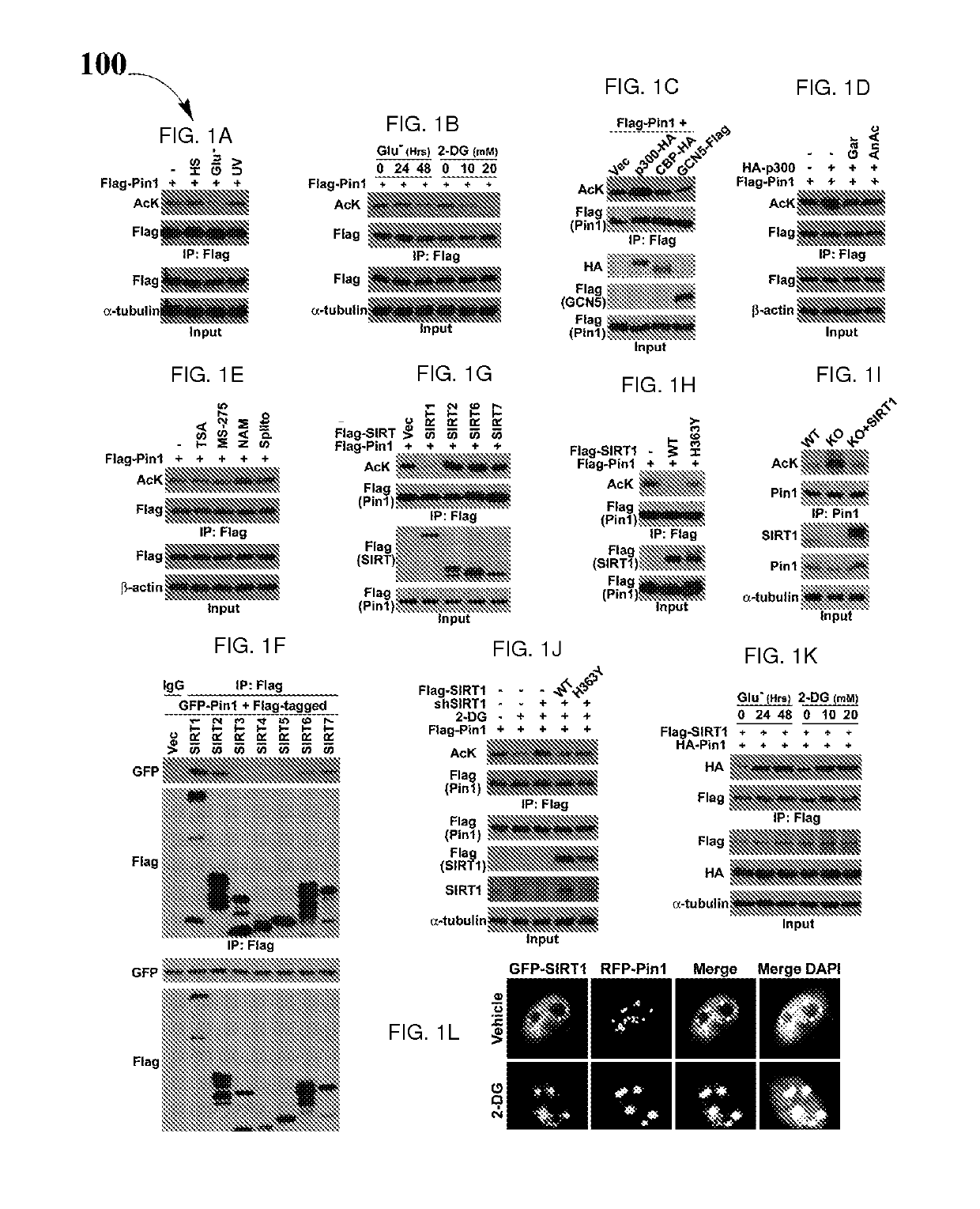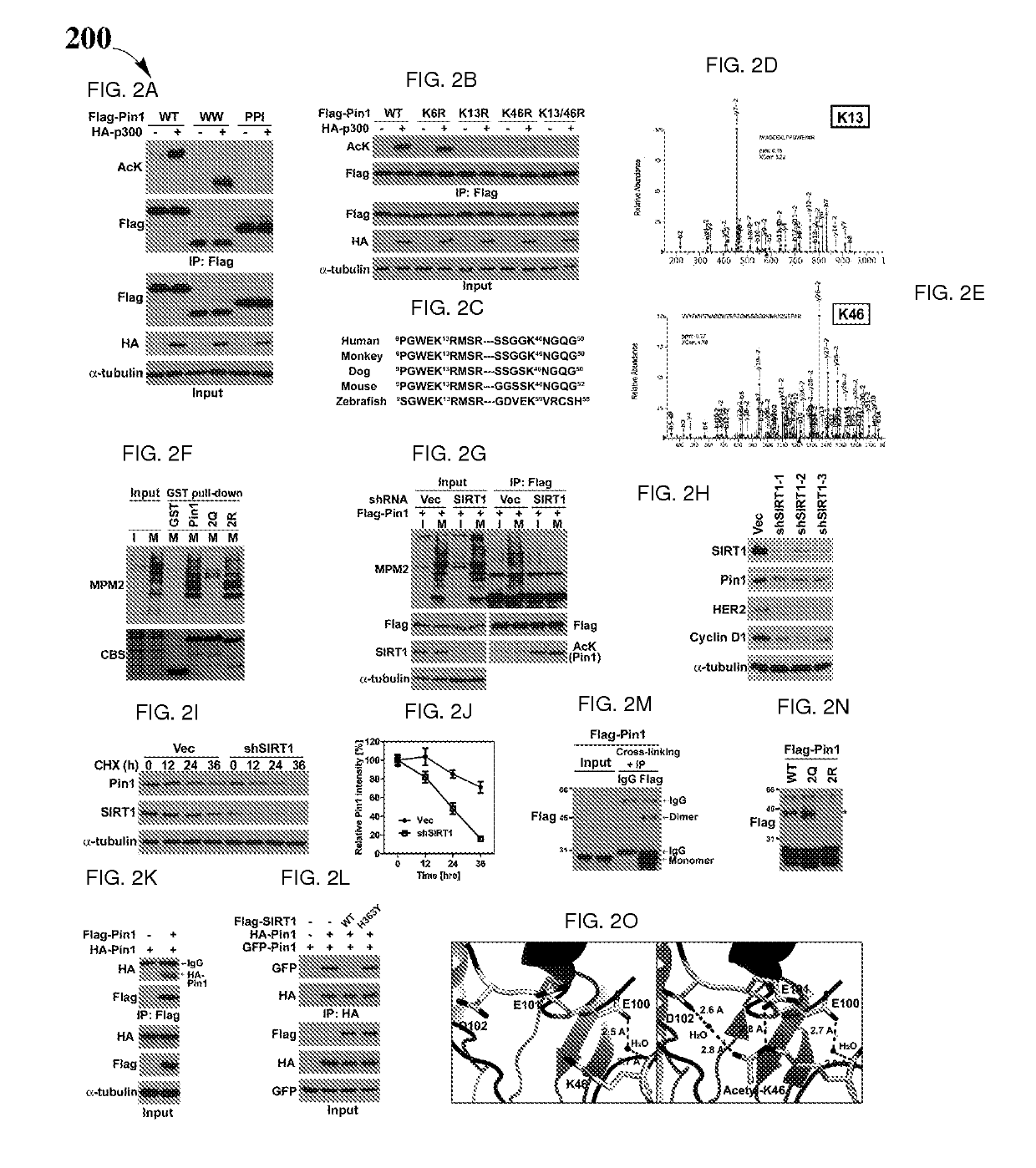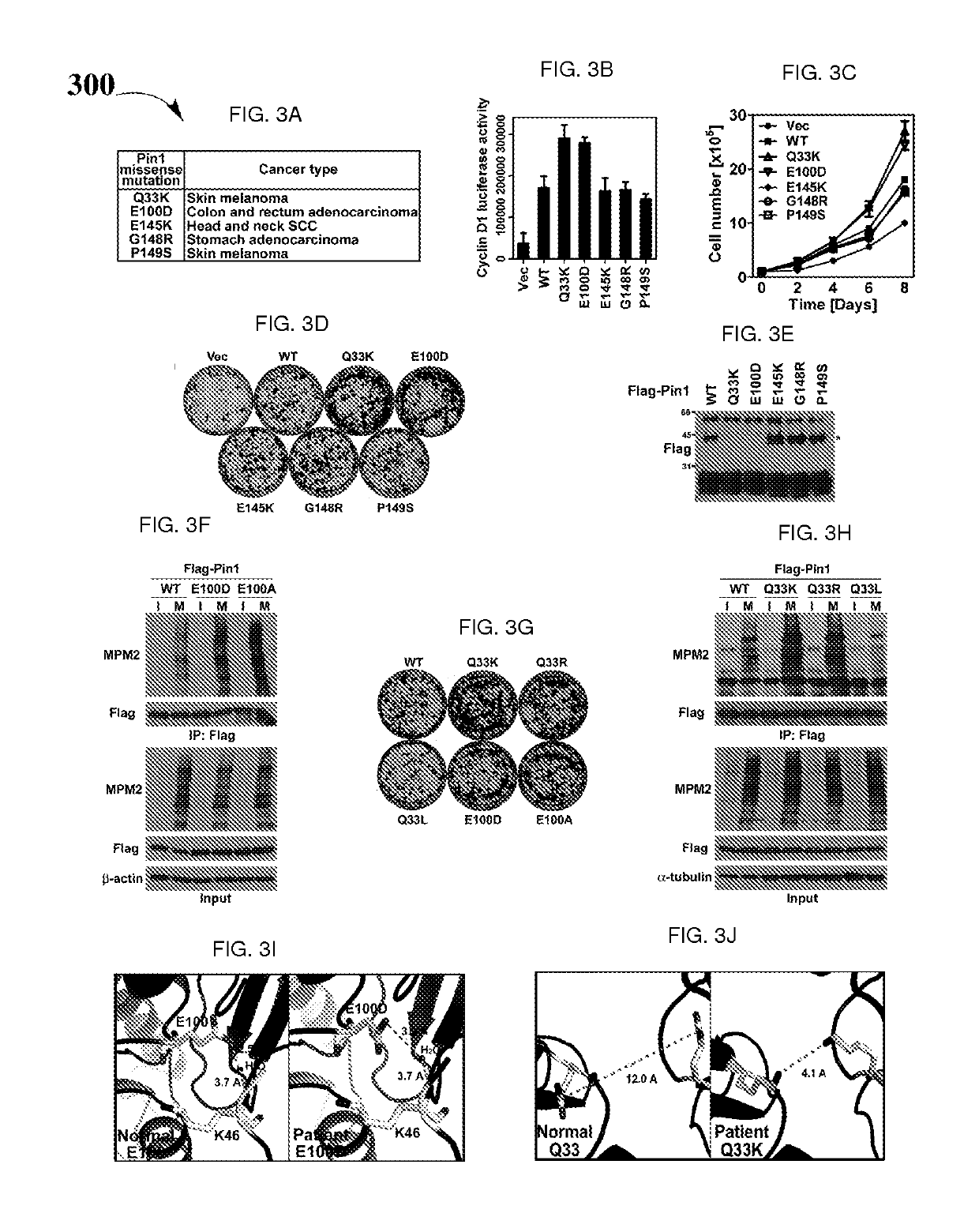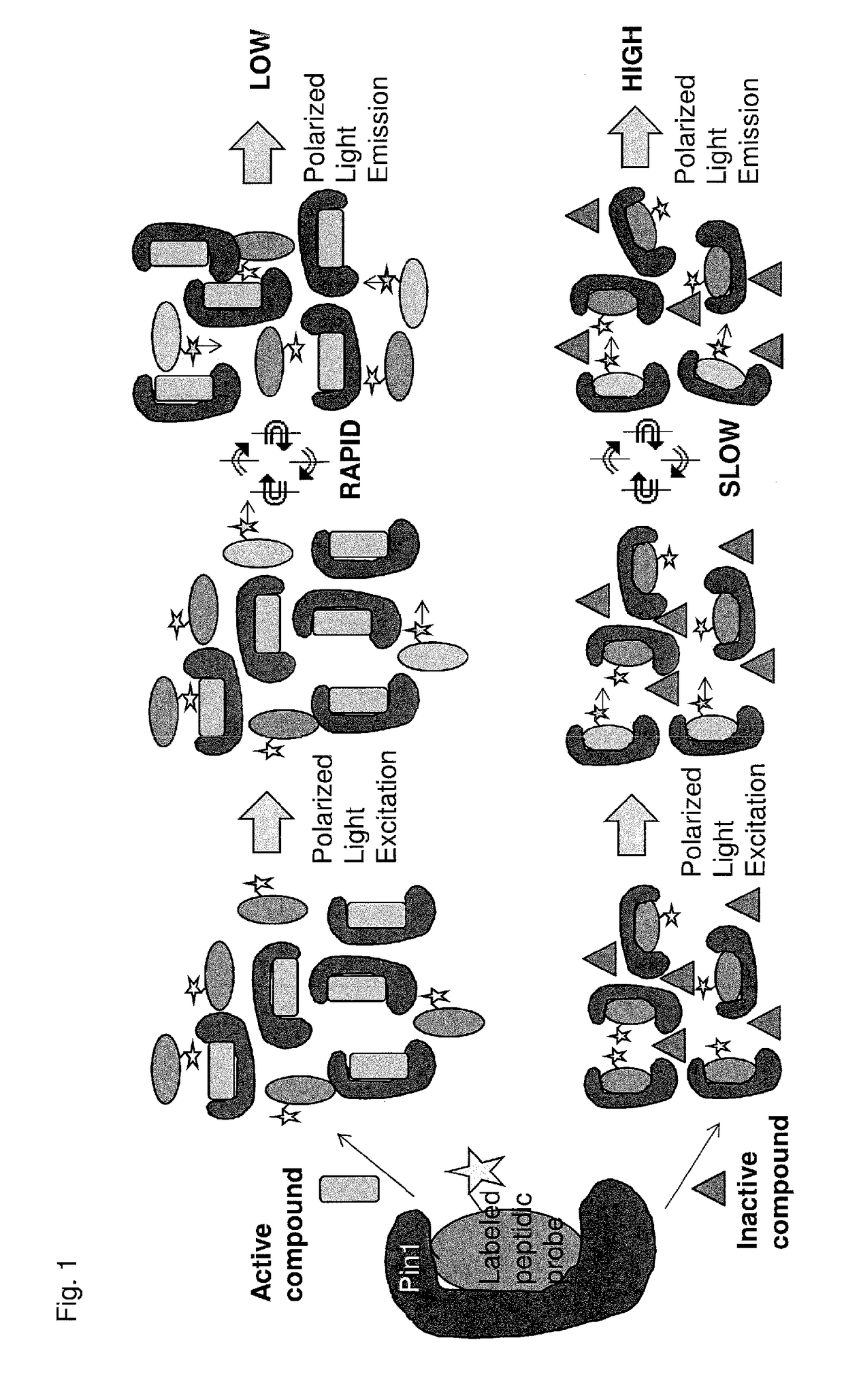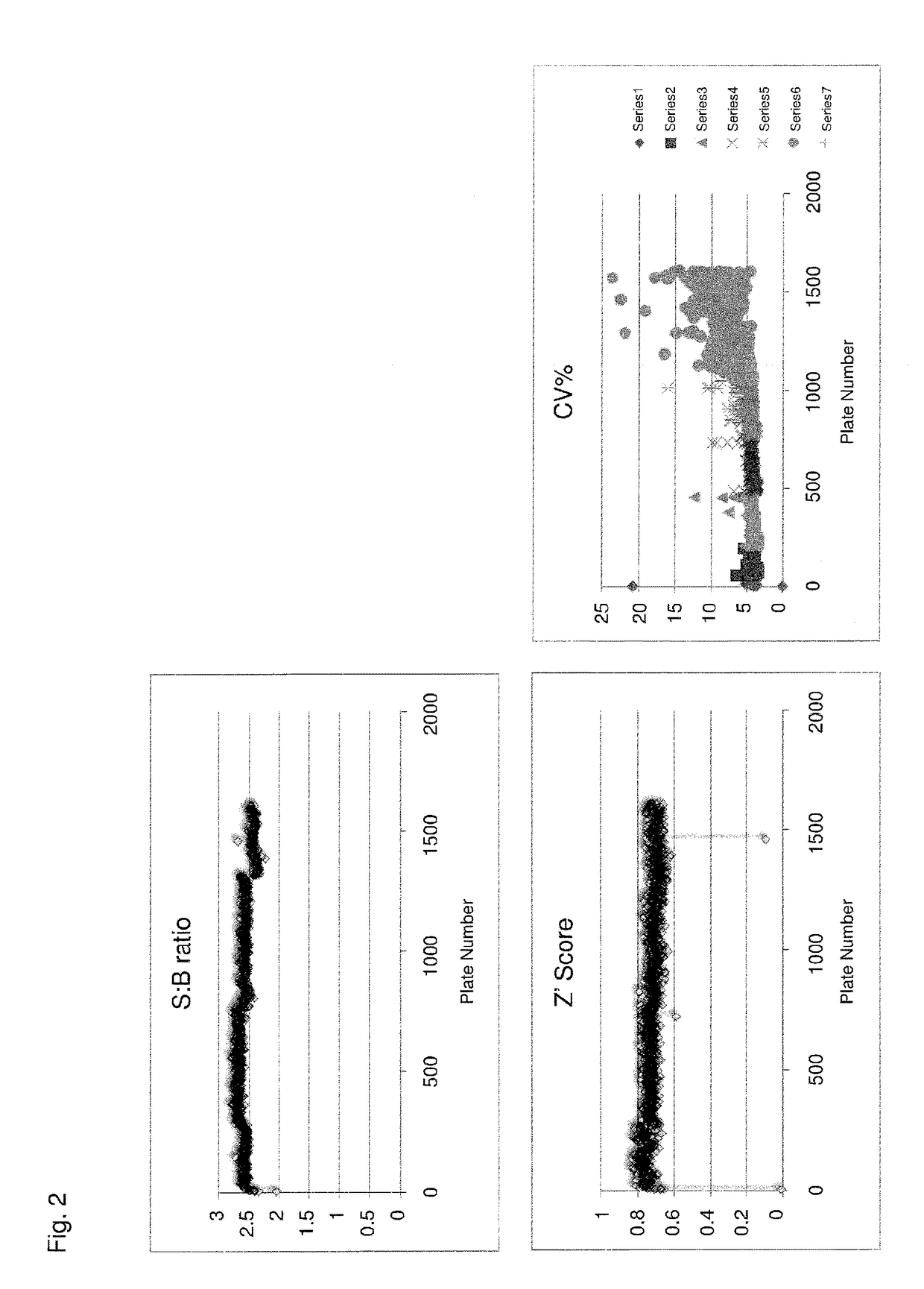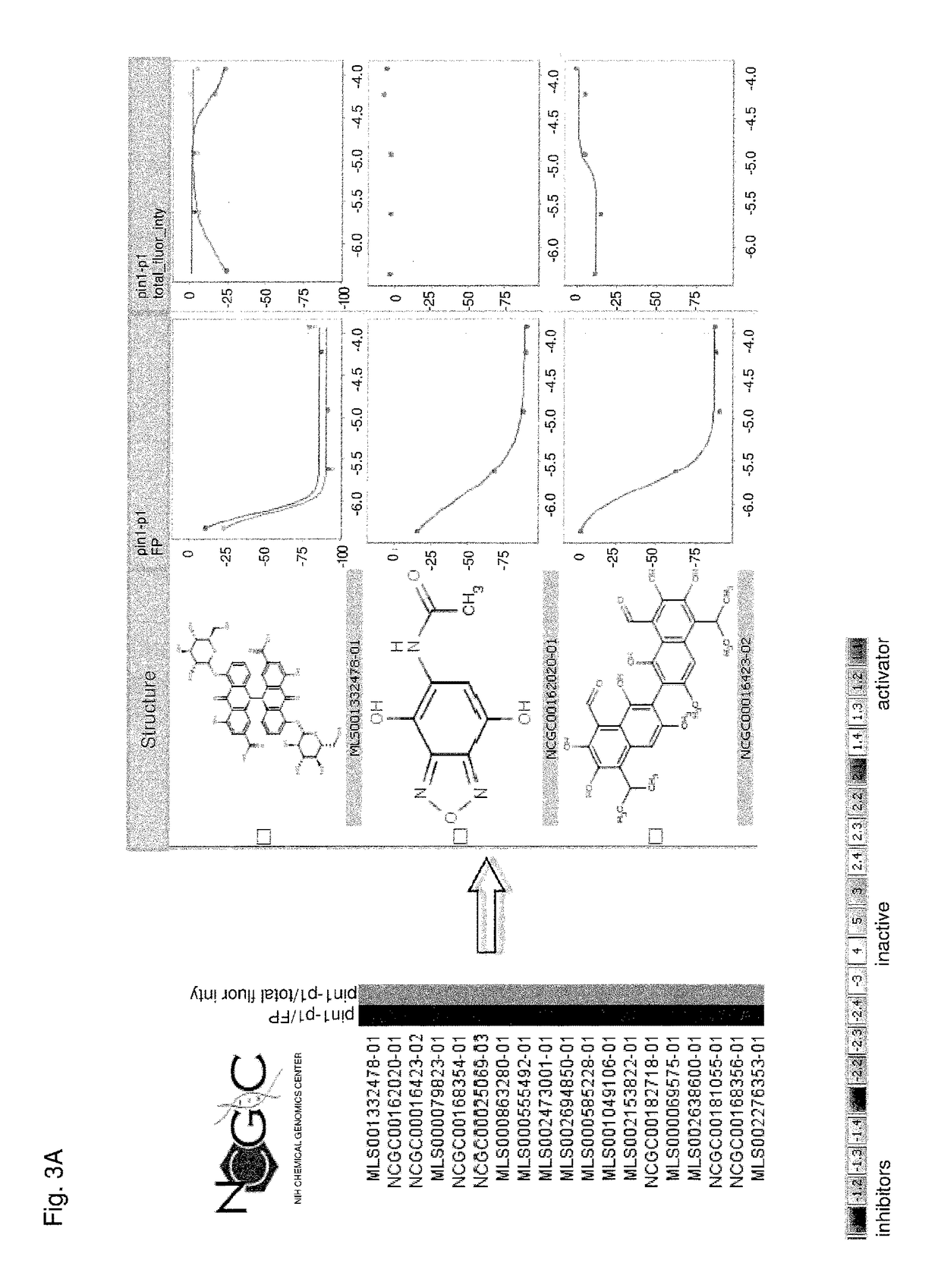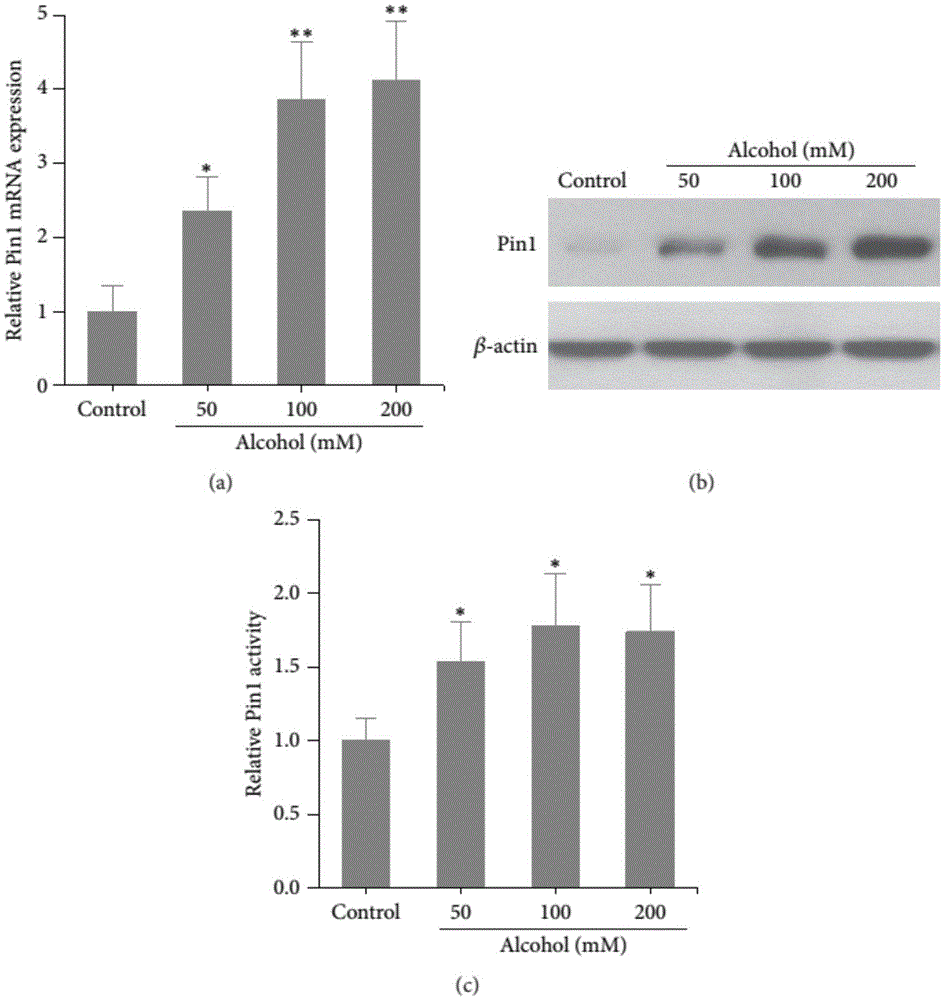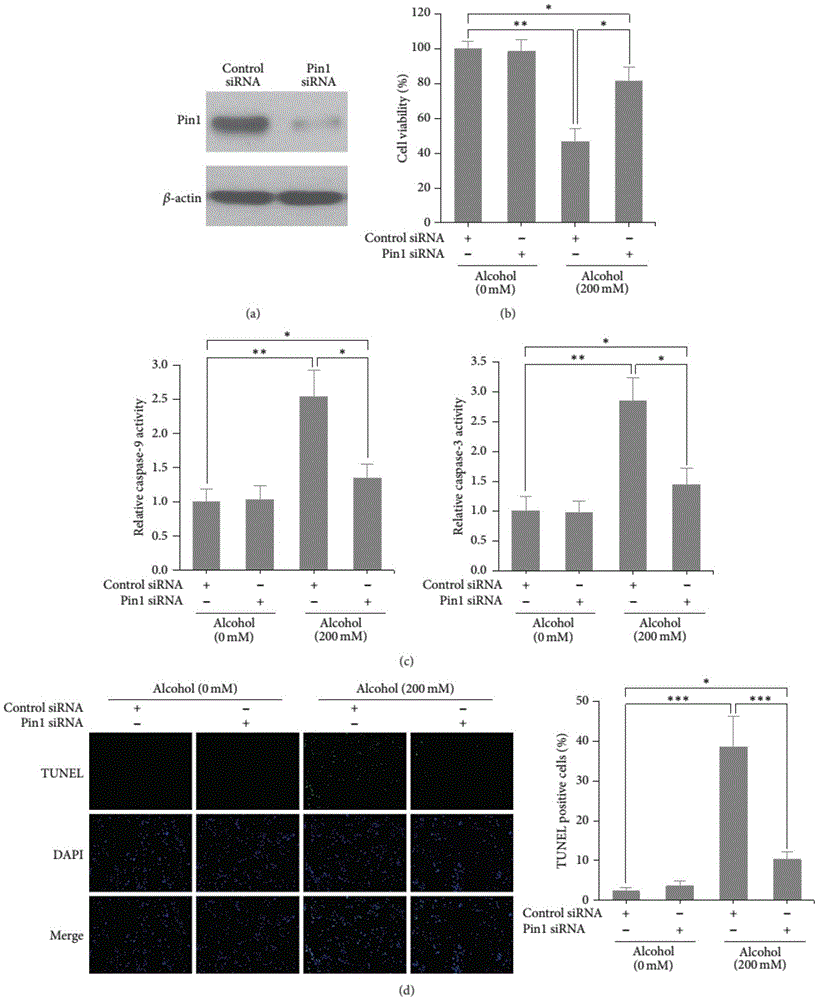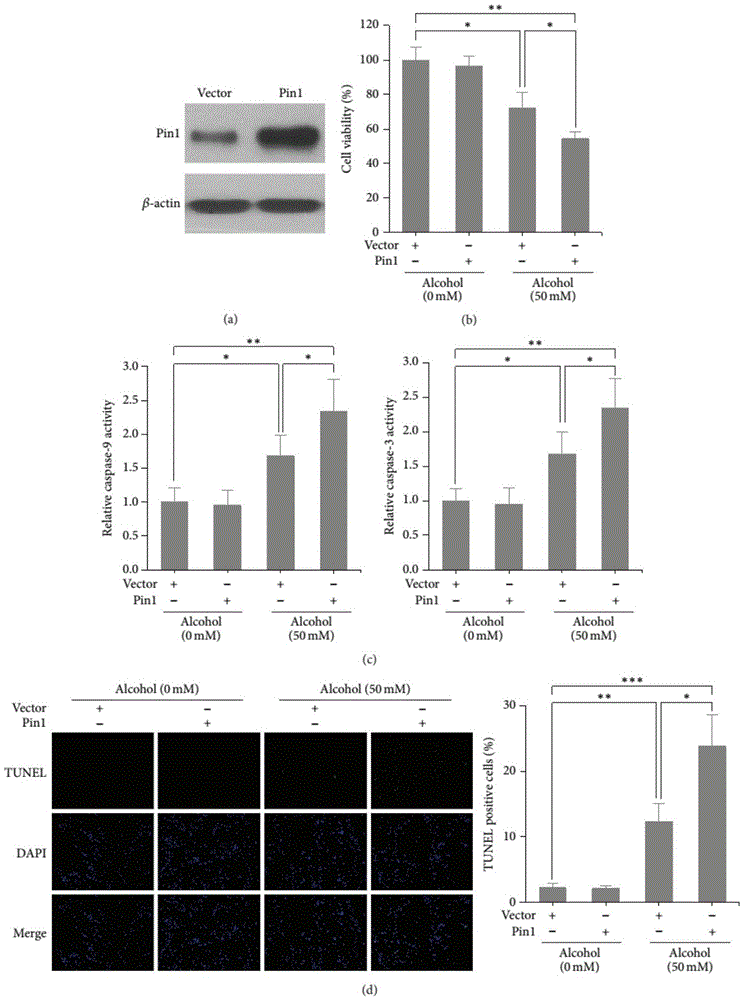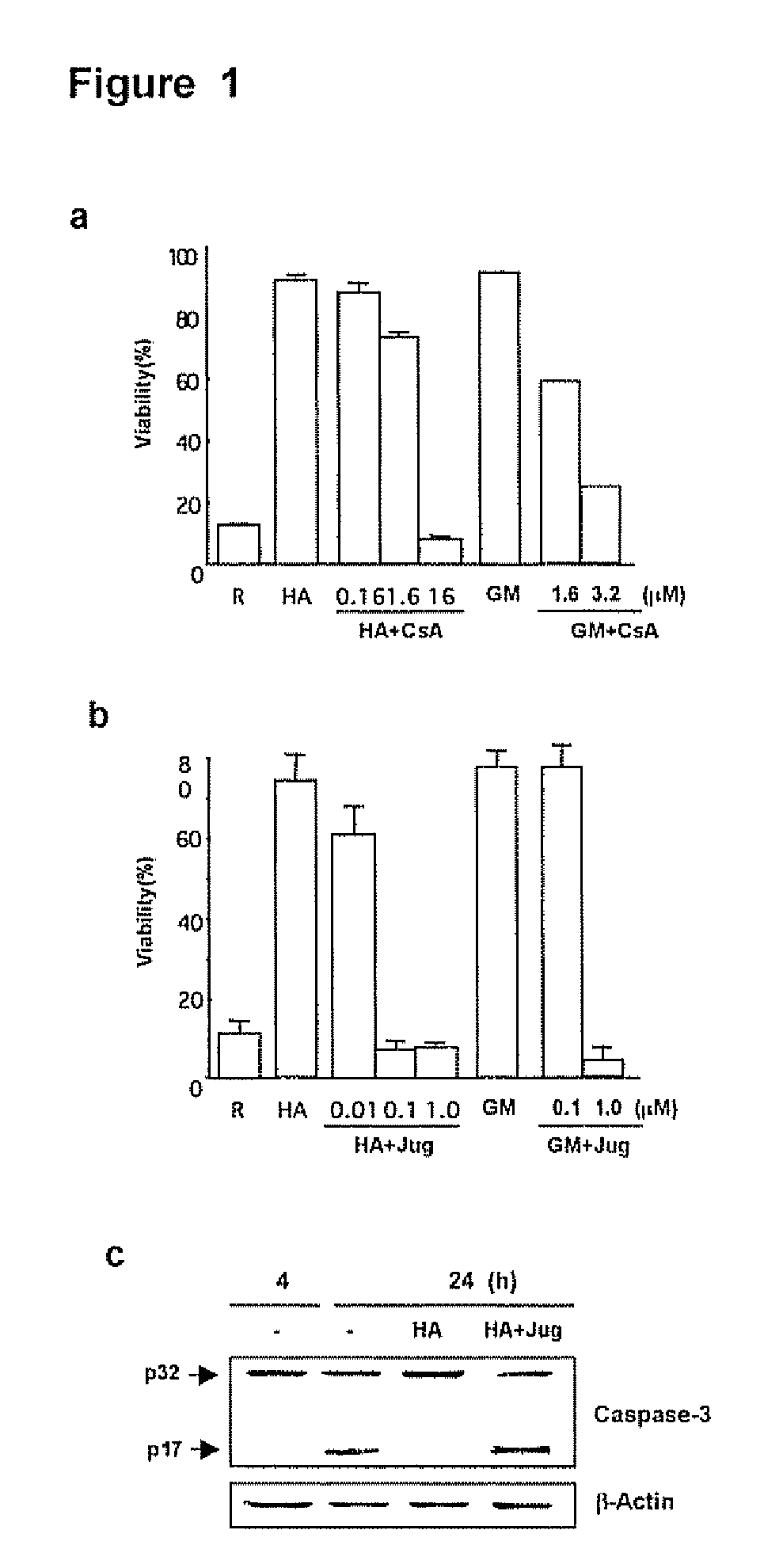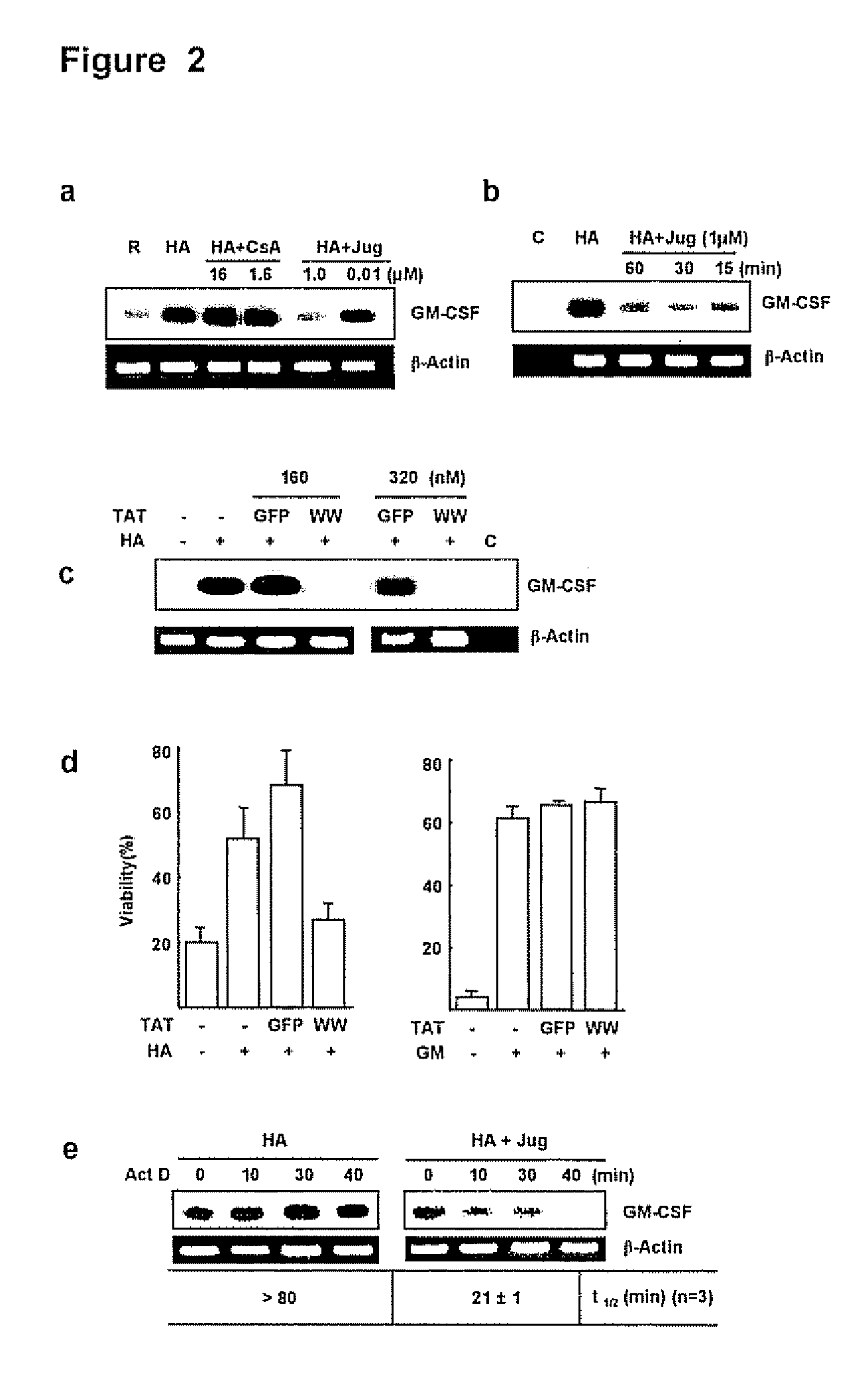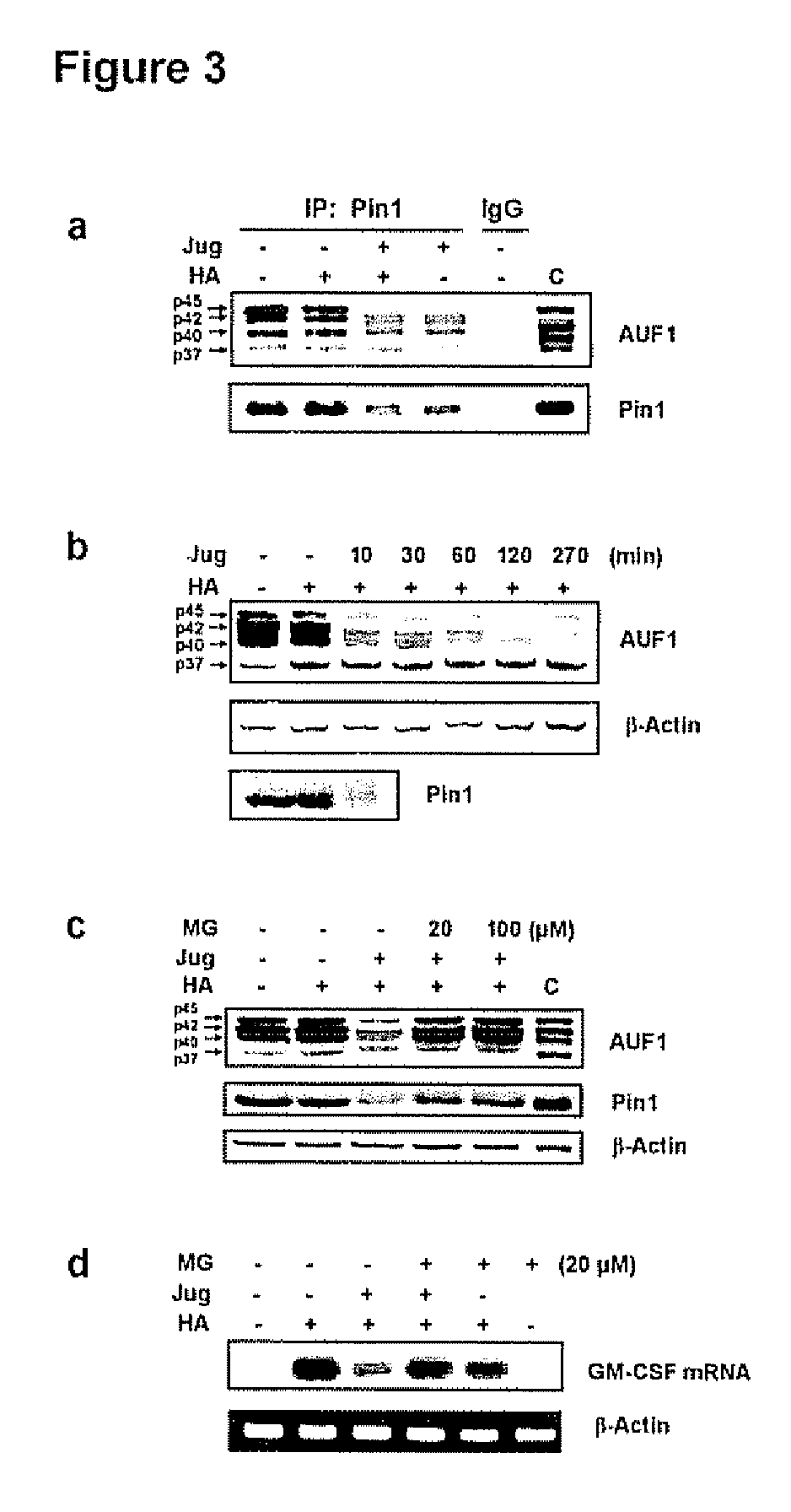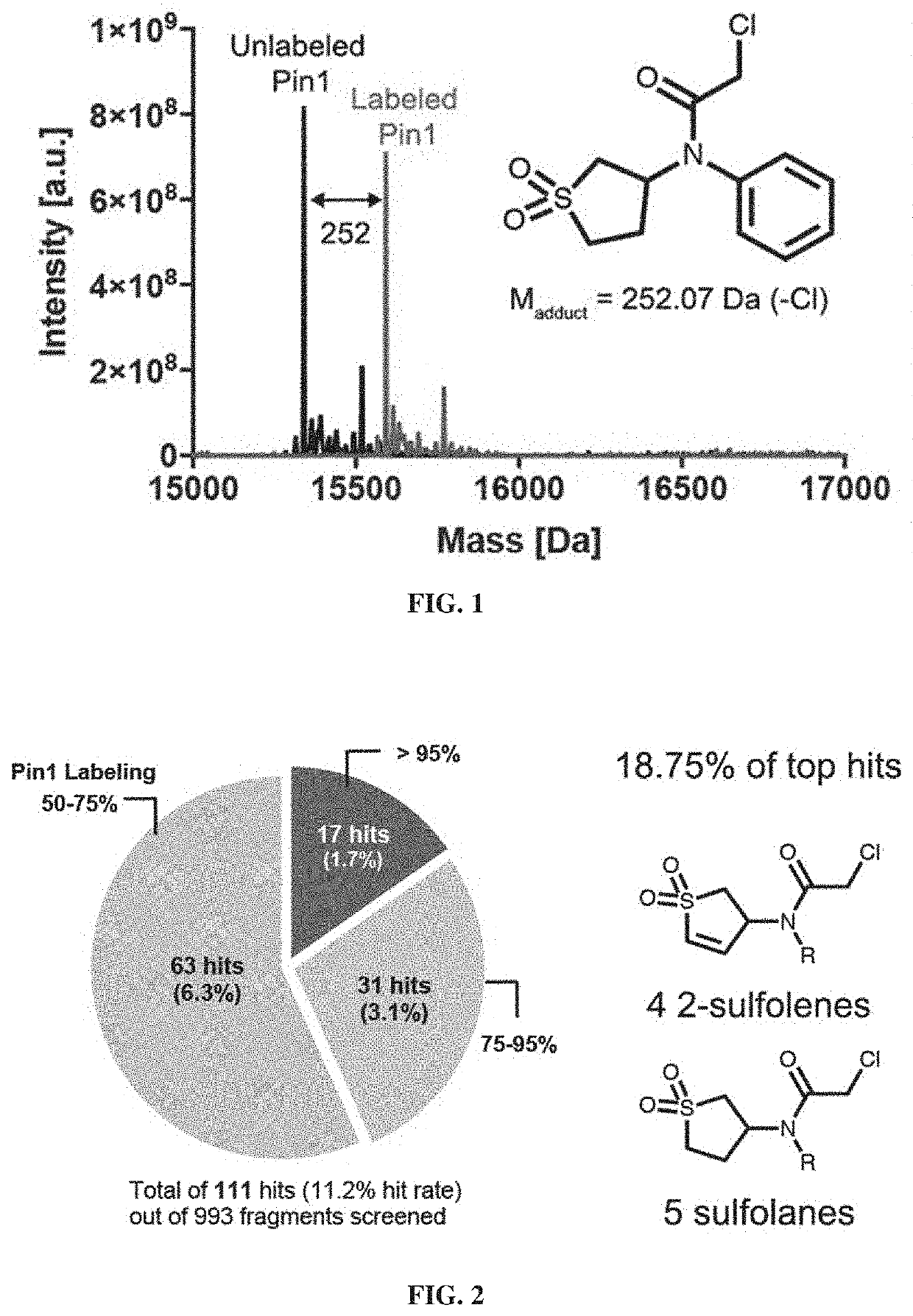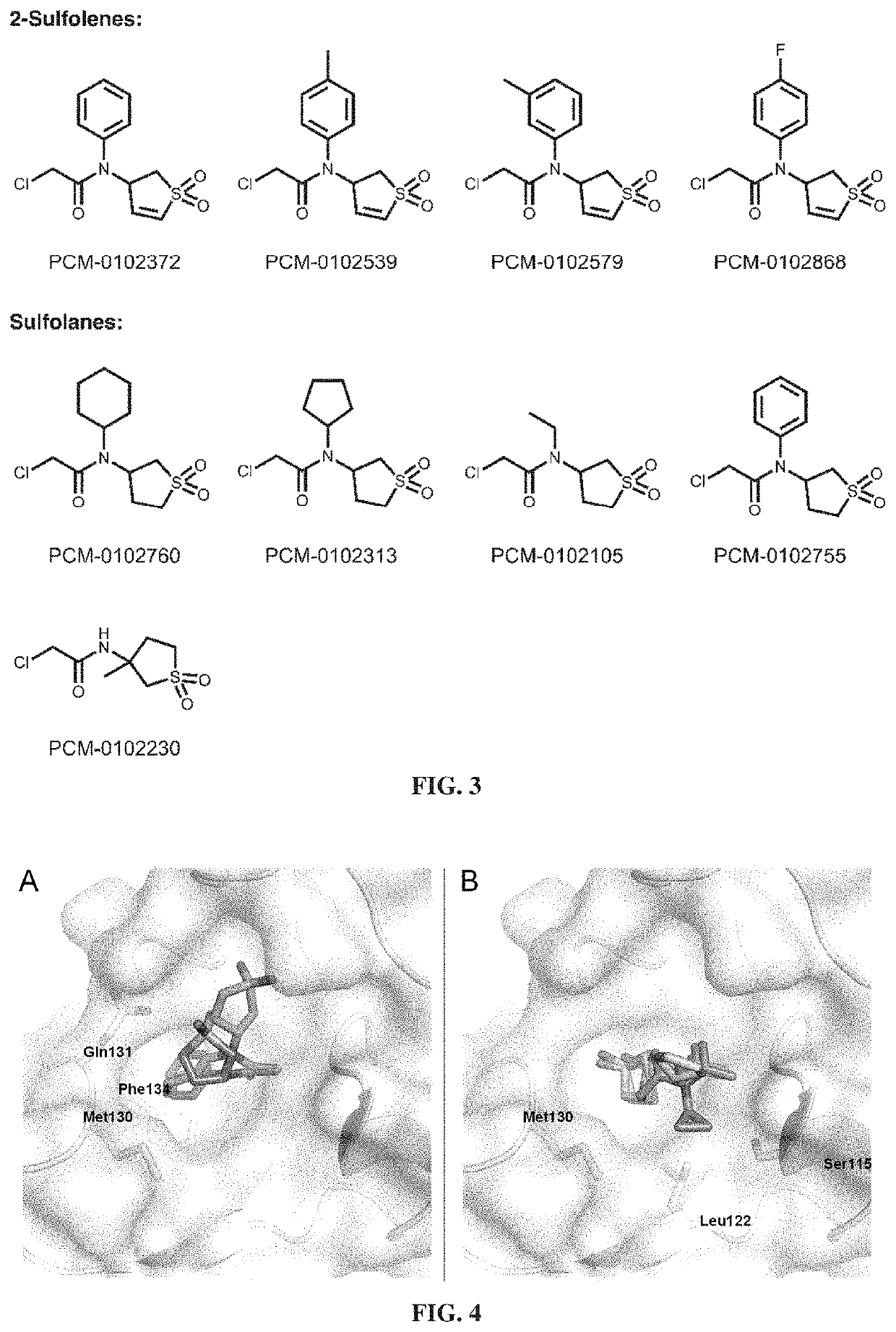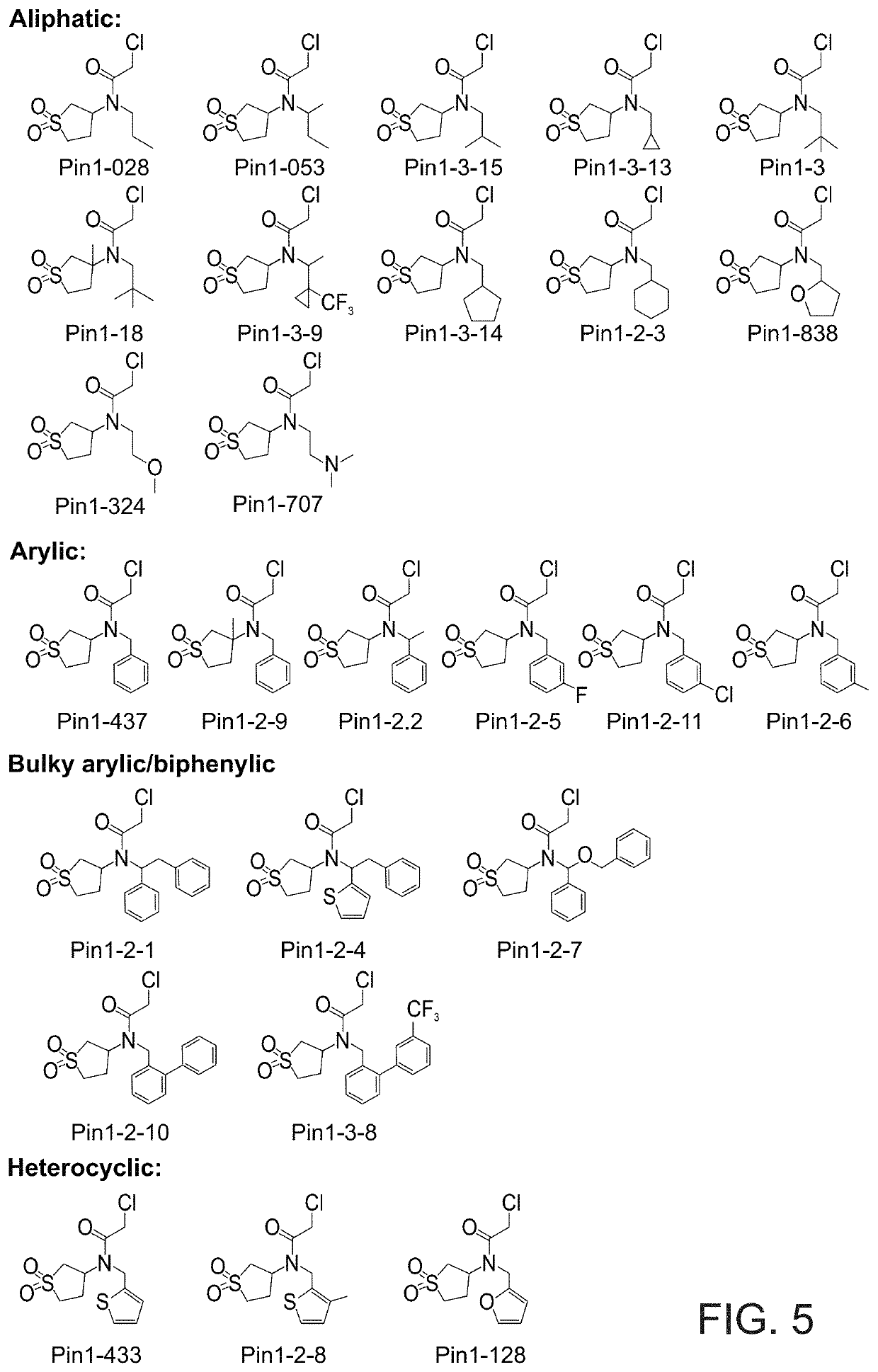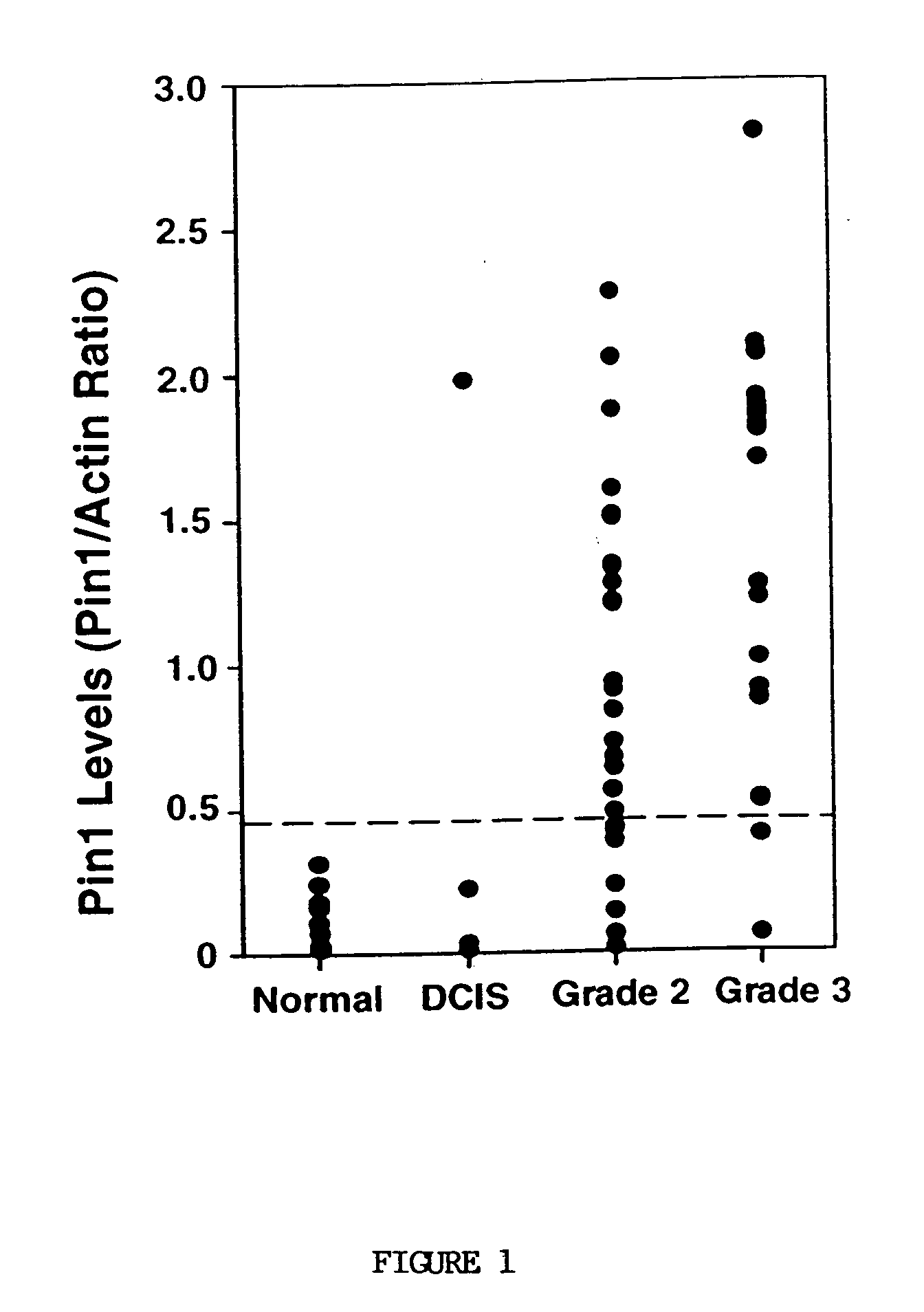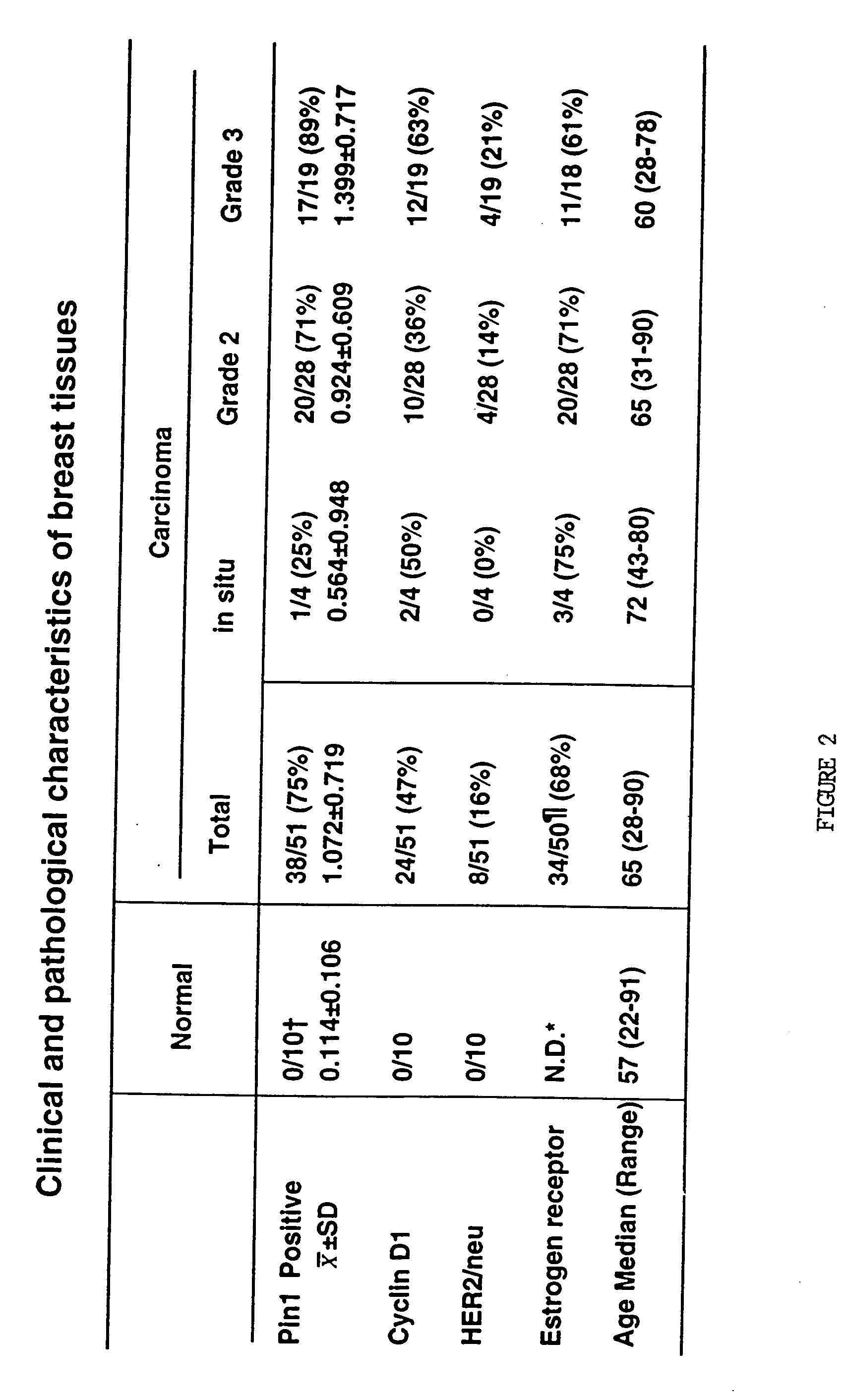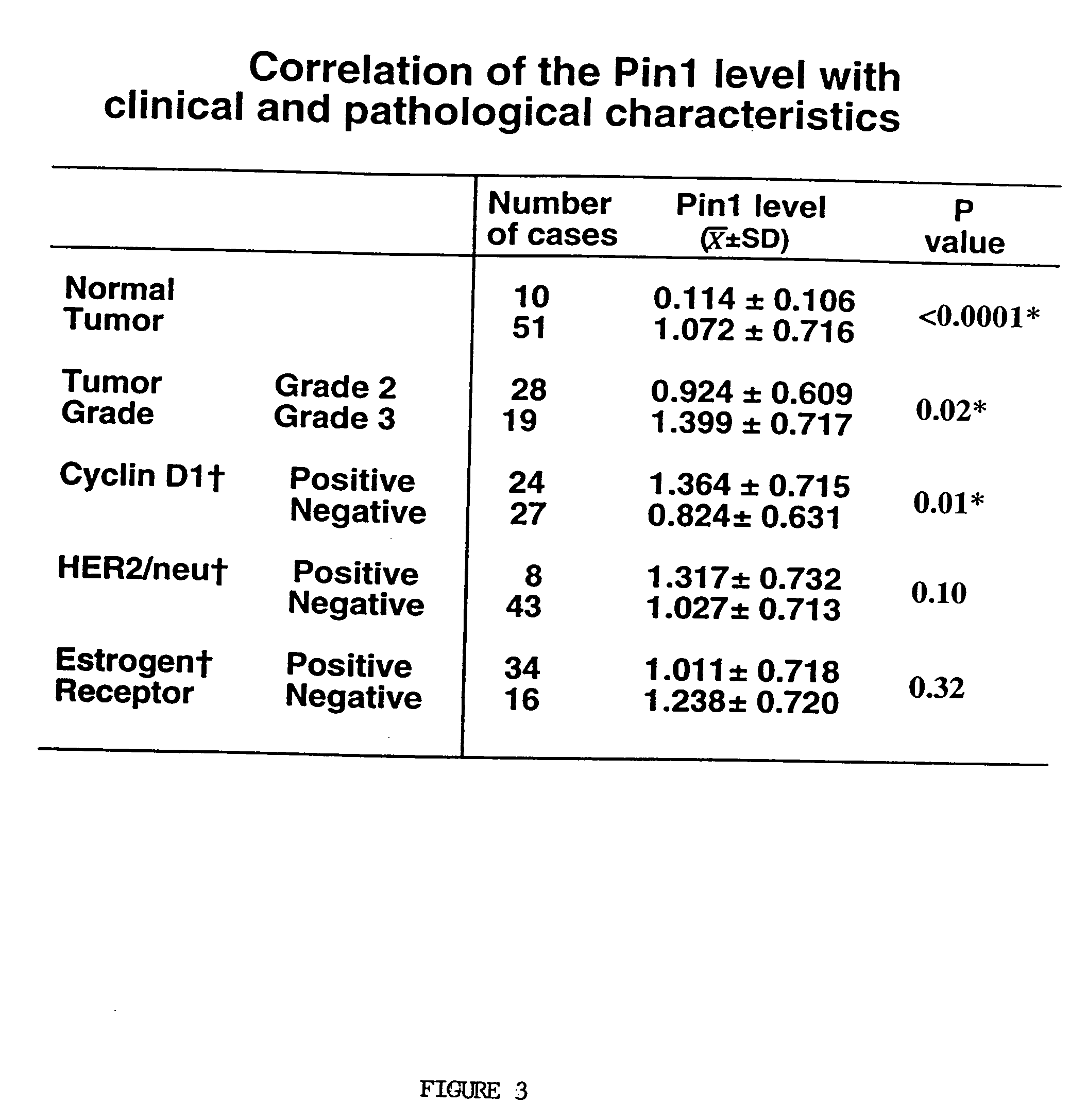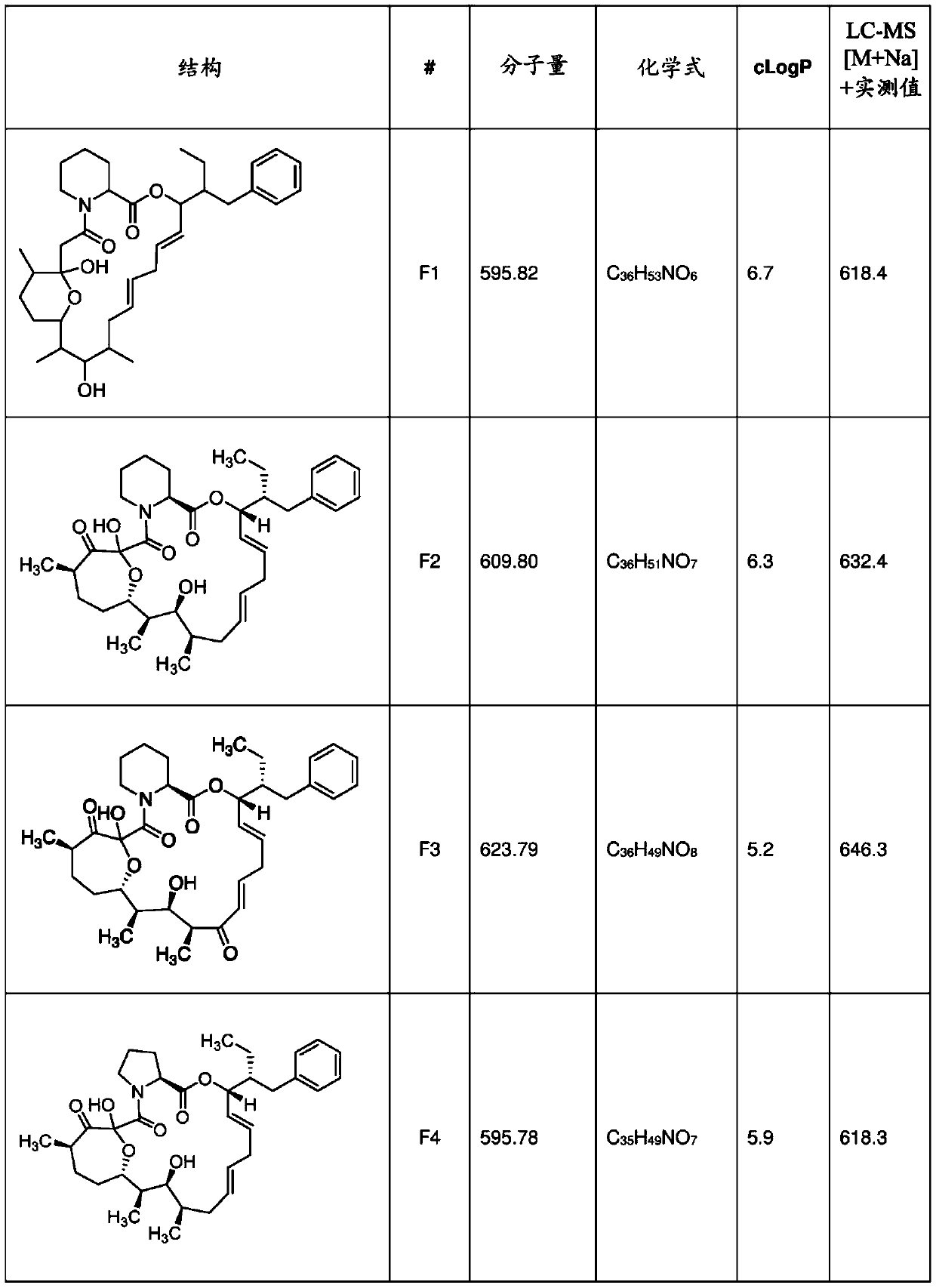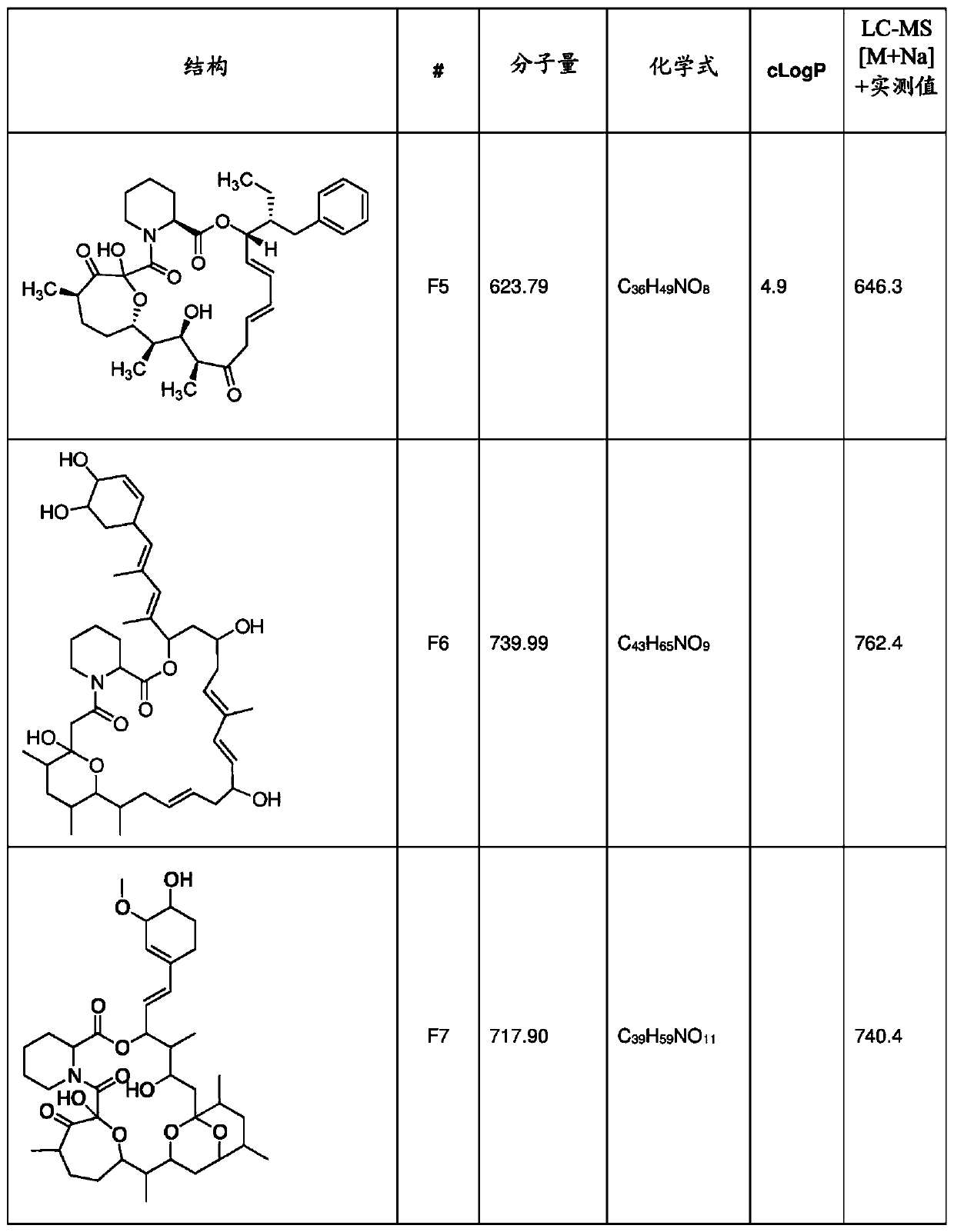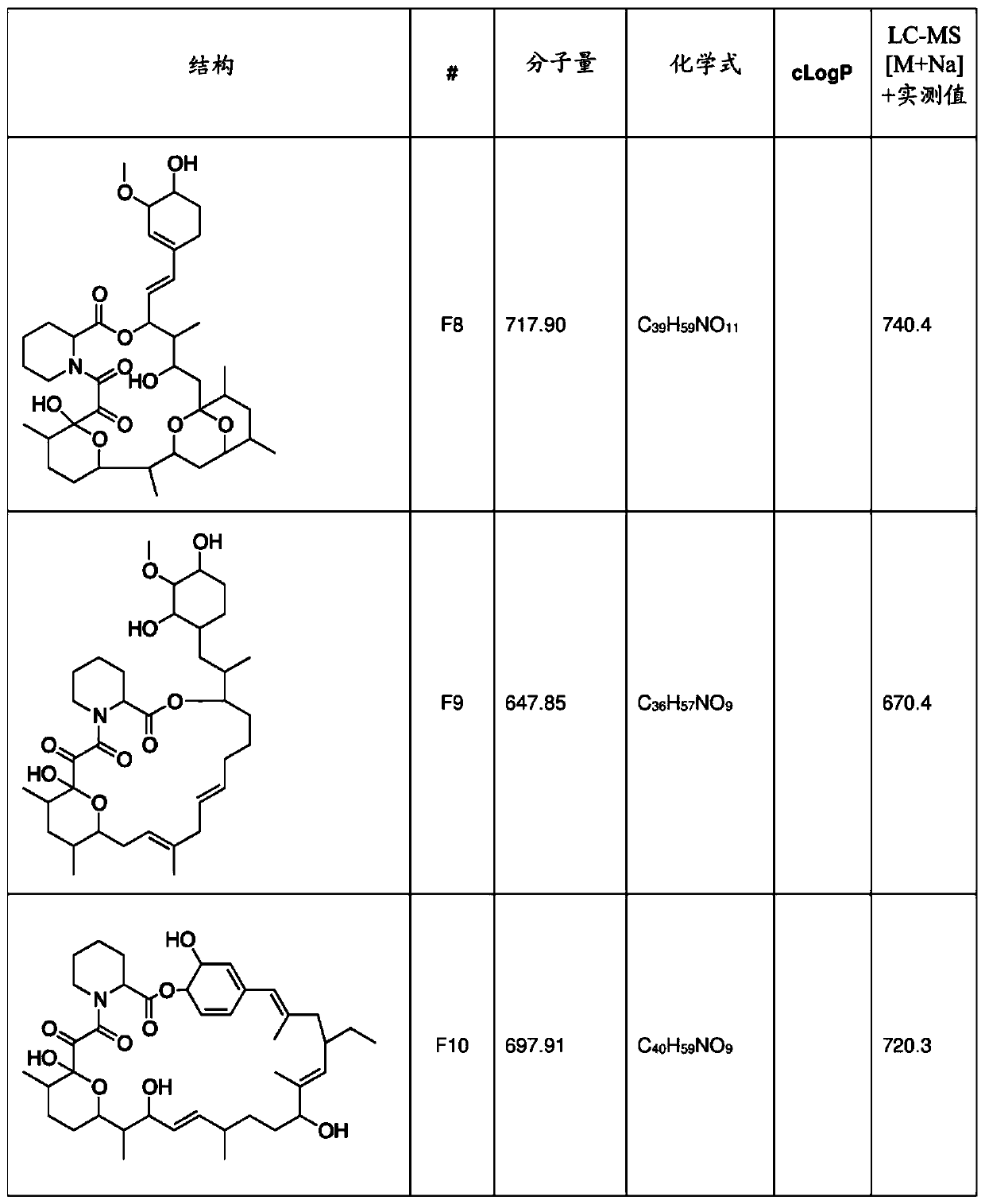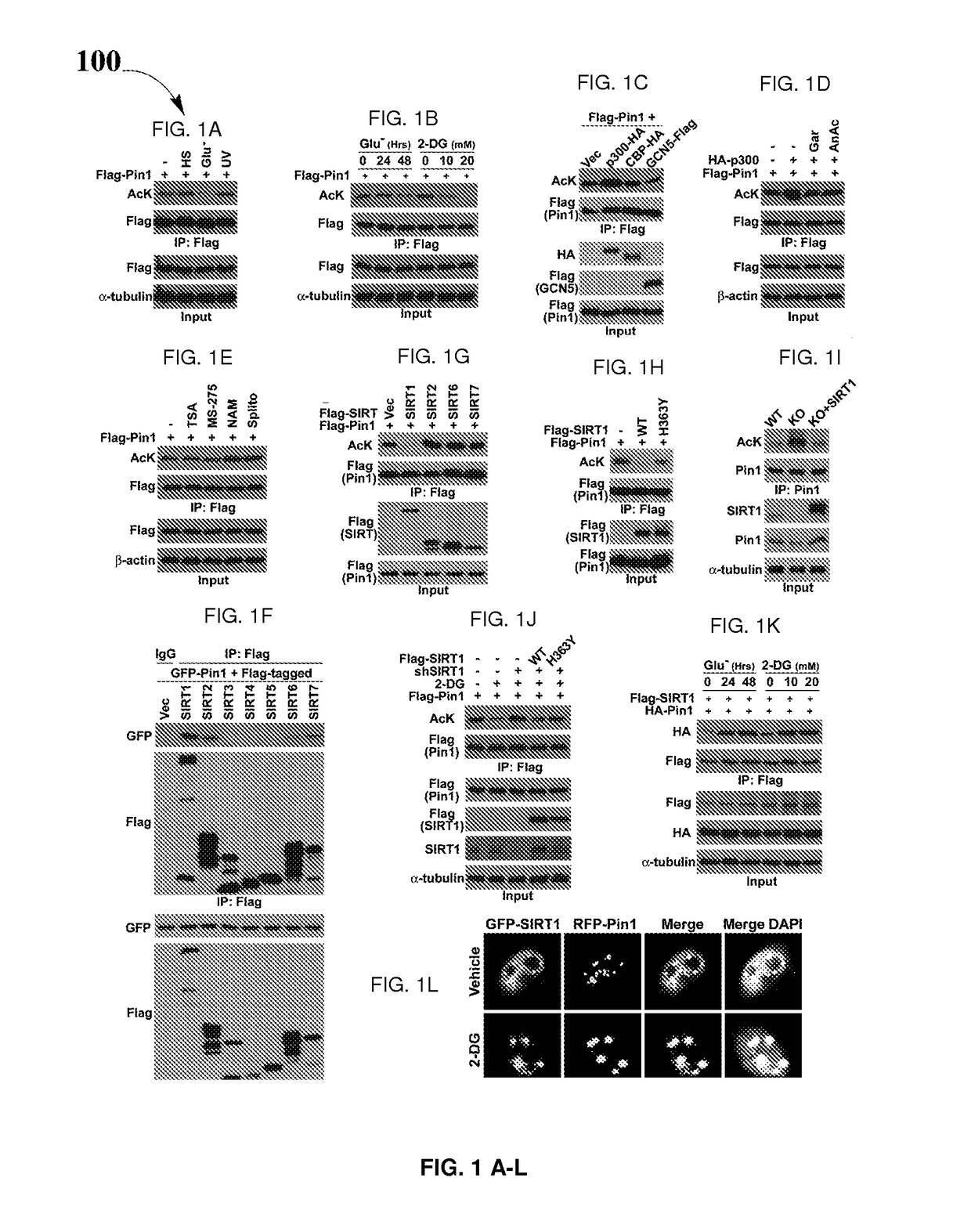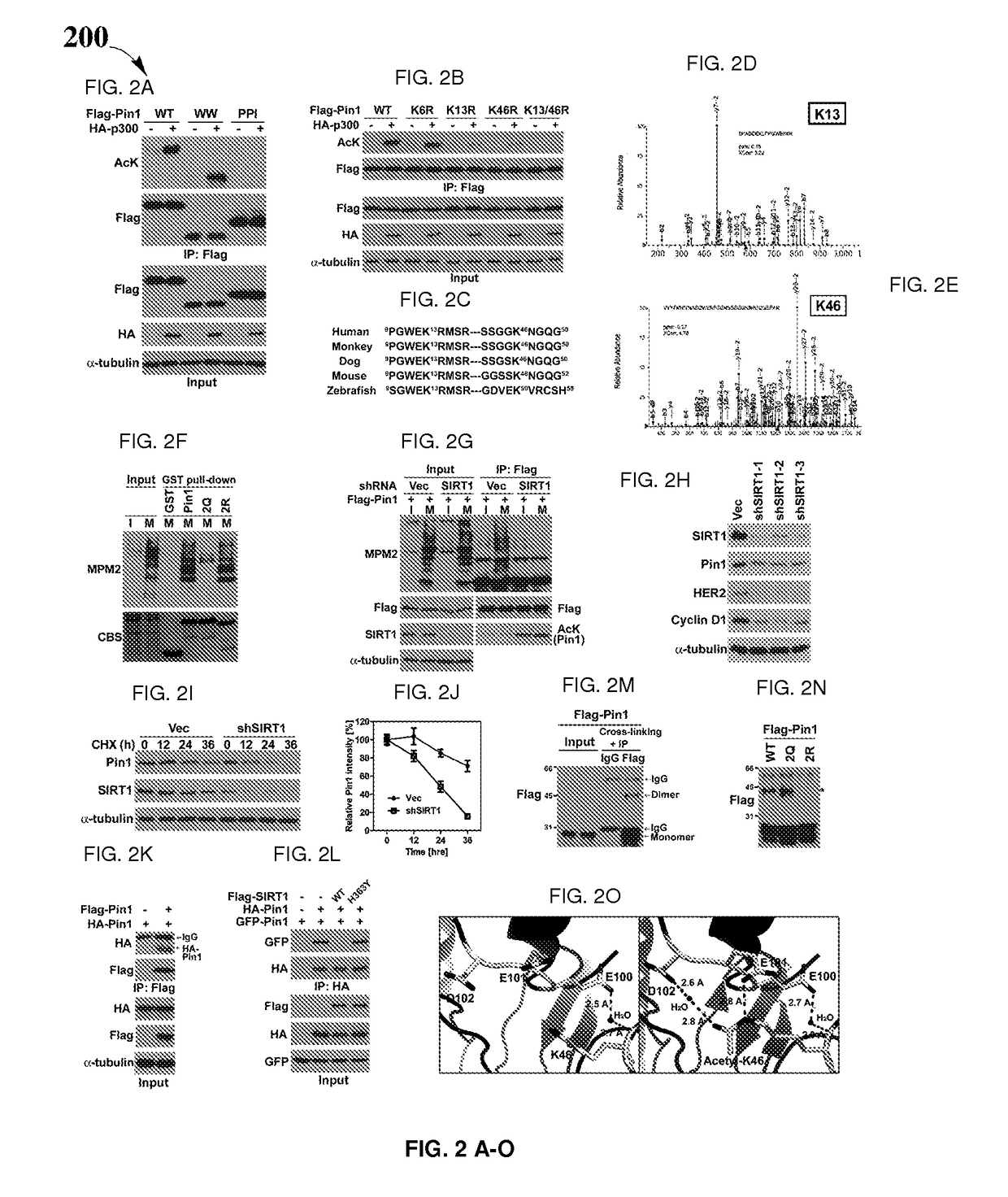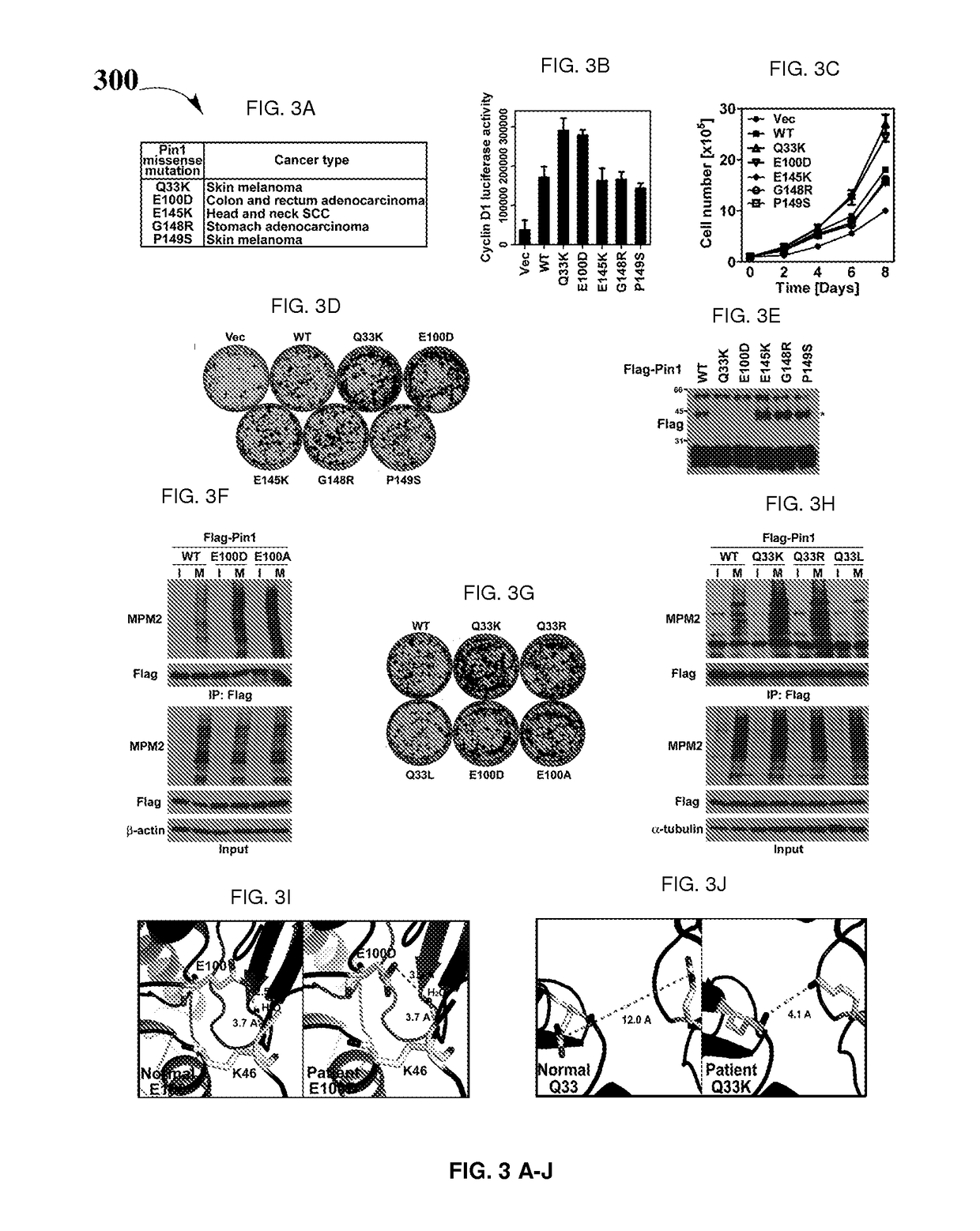Patents
Literature
47 results about "PIN1" patented technology
Efficacy Topic
Property
Owner
Technical Advancement
Application Domain
Technology Topic
Technology Field Word
Patent Country/Region
Patent Type
Patent Status
Application Year
Inventor
Peptidyl-prolyl cis-trans isomerase NIMA-interacting 1 is an enzyme that in humans is encoded by the PIN1 gene. Pin 1, or peptidyl-prolyl cis/trans isomerase (PPIase), isomerizes only phospho-Serine/Threonine-Proline motifs. The enzyme binds to a subset of proteins and thus plays a role as a post phosphorylation control in regulating protein function. Studies have shown that the deregulation of Pin1 may play a pivotal role in various diseases. Notably, the up-regulation of Pin1 is implicated in certain cancers, and the down-regulation of Pin1 is implicated in Alzheimer's disease. Inhibitors of Pin1 may have therapeutic implications for cancer and immune disorders.
Methods and compositions for the treatment of proliferative disorders
The invention features methods of treating a proliferative disorder characterized by elevated Pin1 marker levels and / or reduced Pin1 Ser71 phosphorylation in a subject by administering a retinoic acid compound. Additionally, the invention features methods of treating proliferative disorders (e.g., proliferative disorders characterized by elevated Pin1 marker levels) by administering a retinoic acid compound in combination with another anti-proliferative compound. Finally, the invention also features methods including high-throughput screens for discovering and validating Pin1 inhibitors.
Owner:BETH ISRAEL DEACONESS MEDICAL CENT INC
Novel regulatory mechanisms of NF-kappaB
InactiveUS20050147608A1Inhibiting degredation of NF-kBIncreasing nuclear accumulation and protein stabilityHydrolasesAntipyreticIsomerizationProteolysis
The instant invention pertains to the discovery of two novel regulatory mechanisms of NF-kB. The instant invention demonstrates that NF-kB is regulated by Pin1-catalyzed prolyl isomerization and ubiquitin-mediated proteolysis of p65. Accordingly, the instant invention provides methods for regulating NF-kB, and diseases and disorders associated with NF-kB. Further, the invention provides compositions capable of modulating the activity or expression of NF-kB, Pin1, and / or the proteolysis of p65.
Owner:BETH ISRAEL DEACONESS MEDICAL CENT INC
Pin1-Modulating compounds and methods of use thereof
The invention is directed to modulators, e.g., inhibitors, of Pin1 and Pin1-related proteins and the use of such modulators for treatment of Pin1 associated states, e.g., for the treatment of cancer.
Owner:PINTEX PHARMA
Pin1 as a marker for abnormal cell growth
InactiveUS20090258352A1Easy to detectRapid and sensitive natureMicrobiological testing/measurementDisease diagnosisWAS PROTEINLymphatic Spread
Methods for the use of Pin1 as a marker of abnormal cell growth are disclosed. In one embodiment, the method includes detecting a level of Pin1 to stage an abnormal cell growth, such as breast or prostate cancer. In another embodiment, the method includes evaluating the efficacy of a treatment of an abnormal cell growth, such as cancer, by monitoring the levels of Pin1. In another embodiment, the method includes evaluating the extent of metastasis of abnormal cell growth, such as cancer. The levels of Pin1 can be protein levels or nucleic acid levels.
Owner:BETH ISRAEL DEACONESS MEDICAL CENT INC
NIMA interacting proteins
InactiveUS7125677B2Inhibits mitosis promoting functionHigh activityPeptide/protein ingredientsMicrobiological testing/measurementG2 arrestDNA fragmentation
A novel class of NIMA interacting proteins (PIN), exemplified by Pin1, is provided. Pin1 induces a G2 arrest and delays NIMA-induced mitosis when overexpressed, and triggers mitotic arrest and DNA fragmentation when depleted. Methods of identifying other Pin proteins and Pin-interacting proteins and identifying compositions which affect Pin activity or expression are also provided.
Owner:SALK INST FOR BIOLOGICAL STUDIES
Methods and compositions for the treatment of proliferative disorders
The invention features methods of treating a proliferative disorder characterized by elevated Pin1 marker levels and / or reduced Pin1 Ser71 phosphorylation in a subject by administering a retinoic acid compound. Additionally, the invention features methods of treating proliferative disorders (e.g., proliferative disorders characterized by elevated Pin1 marker levels) by administering a retinoic acid compound in combination with another anti-proliferative compound. Finally, the invention also features methods including high-throughput screens for discovering and validating Pin1 inhibitors.
Owner:BETH ISRAEL DEACONESS MEDICAL CENT INC
Phosphate/sulfate ester compounds and pharmaceutical composition for inhibiting protein interacting NIMA (PIN1)
InactiveUS20050250742A1Reduction and alleviationSufficient amountOrganic active ingredientsBiocideMedicinePhosphate
Phosphate / sulfate ester compounds that modulate and / or inhibit the activity of protein interacting NIMA (PIN1), and to pharmaceutical compositions containing such compounds are described. The invention is also directed to the therapeutic or prophylactic use of such compounds and compositions, and to methods of treating disorders characterized by hypertension, inappropriate cell proliferation, infectious diseases, and neurodegenerative brain disorders, by administering effective amounts of such compounds.
Owner:PFIZER INC
Transition-state Inhibitors of Pin1, alpha-Ketoamide-containing peptidomimetics, and synthesis thereof
Novel α-ketoamide-containing peptidomimetics are provided, such as peptidomimetics containing an α-ketoamide Ser-Pro dipeptide analogue. The α-ketoamide is preferably incorporated into another molecule as a Pin1 inhibitor (such as a pentapeptide analogue Ac-Phe-Tyr-pSer-Pro-Arg-NH2).
Owner:VIRGINIA TECH INTPROP INC
Pin 1 as a marker for prostate cancer
InactiveUS7592145B2Easy diagnosisAvoid failureMicrobiological testing/measurementDepsipeptidesPsa testGrade system
Owner:PINTEON THERAPEUTICS
NIMA interacting proteins
Owner:SALK INST FOR BIOLOGICAL STUDIES
NIMA interacting proteins
InactiveUS20050027107A1Peptide/protein ingredientsMicrobiological testing/measurementG2 arrestDNA fragmentation
A novel class of NIMA interacting proteins (PIN), exemplified by Pin1, is provided. Pin1 induces a G2 arrest and delays NIMA-induced mitosis when overexpressed, and triggers mitotic arrest and DNA fragmentation when depleted. Methods of identifying other Pin proteins and Pin-interacting proteins and identifying compositions which affect Pin activity or expression are also provided.
Owner:SALK INST FOR BIOLOGICAL STUDIES
Enhanced atra-related compounds for the treatment of proliferative diseases, autoimmune diseases, and addiction conditions
ActiveUS20180064666A1Improve bindingImprove curingAnhydride/acid/halide active ingredientsHeterocyclic compound active ingredientsImmunologic disordersAutoimmune condition
The invention features all-trans retinoic acid (ATRA)-related compounds capable of associating with Pin1 and methods of treating a proliferative disorder characterized by elevated Pin1 marker levels, Pin1 degradation, and / or reduced Pin1 Ser71 phosphorylation in a subject by administering an ATRA-related compound. The invention also features methods of treating proliferative disorders, autoimmune diseases, and addiction conditions (e.g., diseases, disorders, and conditions characterized by elevated Pin1 marker levels) by administering an ATRA-related compound in combination with another therapeutic compound.
Owner:BETH ISRAEL DEACONESS MEDICAL CENT INC
18 beta-glycyrrhetinic acid derivative and application thereof
The invention relates to the technical field of medicines, in particular to an 18 beta-glycyrrhetinic acid derivative with Pin1 inhibitory activity and pharmacologically-acceptable salt thereof, a preparation method of the derivative, a pharmaceutical composition taking the derivative as an active ingredient and application of the derivative to the preparation of a Pin1 inhibitor and the preparation of a drug for treating and / or preventing various cancers. The derivative shown in a general formula I or the pharmacologically-acceptable salt thereof has the following structure, wherein R, X, Y and n are stated in the claims and the descriptions.
Owner:SHENYANG PHARMA UNIVERSITY
Enhanced atra-related compounds derived from structure-activity relationships and modeling for inhibiting pin1
InactiveUS20170112792A1Increasing and decreasing sizeIncreasing and decreasing and lengthCompound screeningOrganic chemistryDiseasePhosphorylation
The invention features all-trans retinoic acid (ATRA)-related compounds capable of associating with Pin1 and methods of identifying the same. The invention also provides methods of treating a condition selected from the group consisting of a proliferative disorder, an autoimmune disease, and an addiction condition characterized by elevated Pin1 marker levels, Pin1 degradation, and / or reduced Pin1 Ser71 phosphorylation in a subject by administering a retinoic acid compound. Additionally, the invention features methods of treating proliferative disorders, autoimmune diseases, and addiction conditions (e.g., diseases, disorders, and conditions characterized by elevated Pin1 marker levels) by administering a retinoic acid compound in combination with another therapeutic compound. The invention also features a co-crystal including Pin1 and a retinoic acid compound. Finally, the invention also provides methods of developing and identifying enhanced Pin1-targeted ATRA-related compounds based on the newly defined unique binding pockets in the Pin1 active site revealed from the co-crystal structure, structure-activity relationship, and structural modeling.
Owner:BETH ISRAEL DEACONESS MEDICAL CENT INC
Application of Pin1 Family Genes of Auxin Export Carrier in Maize and Sorghum Breeding
InactiveCN102296084AExcellent low phosphorus and drought toleranceFermentationVector-based foreign material introductionGermplasmPlant traits
The invention discloses the use of auxin efflux carrier PINFORMED1 (PIN1) family genes in breeding corn and broomcorn. In the invention, different PIN1 family genes are cloned from different higher plants and bonded with different promoters respectively to form fusion genes; and the recombinant genes are transferred into corn and broomcorn cells by transgenic technology; and thus, transgenic plants and progeny of the transgenic plants are obtained, engineering plants of which the plant traits are changed with the gradient change in the concentration of auxin can be selected, and new varieties with application prospects in corn and broomcorn breeding can be created.
Owner:SHANDONG UNIV
ATRA for modulating Pin1 activity and stability
ActiveUS9968579B2Modulate activityShort half-lifeHydroxy compound active ingredientsImmunological disordersDiseaseCancer cell
Owner:BETH ISRAEL DEACONESS MEDICAL CENT INC
Methods and compositions for the inhibition of pin1
The invention features compositions and methods for inhibiting the Pin1 protein, and the treatment of disorders characterized by elevated Pin1 levels.
Owner:UNITED STATES OF AMERICA +1
Crystal structure of WW domains and methods of use thereof
A WW domain crystal structure of Pin1 is provided. In addition, methods of using the crystal structure and atomic coordinates for the development of WW domain binding agents is also provided. Also provided are computer programs on computer readable medium for use in developing WW domain binding agents.
Owner:SALK INST FOR BIOLOGICAL STUDIES
Molecular method for association detection of risk of nasopharyngeal carcinoma
The invention discloses a molecular method for association detection of the risk of nasopharyngeal carcinoma, belonging to the field of detection technology for nasopharyngeal carcinoma. The molecular method for association detection of the risks of nasopharyngeal carcinoma comprises the following steps: extraction of genomic DNAs in blood; treatment with PCR technology; and analysis of restriction fragment length polymorphisms. Discovery results in the invention show that two polymorphic sites, i.e., -842G>C(rs2233678) and -667C>T(rs2233679), of a Pin1 gene are associated with the risk of nasopharyngeal carcinoma in Guangdong Province, China; the Pin1 gene may be an important biomarker for the risk of nasopharyngeal carcinoma; and a Pin1 promoter can regulate the activity of a transcription factor AP2alpha.
Owner:GUANGDONG MEDICAL UNIV
Novel biodegradable controlled-release preparation of Pin1 inhibitor ATRA, and preparing method and application thereof
InactiveCN107929263AGood biocompatibilityHigh encapsulation efficiencyHydroxy compound active ingredientsAntipyreticDiseaseMicrosphere
The invention discloses a novel biodegradable controlled-release preparation of a Pin1 inhibitor ATRA, and a preparing method and an application thereof; the preparing method includes the following steps: a, dissolving ATRA and PLLA in an organic solvent, and preparing ATRA-loaded PLLA microspheres under a condition of supercritical carbon dioxide; and b, with liver cancer as a model, researchingthe anti-cancer efficacy and action mechanism of the ATRA-PLLA microspheres in vivo and in vitro. Under mild conditions, the ATRA-PLLA microspheres are obtained by the one-step method; the microspheres have uniform particle size, high encapsulation efficiency and high yield, can effectively slowly release ATRA, and have a main pharmacokinetic index better than that of commercialized ATRA slow-release tablets (the slow-release tablets can be used only for animals). The ATRA-PLLA microspheres have good biocompatibility and can selectively enhance the ATRA inhibition on tumor growth, and have theanti-cancer efficacy better than that of the ATRA slow-release tablets. ATRA plays an anti-cancer role by degrading Pin1 and inhibiting multiple Pin1-regulated oncogenic signaling pathways and cell cycle progression. The ATRA-PLLA microspheres are expected to be used in clinic treatment of Pin1-related diseases such as tumor, inflammation, arthritis, lupus erythematosus and asthma.
Owner:FUJIAN MEDICAL UNIV +2
Atra for modulating pin1 activity and stability
ActiveUS20170202799A1Modulate activityShort half-lifeHydroxy compound active ingredientsImmunological disordersDiseaseCancer cell
The present disclosure describes how all-retinoic acid (ATRA) binds and inhibits Pin1 activity and induces degradation of the activated Pin1 monomer selectively in cancer cells. Identification of the binding mechanism of ATRA with Pin1 confirm ATRA binding specificity to Pin1 residues in the PPIase active site, thus demonstrating that drug-induced Pin1 ablation has potent anticancer activity, such as in acute promyelocytic leukemia (APL), by inducing PML-RARa degradation, as well as against other types of cancer and diseases that are associated with Pin1 overexpression, such as aggressive triple negative breast cancer, lupus, asthma, cocaine addiction, among others, due to their unique ability to simultaneously block numerous cancer-driving pathways, with relatively lower toxicity. The present disclosure also provides a rationale for developing sustained released ATRA-containing formulations. ATRA-containing formulations may be used in combinations with other existing therapies including chemotherapy or molecularly targeted drugs and other standard of care.
Owner:BETH ISRAEL DEACONESS MEDICAL CENT INC
Blockade of Pin1 Prevents Cytokine Production by Activated Immune Cells
InactiveUS20060264359A1Inhibiting and reducing pathological effectAmeliorating acuteBiocideSenses disorderDiseaseApoptosis
The invention provides pharmaceutical compositions and methods of treating immunological disorders. The invention also provides pharmaceutical compositions and methods of inducing eosinophil apoptosis, and methods for treating eosinophil-associated disorders comprising inducing eosinophil apoptosis in an individual in need thereof.
Owner:WISCONSIN ALUMNI RES FOUND
Biomarkers for Pin1-associated disorders
ActiveUS10351914B2Easy diagnosisHigh activityHydroxy compound active ingredientsAerosol deliveryDiseasePharmacogenetics
Biomarkers and driver mutations for diagnosis and prognosis of Pin 1-associated diseases are disclosed. In one embodiment, the methods for diagnosis of Pin 1-associated diseases may include detecting the level of Pin1 to stage abnormal cell growth, such as breast or prostate cancer. In another embodiment, the methods include evaluating the efficacy of a treatment of abnormal cell growth, such as cancer, by monitoring the levels of Pin1. In another embodiment, the methods include using driver mutations to determine the pharmacogenetics of abnormal cell growth, such as cancer. In the present disclosure, elevated active monomeric Pin1 levels may be detected by Pin1 biomarkers, which may include Pin1 Q33K or E100D driver mutations, Pin1 protein or transcript overexpression, dephosphorylation of Pin1 on Ser71, dephosphorylation of S16, phosphorylation of S65, phosphorylation of S138, deacetylation of Pin1 on K13 and deacetylation of K46, and / or desumoylation of Pin1 on K6 and desumolation of K63, among others.
Owner:BETH ISRAEL DEACONESS MEDICAL CENT INC
Methods and compositions for the inhibition of Pin1
Owner:UNITED STATES OF AMERICA +1
Application of Pin1 siRNA in preparation of targeted medicine for treating alcoholic cardiomyopathy
The invention discloses application of Pin1 siRNA in preparation of a targeted medicine for treating the alcoholic cardiomyopathy, and belongs to the field of prevention and treatment of the alcoholic cardiomyopathy. It is proved through experiments that Pin1 takes participate in the cardiac muscle cell apoptosis process caused by alcohol and high-dosage alcohol stimulates the expression and activity of Pin1. By means of Pin1 gene knock-out mediated by Pin1 siRNA, cardiac muscle cell apoptosis mediated by alcohol can be remarkably restrained; due to the over-expression of Pin1, the number of apoptosis muscle cells is further increased. It is further proved that Pin1 promotes mitochondria oxidative stress mediated by alcohol and restrains the expression of endothelial nitric oxide synthase. Through Pin1 gene knock-out mediated by Pin1 siRNA, mitochondria oxidative stress mediated by alcohol, the production decrease of NO and the level decrease of eNOS can be remarkably restrained, and therefore the occurrence and development process of the alcoholic cardiomyopathy is further delayed. An effective technological means is put forward to prevent and treat the alcoholic cardiomyopathy.
Owner:HARBIN MEDICAL UNIVERSITY
Blockade of Pin1 prevents cytokine production by activated immune cells
The invention provides pharmaceutical compositions and methods of treating immunological disorders. The invention also provides pharmaceutical compositions and methods of inducing eosinophil apoptosis, and methods for treating eosinophil-associated disorders comprising inducing eosinophil apoptosis in an individual in need thereof.
Owner:WISCONSIN ALUMNI RES FOUND
Modulators of pin1 activity and uses thereof
PendingUS20210332024A1Reduced responseOrganic active ingredientsOrganic chemistryChemical compoundMoiety
Disclosed herein are compounds comprising an electrophilic moiety and rigid moiety for use in modulating an activity of Pin1. The rigid moiety comprises at least one functional group that is capable of forming hydrogen bonds with hydrogen atoms, wherein the electrophilic moiety and the rigid moiety are arranged such that the electrophilic moiety is capable of covalently binding to the Cys113 residue of Pin1, and the rigid moiety is capable of forming hydrogen bonds with the Gln131 and His 157 residues of Pin1. Further disclosed are novel compounds having Formula Id:wherein the dashed line, W, X, Y, Z, Ra-Rc, R1, R2, L1, L2 and n are as defined herein, and libraries comprising such compounds. Further disclosed are methods of identifying a compound capable of modulating an activity of Pin1, by screening a library of compounds.
Owner:DANA FARBER CANCER INST INC +2
Pin1 as a marker for abnormal cell growth
InactiveUS20050186643A1Easy to detectRapid and sensitive natureDisease diagnosisWAS PROTEINLymphatic Spread
Methods for the use of Pin1 as a marker of abnormal cell growth are disclosed. In one embodiment, the method includes detecting a level of Pin1 to stage an abnormal cell growth, such as breast or prostate cancer. In another embodiment, the method includes evaluating the efficacy of a treatment of an abnormal cell growth, such as cancer, by monitoring the levels of Pin1. In another embodiment, the method includes evaluating the extent of metastasis of abnormal cell growth, such as cancer. The levels of Pin1 can be protein levels or nucleic acid levels.
Owner:LU KUN PING +2
Compounds that participate in cooperative binding and uses thereof
The invention features compounds (e.g., macrocyclic compounds) capable of modulating biological processes, for example through binding to a presenter protein (e.g., a member of the FKBP family, a member of the cyclophilin family, or PIN1) and a target protein (e.g., a eukaryotic target protein such as a mammalian target protein or a fungal target protein or a prokaryotic target protein such as a bacterial target protein). These compounds bind endogenous intracellular presenter proteins, such as the FKBPs or cyclophilins, and the resulting binary complexes selectively bind and modulate the activity of intracellular target proteins. Formation of a tripartite complex among the presenter protein, the compound, and the target protein is driven by both protein-compound and protein-protein interactions, and both are required for modulation of the targeted protein's activity.
Owner:REVOLUTION MEDICINES INC
Biomarkers for pin1-associated disorders
ActiveUS20170204466A1Easy diagnosisHigh activityHydroxy compound active ingredientsAerosol deliveryDiseasePharmacogenetics
Biomarkers and driver mutations for diagnosis and prognosis of Pin 1-associated diseases are disclosed. In one embodiment, the methods for diagnosis of Pin 1-associated diseases may include detecting the level of Pin1 to stage abnormal cell growth, such as breast or prostate cancer. In another embodiment, the methods include evaluating the efficacy of a treatment of abnormal cell growth, such as cancer, by monitoring the levels of Pin1. In another embodiment, the methods include using driver mutations to determine the pharmacogenetics of abnormal cell growth, such as cancer. In the present disclosure, elevated active monomeric Pin1 levels may be detected by Pin1 biomarkers, which may include Pin1 Q33K or E100D driver mutations, Pin1 protein or transcript overexpression, dephosphorylation of Pin1 on Ser71, dephosphorylation of S16, phosphorylation of S65, phosphorylation of S138, deacetylation of Pin1 on K13 and deacetylation of K46, and / or desumoylation of Pin1 on K6 and desumolation of K63, among others.
Owner:BETH ISRAEL DEACONESS MEDICAL CENT INC
Features
- R&D
- Intellectual Property
- Life Sciences
- Materials
- Tech Scout
Why Patsnap Eureka
- Unparalleled Data Quality
- Higher Quality Content
- 60% Fewer Hallucinations
Social media
Patsnap Eureka Blog
Learn More Browse by: Latest US Patents, China's latest patents, Technical Efficacy Thesaurus, Application Domain, Technology Topic, Popular Technical Reports.
© 2025 PatSnap. All rights reserved.Legal|Privacy policy|Modern Slavery Act Transparency Statement|Sitemap|About US| Contact US: help@patsnap.com
